The Empty House
My name is Tanya, I'm 64, and three months ago I moved into a smaller house after my husband, George, passed away. You know how they say downsizing is supposed to feel liberating? Well, that's what I kept telling myself as I packed up forty years of memories into cardboard boxes labeled with my daughter's neat handwriting. The new place seemed perfect on paper—two cozy bedrooms (one for me, one for when the grandkids visit), a tidy kitchen with just enough counter space for my stand mixer, and a little fenced yard where I planned to plant tulips come spring. It should have been my fresh start. But from the very first night, something felt... off. Not in a dramatic, horror-movie kind of way. Just a persistent uneasiness that settled into my bones along with the silence. The house creaked differently than the one George and I had shared. The shadows pooled deeper in the corners. And sometimes, just as I was drifting off to sleep, I could swear I heard movement downstairs. I told myself it was just adjustment pains—learning to live alone after four decades of marriage. I'd never been the anxious type before, but suddenly I was double-checking locks and sleeping with the hallway light on like some nervous teenager after watching a scary movie. What I didn't know then was that houses can hold secrets, and mine was about to reveal something I never expected.
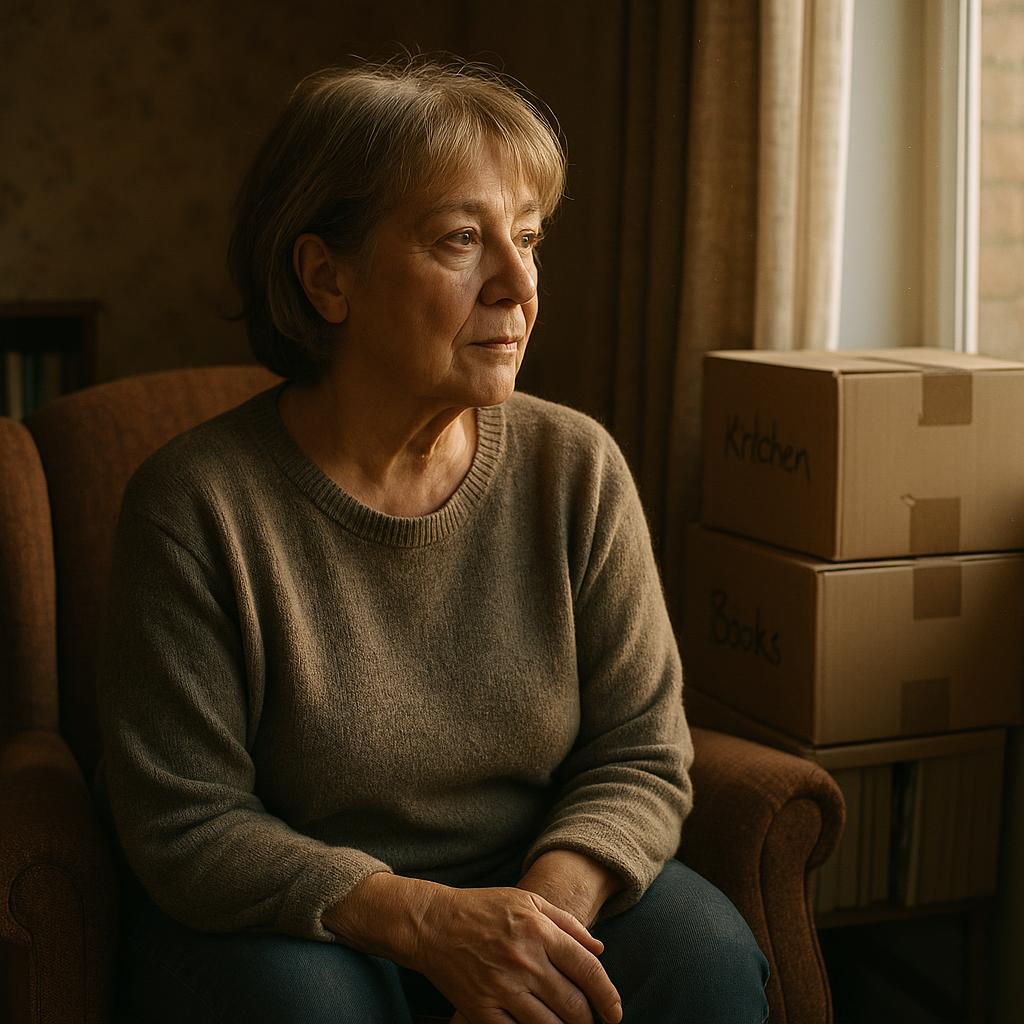 Image by RM AI
Image by RM AI
Shadows and Creaks
I tried to laugh it off when my new neighbor Carl asked how I was settling in. 'Oh, just fine!' I'd say, not mentioning how I kept George's old golf club propped against my nightstand. Just in case. The truth was, every night brought a new symphony of unfamiliar sounds. The refrigerator's hum was too loud. The furnace kicked on with a startling thunk that jolted me awake. And those footsteps... I'd lie perfectly still, holding my breath, straining to hear if they were real or just my imagination playing tricks. You know how your mind can wander in those twilight moments between awake and asleep. I'd catch myself creating explanations—maybe it was just the house settling, or the wind rattling something outside. But deep down, I knew it wasn't that simple. I started leaving more lights on, not just the hallway one. My electric bill would be through the roof, but honestly? Worth every penny for even a sliver of comfort. Sometimes I'd talk to George out loud, as if he could hear me. 'You'd tell me I'm being silly, wouldn't you?' I'd say to the empty room. The silence that followed hurt more than any strange noise ever could. One night, after particularly loud creaking from downstairs, I actually called my daughter at 2 AM. She answered, groggy but concerned, and stayed on the phone until I fell asleep. I felt ridiculous the next morning—a grown woman, a grandmother of four, afraid of the dark like a child. But that feeling of being watched, of not being alone when I knew I was... it wouldn't go away. And then came the night that proved I wasn't imagining things after all.
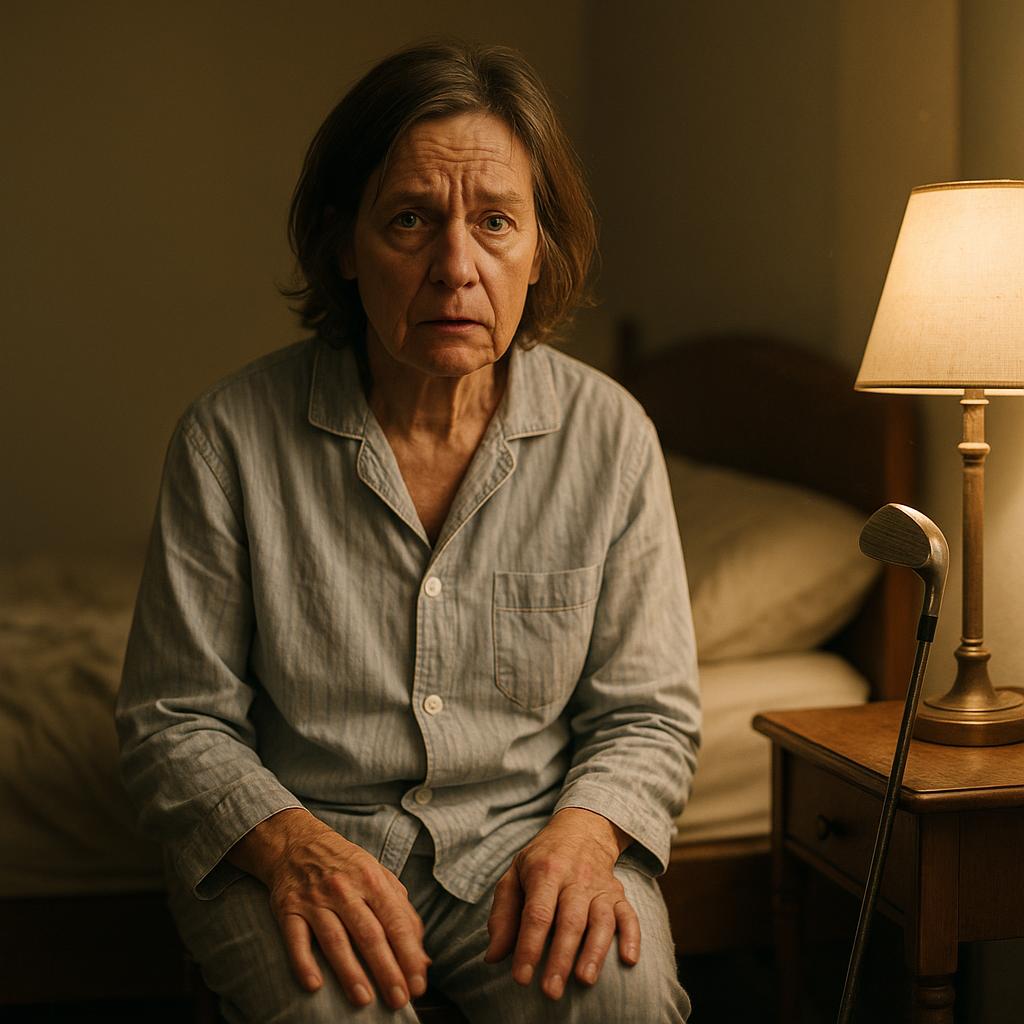 Image by RM AI
Image by RM AI
The Neighbor
Carl was a godsend in those first lonely weeks. A retired firefighter with kind eyes and hands that looked like they'd seen their share of hard work, he'd been the first neighbor to welcome me with a basket of homemade blueberry muffins. 'Baking keeps me busy,' he'd explained with a sheepish smile. 'My wife taught me before she passed.' That simple admission of his own loss made me feel less alone somehow. He lived just across the street in a tidy blue ranch house with wind chimes that sang on breezy afternoons. At 72, he was still spry enough to climb up and fix my loose gutter without breaking a sweat. 'Been doing my own repairs for fifty years,' he'd called down to me. 'No sense paying someone for what these old hands can still manage.' When he'd ask how I was settling in, I'd force a bright smile and say things like, 'Oh, just getting used to the new creaks and groans!' or 'Still figuring out where everything belongs!' What I didn't tell him was how I'd taken to sleeping with George's old Callaway 5-iron propped against my nightstand, or how I'd wake up at every little sound, heart pounding like I'd run a marathon. I didn't want to be that woman—the frightened widow who jumps at shadows. But something told me Carl saw right through my brave face. The way he'd linger a moment too long after dropping off tomatoes from his garden, eyes scanning my face with quiet concern. I had no idea then that Carl would soon become more than just a friendly neighbor—he'd become my lifeline on the night everything changed.
 Image by RM AI
Image by RM AI
Midnight Call
A week after moving in, I was finally starting to establish a routine—warm milk before bed, my favorite mystery novel on the nightstand, and George's golf club within arm's reach. Just in case. That night, I'd actually managed to doze off when the shrill ring of my phone jolted me awake. The digital clock on my bedside table glowed 12:17 AM in angry red numbers. My heart leapt into my throat—late-night calls are never good news when you have grandchildren. I fumbled for the phone, my hands trembling. "Hello?" I answered, already imagining hospital waiting rooms and tearful phone calls to my daughter. But it was Carl's voice that came through, low and urgent in a way that made my skin prickle. "Tanya, I just wanted to check—are you in the kitchen?" he asked. The question was so unexpected that for a moment I couldn't process it. "The kitchen?" I sat up, suddenly wide awake. "No, I've been in bed for hours." There was a pause—the kind that stretches like taffy, sweet with anticipation but sticky with dread. "I saw a light moving in there," he finally said. "I thought maybe it was you." Every hair on my arms stood up as if electrified. My mouth went desert-dry. "Carl," I whispered, "I swear it's not me." The silence that followed was broken only by the sound of my own heartbeat thundering in my ears. And then, faintly, from downstairs—the unmistakable creak of a floorboard.
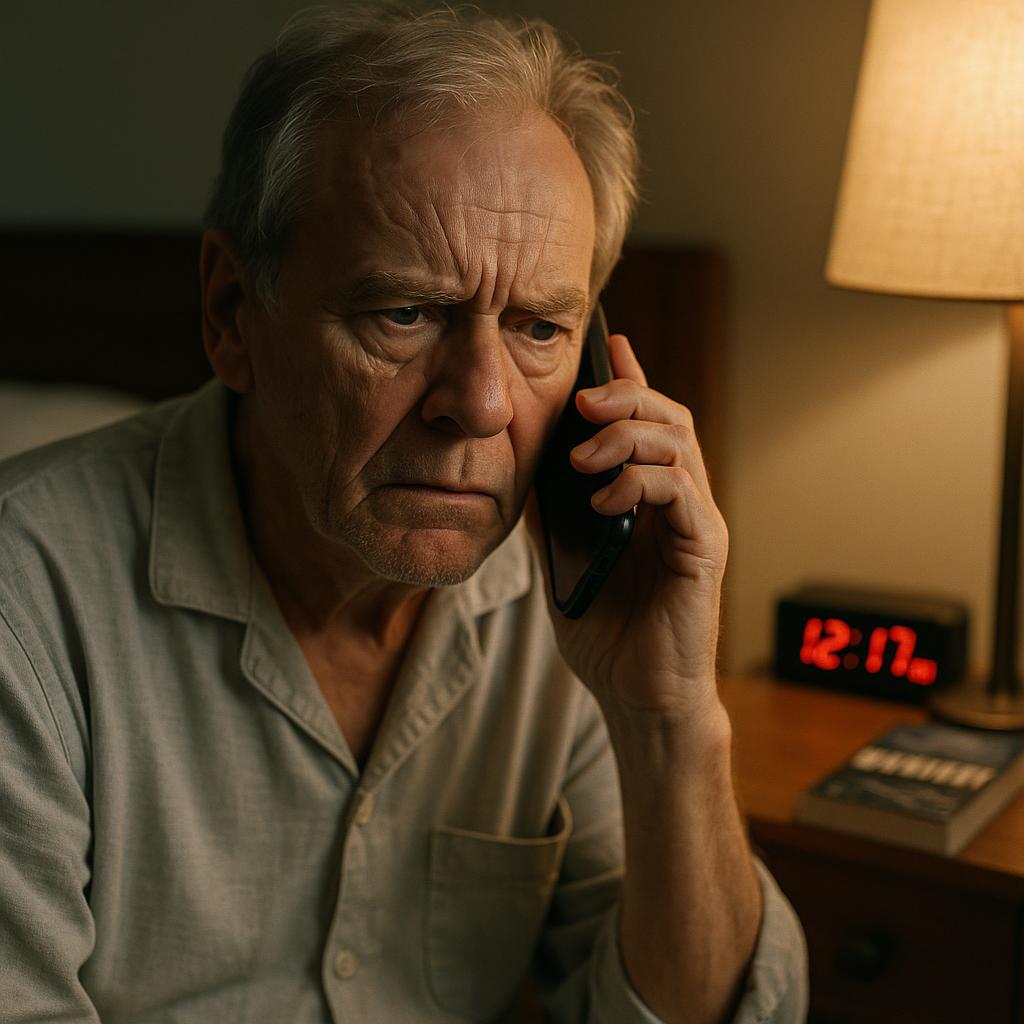 Image by RM AI
Image by RM AI
The Search
"Lock your door," Carl commanded, his voice leaving no room for debate. "I'm coming over." I scrambled out of bed, my fingers fumbling with the lock on my bedroom door. Thank goodness I'd given Carl a spare key when I visited my sister last week. Those few minutes waiting for him felt like hours, each second stretching as I strained to hear any movement downstairs. When the front door finally opened, I nearly collapsed with relief. "Tanya?" Carl called softly, his footsteps careful but purposeful on the hardwood. I crept down to meet him, George's golf club still clutched in my white-knuckled grip. Carl had brought a flashlight—a serious one, the kind firefighters use. "Stay behind me," he whispered, and I nodded, suddenly grateful for his decades of running toward danger instead of away from it. Together, we moved through each room like a strange midnight search party. Kitchen—empty. Living room—nothing disturbed. Spare bedroom, bathroom, even the tiny laundry room—all clear. No footprints, no open windows, not even a light left on that could explain what Carl had seen. We ended up back in the kitchen, both of us slightly breathless. Carl ran his hand through his silver hair, looking genuinely perplexed. "Maybe it was just headlights reflecting through the window," he offered, but I could tell he didn't believe it. His eyes kept scanning the corners of the room, like he expected something to materialize from the shadows. What bothered me most wasn't what we found—it was what we didn't find. Because something had been here. I was sure of it. And somehow, that was more terrifying than actually confronting an intruder.
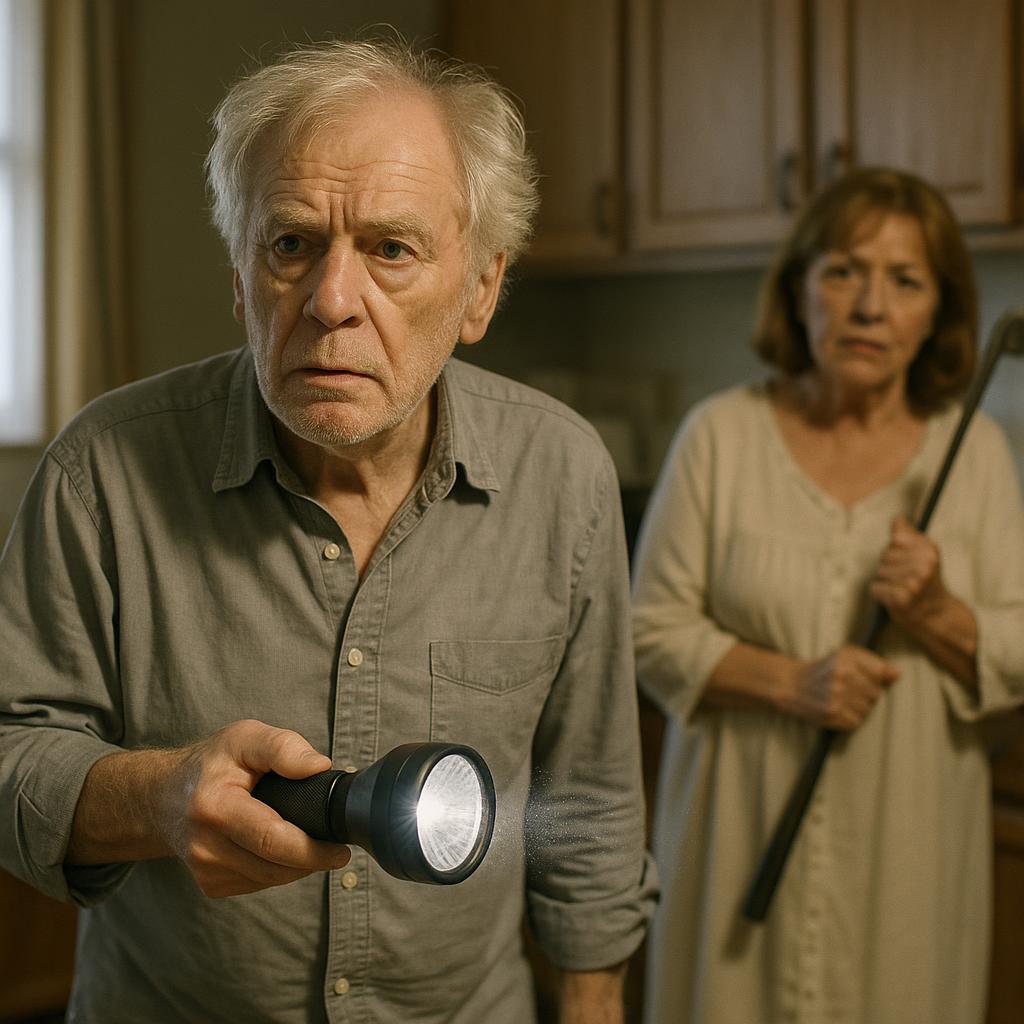 Image by RM AI
Image by RM AI
Reflections
After Carl left, I sat at my kitchen table until dawn, a cold cup of chamomile tea forgotten between my trembling hands. I wanted to believe his explanation about headlights, but the way his eyes had darted to every corner told me he wasn't convinced either. You know that feeling when you're trying to talk yourself out of being afraid, but your body just won't listen? That was me—exhausted but wide awake, jumping at every tick of the grandfather clock in the hallway. I even found myself staring at my own reflection in the darkened window, half-expecting to see someone else staring back. When the first gray light of morning finally crept through the blinds, I felt almost delirious with relief. Isn't it funny how darkness magnifies our fears? In the harsh light of day, I felt silly for being so frightened. I made a fresh pot of coffee and tried to laugh it off—just an old woman with an overactive imagination and a neighbor who'd been watching too many crime shows. But as I rinsed my mug in the sink, I noticed something that made my blood run cold: the dish towel I always hung on the oven handle was now neatly folded on the counter. I never fold my dish towels. Never. And I certainly hadn't done it last night. Someone—or something—had been in my kitchen after all.
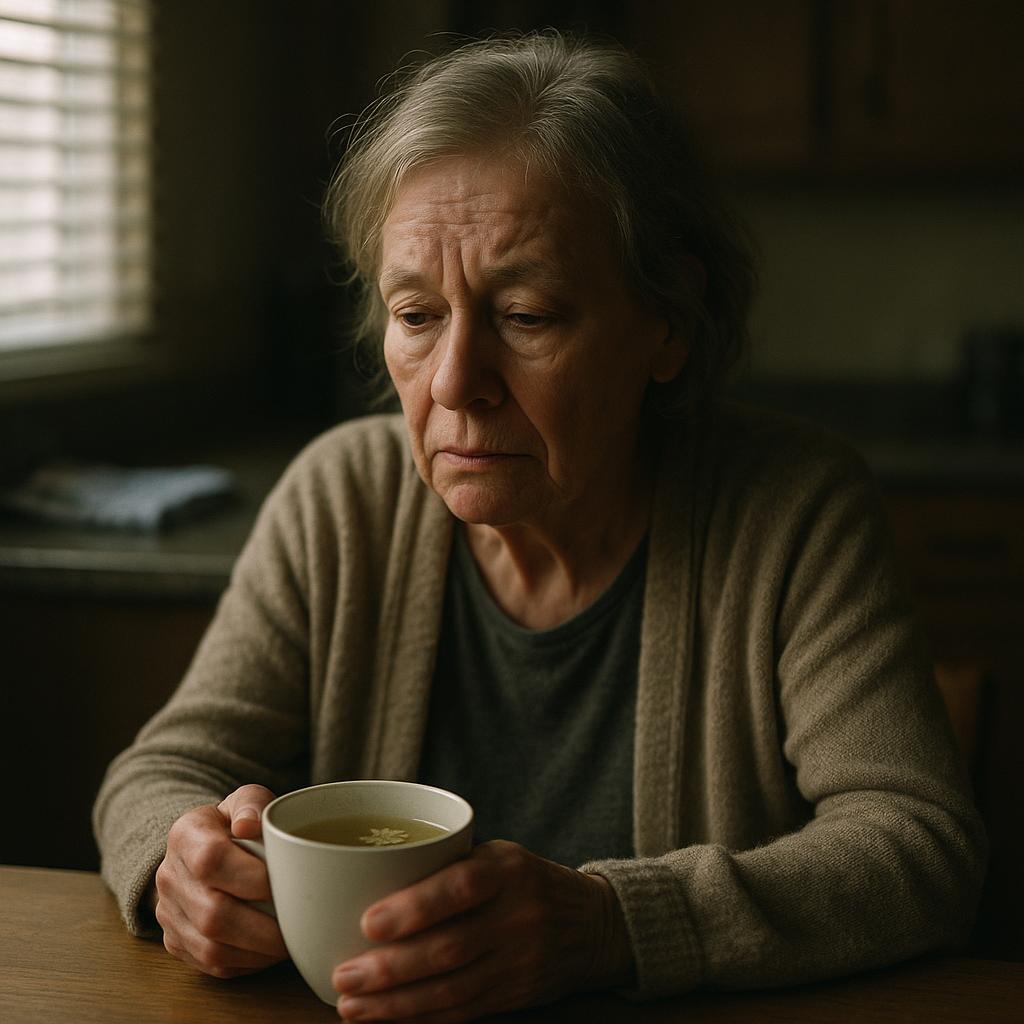 Image by RM AI
Image by RM AI
Quiet Days
For a few nights after Carl's midnight visit, the house stayed mercifully quiet. No mysterious lights, no unexplained sounds—just the normal creaks of an aging home settling into its foundation. I tried to establish some semblance of normalcy, forcing myself into a routine that might trick my mind into feeling at home. Morning walks around the neighborhood (always waving to Carl when I passed his house), afternoons spent tackling the mountain of boxes still waiting to be unpacked, evenings working on a 1,000-piece puzzle of the Grand Canyon that George and I had started before his heart attack. I hung his favorite painting—a watercolor of the lake where we used to vacation—above the fireplace and arranged our wedding photo on the mantel. 'See, George?' I whispered to the empty room. 'I'm making it work.' My daughter called every night at 8:30 sharp, her voice a lifeline to the outside world. 'You sound better, Mom,' she said on Thursday. 'More like yourself.' I didn't tell her I still slept with all the lights on, or that I'd downloaded a white noise app to drown out the sounds of the house at night. I didn't mention how I'd catch myself staring at that dish towel—now pinned to the refrigerator with magnets so it couldn't mysteriously move again. I was just starting to believe Carl's headlight theory when, three nights later, my phone rang just after midnight again. The moment I saw his name on the screen, my momentary peace shattered like fine china dropped on hardwood.
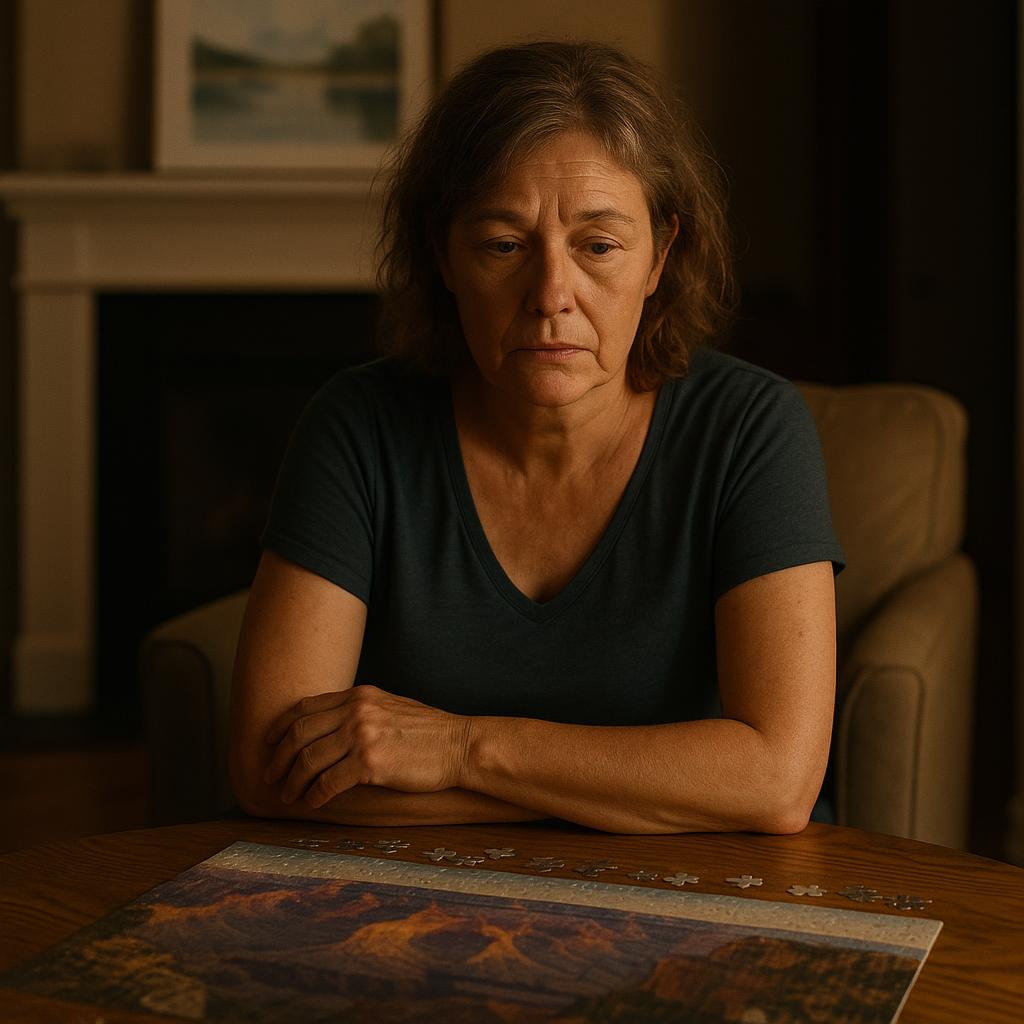 Image by RM AI
Image by RM AI
The Lights Return
I clutched my phone so tightly my knuckles turned white. 'What do you mean, lights?' I whispered, though I knew exactly what Carl meant. My free hand instinctively reached for George's golf club. 'Same as before,' Carl replied, his voice tense. 'Moving around your kitchen like someone's holding a flashlight.' This time, instead of freezing in terror, something inside me snapped. Maybe it was exhaustion from nights of broken sleep, or maybe it was George's voice in my head saying 'Don't just sit there, Tan.' I swung my legs out of bed and pressed the phone to my ear. 'I'm going to check,' I said, surprising myself with my own courage. 'Tanya, wait for me—' Carl started, but I was already creeping toward my bedroom door. That's when I heard it. At first, all I could hear was my own heartbeat pounding like a drum in my ears. But then—a faint creak from downstairs, followed by what sounded like slow, deliberate footsteps. Not the random settling of an old house, but the measured pace of someone trying to move quietly. Someone who didn't want to be heard. My newfound bravery evaporated like morning dew. 'Carl,' I whispered, my voice barely audible, 'there's someone in my house.' I dialed 911 with trembling fingers, backing slowly toward my closet. What I didn't realize then was that the truth behind those footsteps would be far more heartbreaking than frightening.
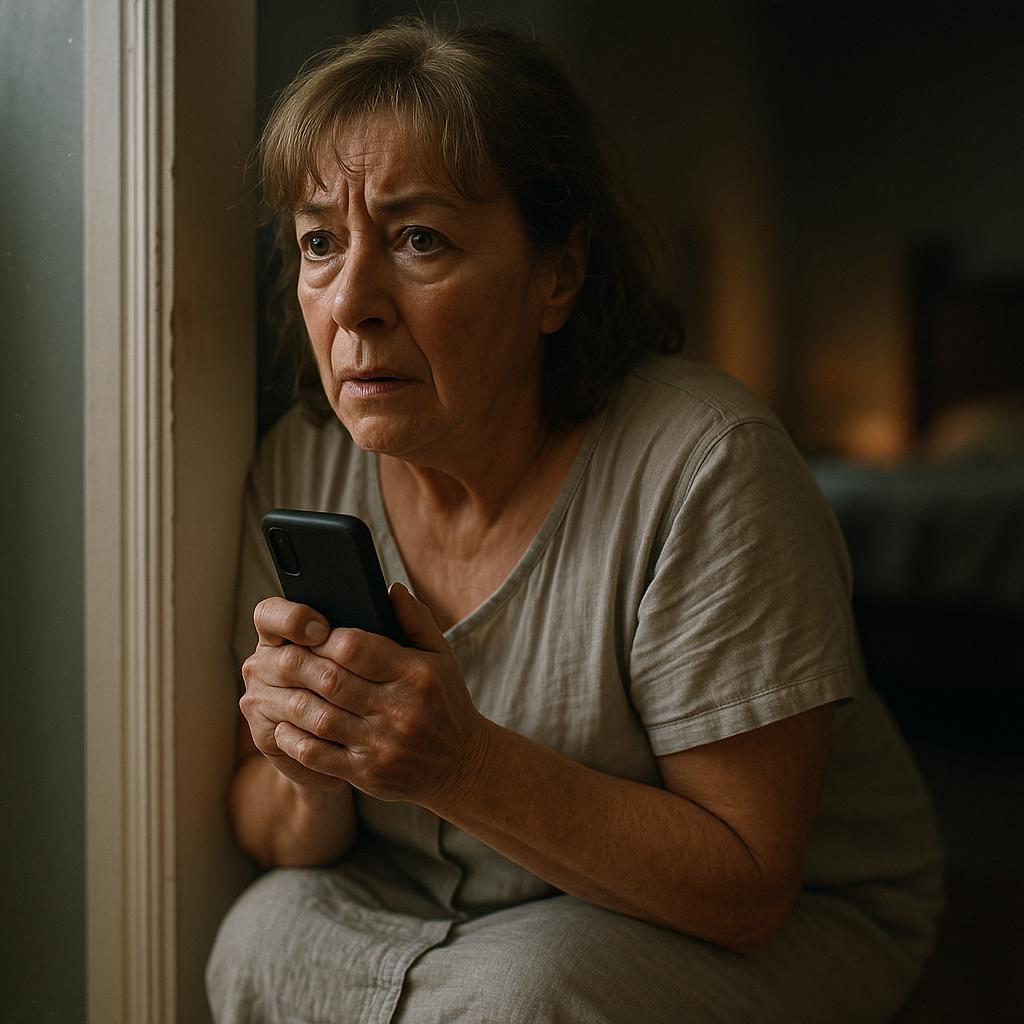 Image by RM AI
Image by RM AI
The Police Visit
The police arrived in less than ten minutes, two officers with flashlights and serious expressions. I stood in my bathrobe at the top of the stairs, watching as they methodically checked every room, closet, and corner. Carl waited with me, his presence steadying. 'We'll find whoever it is,' he promised, but his voice lacked conviction. After twenty minutes of searching, the younger officer—couldn't have been more than thirty—approached with that look I've come to recognize. It's the same one the bank teller gives me when I can't remember my PIN, or when I ask the grocery boy to help me find something that's right in front of me. That 'poor confused old lady' look that makes me want to scream. 'Ma'am,' he said gently, like he was talking to a child, 'we've checked everywhere. There's no sign of forced entry, nothing disturbed.' His partner, older with salt-and-pepper hair, suggested changing the locks and installing a front-door camera. 'For peace of mind,' he added kindly. I nodded, feeling foolish and frustrated all at once. After they left, Carl squeezed my shoulder. 'First thing tomorrow, we'll get those locks changed and that camera installed. I know a guy.' I thanked him, but inside I was seething. I wasn't imagining things. I wasn't losing my mind. Something was happening in my house, and if the police couldn't see it, I'd have to find the truth myself. What I didn't know then was that the camera would reveal something far more unexpected than any burglar.
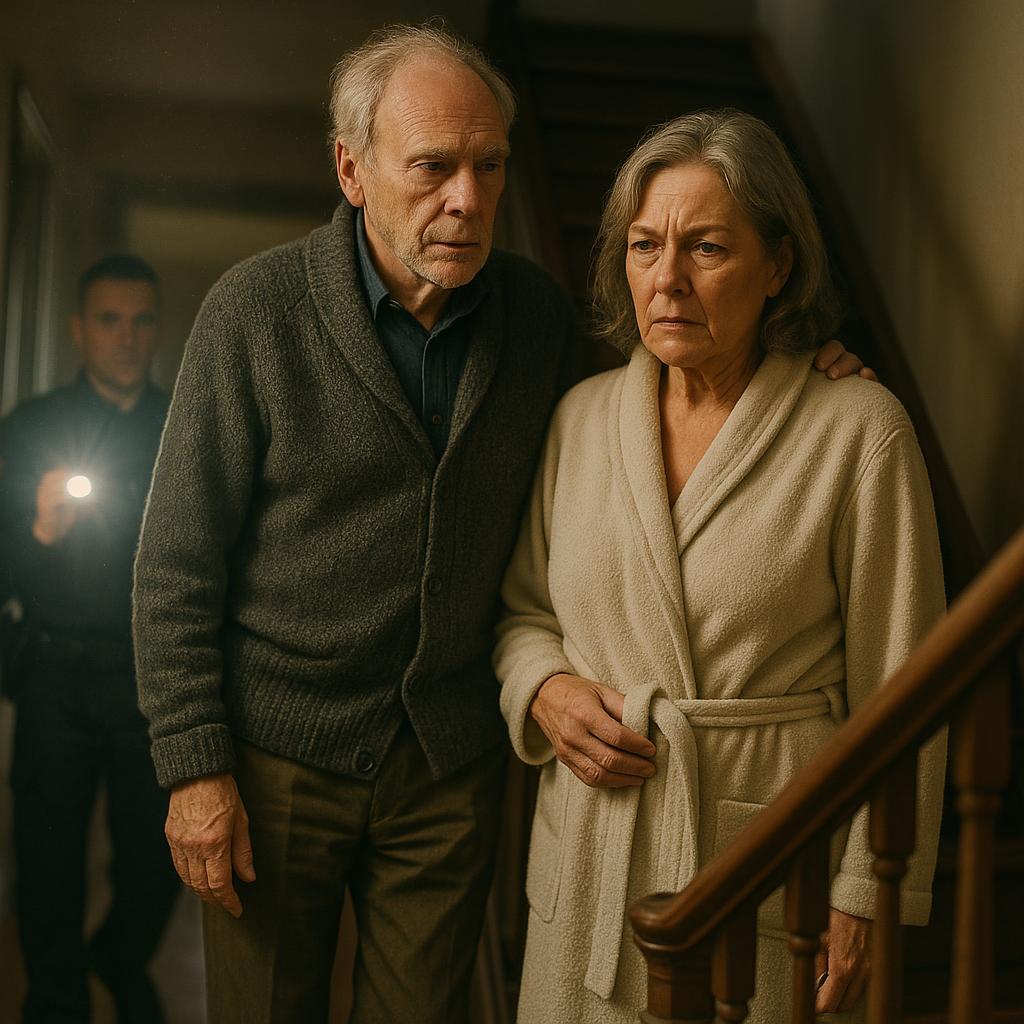 Image by RM AI
Image by RM AI
New Security
True to his word, Carl showed up the next morning with a locksmith friend who installed a fancy new deadbolt that looked like it belonged on a bank vault. 'This thing could keep out a bulldozer,' Carl joked, giving the door a satisfied pat. By afternoon, we had a sleek little camera mounted above my front door, its unblinking eye surveying my porch like a vigilant guardian. Carl patiently walked me through the app on my phone, his weathered finger tapping the screen to show me how to check the live feed and review recorded clips. 'See? Now you'll know exactly who's coming and going,' he said with a reassuring smile. I nodded, feeling a strange mixture of relief and embarrassment. Part of me still felt silly for making such a fuss—what if it really had just been headlights or neighborhood kids playing pranks? But another part, the part that remembered that perfectly folded dish towel, knew better. That night, I slept with my phone on the pillow beside me, the camera app open and glowing softly in the darkness. For the first time in weeks, I didn't need George's golf club nearby. The house seemed quieter somehow, as if it too was holding its breath, waiting. I drifted off to sleep thinking that maybe, just maybe, this nightmare was finally over. I couldn't have been more wrong. Three nights later—just after midnight again—my phone pinged with a sound that would change everything.
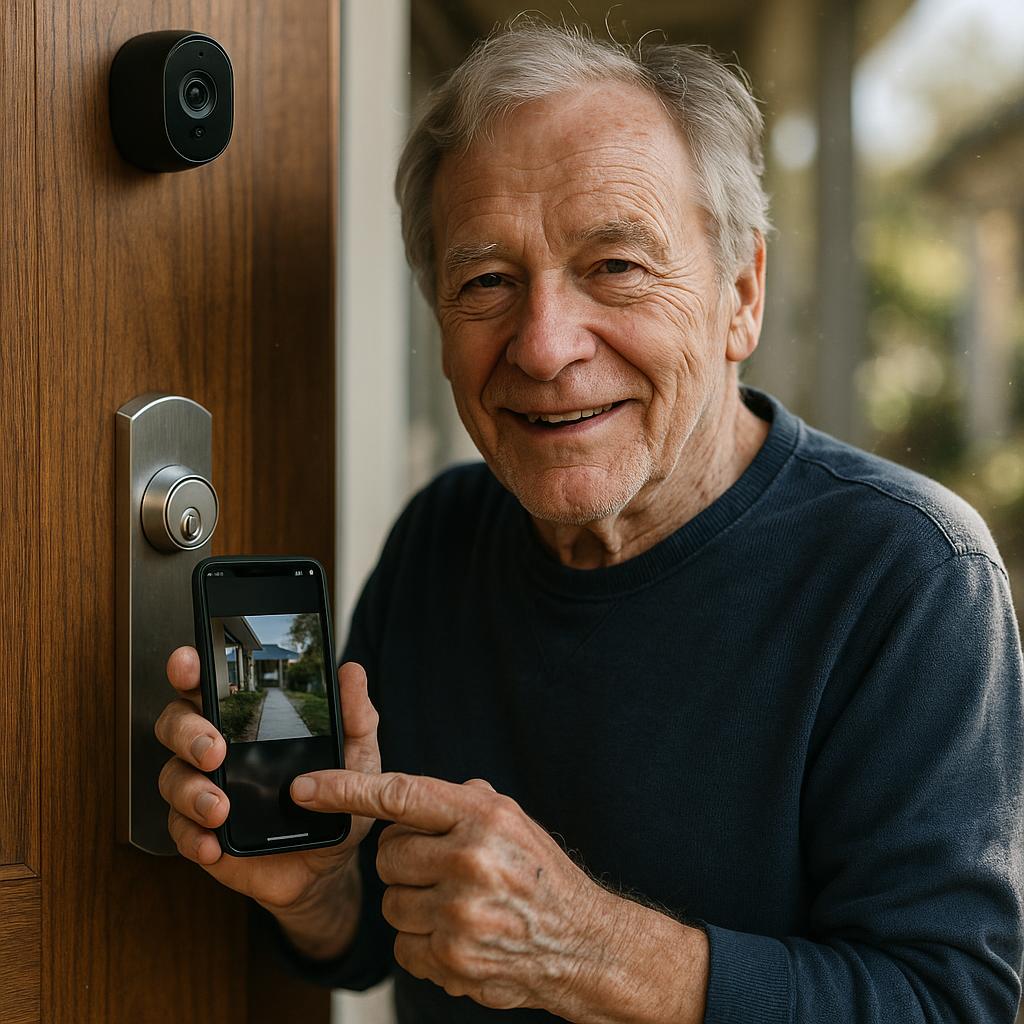 Image by RM AI
Image by RM AI
The Midnight Alert
The ping from my phone nearly gave me a heart attack. I'd been dozing in that half-awake state where dreams and reality blur together, but that alert jolted me fully conscious. A motion detection notification. My first thought was that maybe a neighborhood cat had wandered onto my porch, or perhaps the wind had blown something across the camera's view. I tapped the notification with sleep-clumsy fingers, squinting at the sudden brightness of my screen. What I saw made my stomach plummet like an elevator with cut cables. There, illuminated in the harsh glow of my porch light, was an elderly woman. She wasn't just passing by or looking lost—she was standing right at my door, her thin, veined hands working a key into my brand-new deadbolt. The key that wasn't supposed to work anymore. She was small and hunched, with wispy gray hair pulled back in a tight bun that reminded me of my third-grade teacher. Her movements were jerky and uncertain, but there was determination in the way she kept trying that key, jiggling it with increasing frustration. I sat frozen in bed, watching this stranger trying to enter my home with the casual confidence of someone who believed they belonged there. Without thinking, I grabbed George's golf club and swung my legs out of bed. My heart was hammering so hard I could feel it in my throat as I crept toward the stairs. Who was this woman, and why did she have a key to my house?
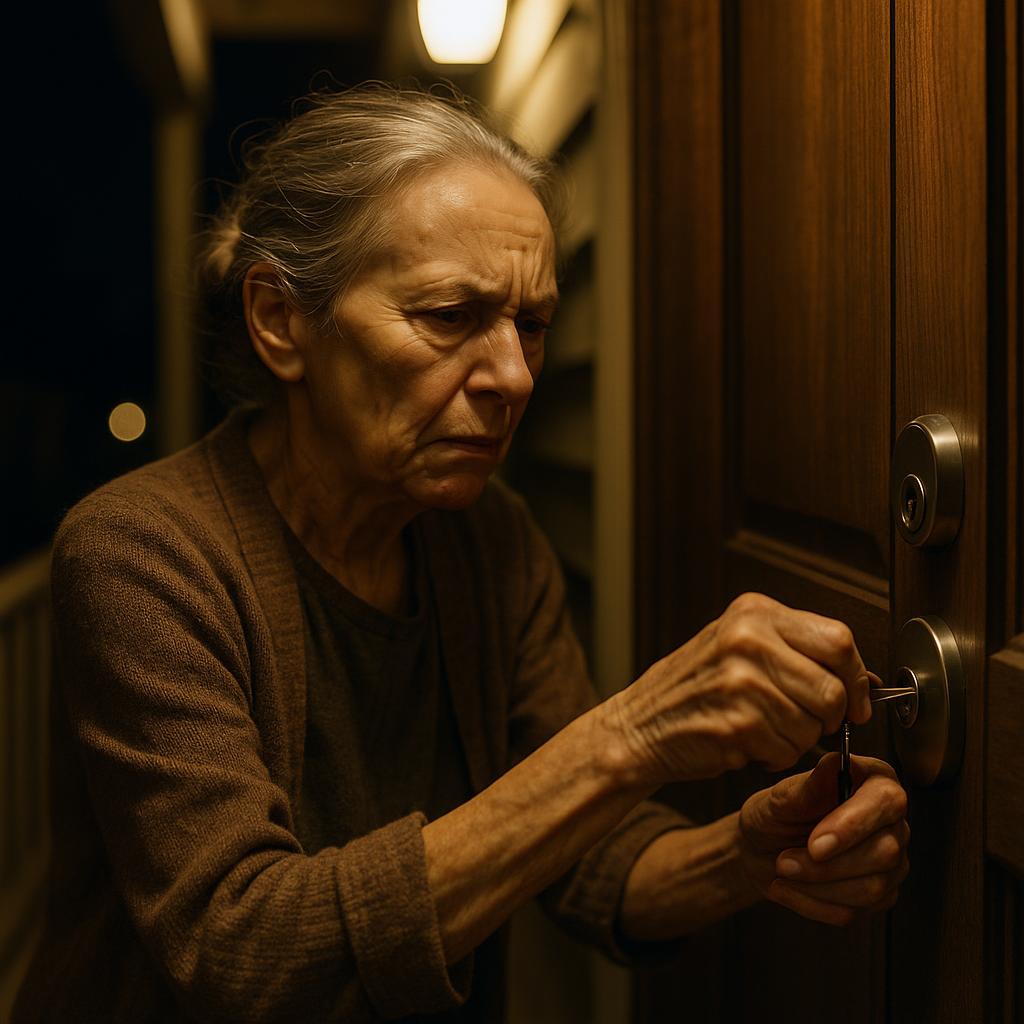 Image by RM AI
Image by RM AI
The Woman at the Door
I inched down the stairs, golf club raised like some ridiculous senior citizen warrior. The woman was still there on my doorstep, her frail shoulders hunched with determination as she struggled with the key. My heart was racing so fast I thought it might burst right out of my chest. Should I call the police? Wake up Carl? Through the peephole, I could see her more clearly now—her weathered face creased with confusion, those trembling hands still working the lock like she'd done it a thousand times before. Something about her desperation made me pause. She didn't look dangerous—she looked lost. Before I could overthink it, I flipped on the porch light and opened the door, still clutching George's golf club like a lifeline. The woman gasped and stumbled backward, her pale blue eyes widening with shock. "What are you doing in my house?" she demanded, her voice quavering but indignant. I blinked, completely thrown off guard. Her house? I stood there in my nightgown, golf club half-raised, trying to process her words. "Your house?" I repeated stupidly. "Ma'am, this is my home." She looked around, disoriented, her gaze darting from the house numbers to the flowerpots I'd arranged on the steps. "No, no, this can't be right," she insisted, her voice breaking. "Where's my husband? Where's Harold?" That's when I realized this wasn't an intruder—at least, not in the way I'd feared. This was something else entirely, something that made my heart ache in a way no midnight prowler ever could.
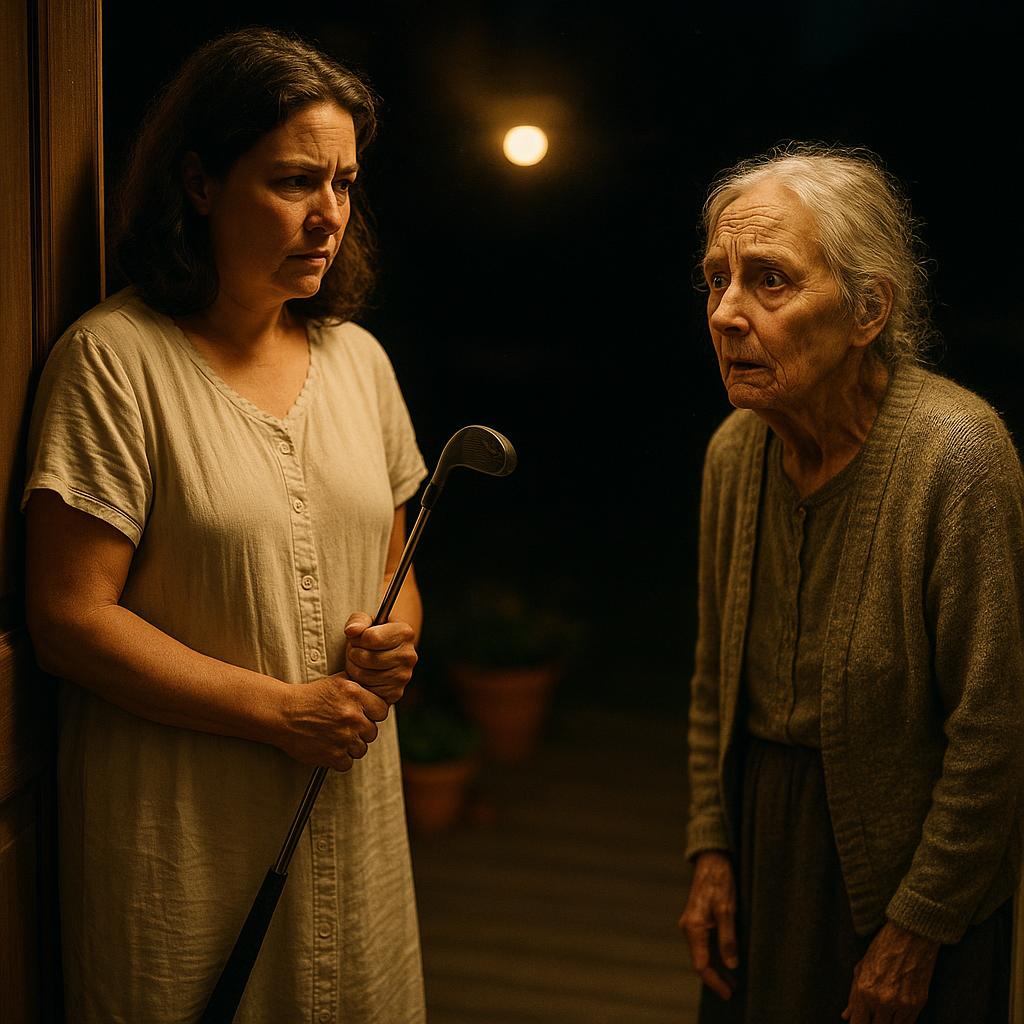 Image by RM AI
Image by RM AI
Confrontation
Something in her voice—confusion mixed with heartbreak—made my fear melt into pity. I lowered the golf club, suddenly feeling ridiculous standing there in my nightgown wielding George's old Callaway like I was about to tee off at midnight. 'Why don't you come inside and sit down,' I said gently, stepping back from the doorway. She hesitated, her eyes darting past me into the house as if searching for something familiar. After a moment, she nodded and followed me in, her steps tentative yet somehow certain—like her body remembered this path even if her mind was confused. I guided her to the living room, where she immediately went to George's old armchair as if drawn there by invisible strings. 'This isn't right,' she murmured, running her fingers along the fabric. 'Harold always kept his newspaper here.' My heart squeezed painfully in my chest. I reached for my phone and called Carl, keeping my voice low as I explained what was happening. 'I'll be right over,' he said without hesitation. While waiting, I made her some tea, which she accepted with trembling hands but didn't drink. She just sat there, looking around my living room with the most heartbreaking mixture of recognition and bewilderment I'd ever seen. When Carl arrived minutes later, the look on his face told me he knew exactly who my midnight visitor was—and why she thought my house was hers.
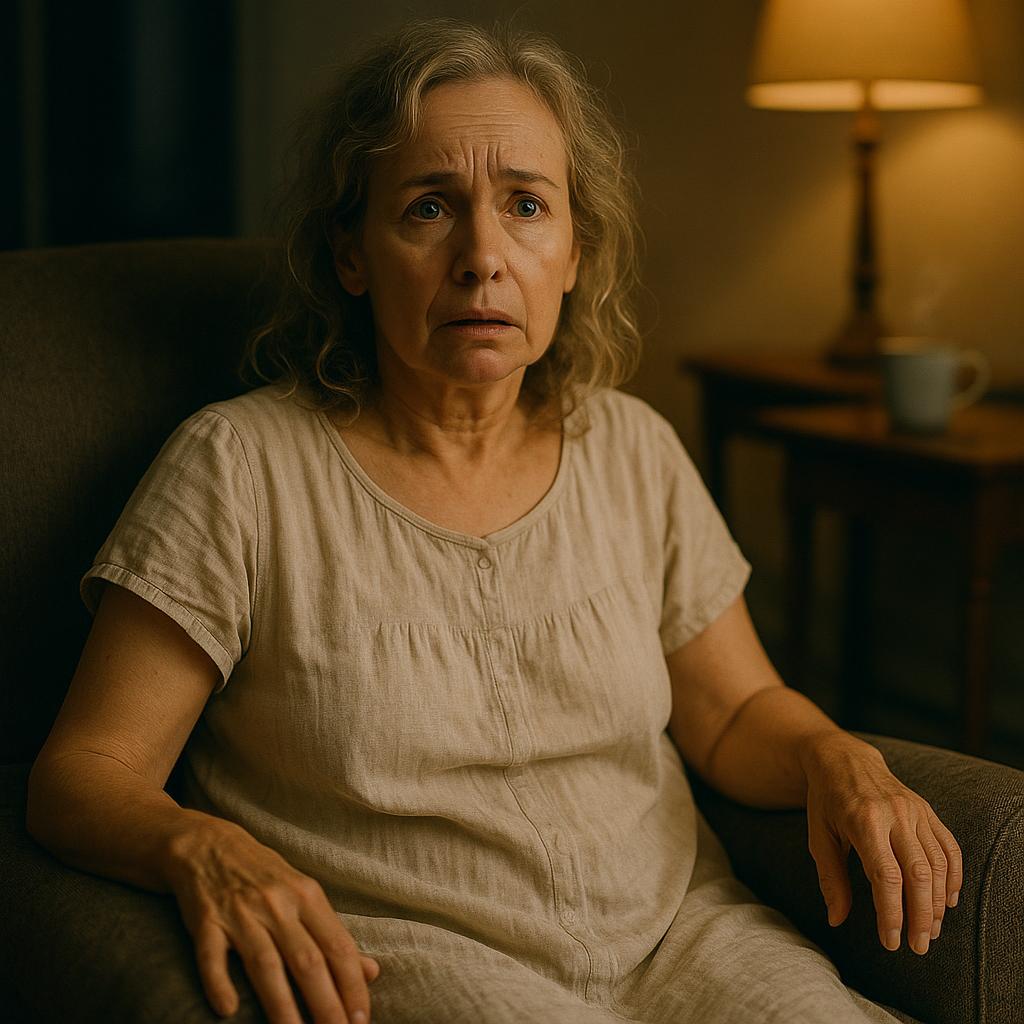 Image by RM AI
Image by RM AI
A Moment of Clarity
I watched as she shuffled into the kitchen, her fingers trailing along the countertop like she was reading braille. 'The sugar bowl used to sit right here,' she murmured, tapping a spot next to the coffee maker I'd bought last week. I filled the kettle and set it to boil, stealing glances at her as she continued her inventory of what was missing or moved. Her cardigan hung loose on her thin frame, and I noticed a small brooch pinned to it—a tiny silver bird with wings spread wide. 'Would you like some chamomile?' I asked, opening the cabinet where I kept my tea collection. She nodded absently, then frowned at the mug I offered her. 'Harold likes the blue one with the sailboats,' she said. I didn't have the heart to tell her there was no blue mug with sailboats in my cupboard. Instead, I just smiled and poured the hot water over the tea bags. As we sat at the kitchen table—her in George's old chair that somehow seemed to fit her perfectly—I noticed how her eyes kept drifting to the window above the sink, as if expecting to see a different view. 'The maple tree,' she whispered. 'Harold planted it when we first moved in.' My throat tightened. There was no maple tree in my yard, just a scraggly rosebush I hadn't gotten around to pruning. When Carl's knock finally came at the door, I almost didn't want to answer it. Something told me that once I did, this strange, sad midnight encounter would shift into something else entirely—something that would change both our lives in ways I couldn't yet imagine.
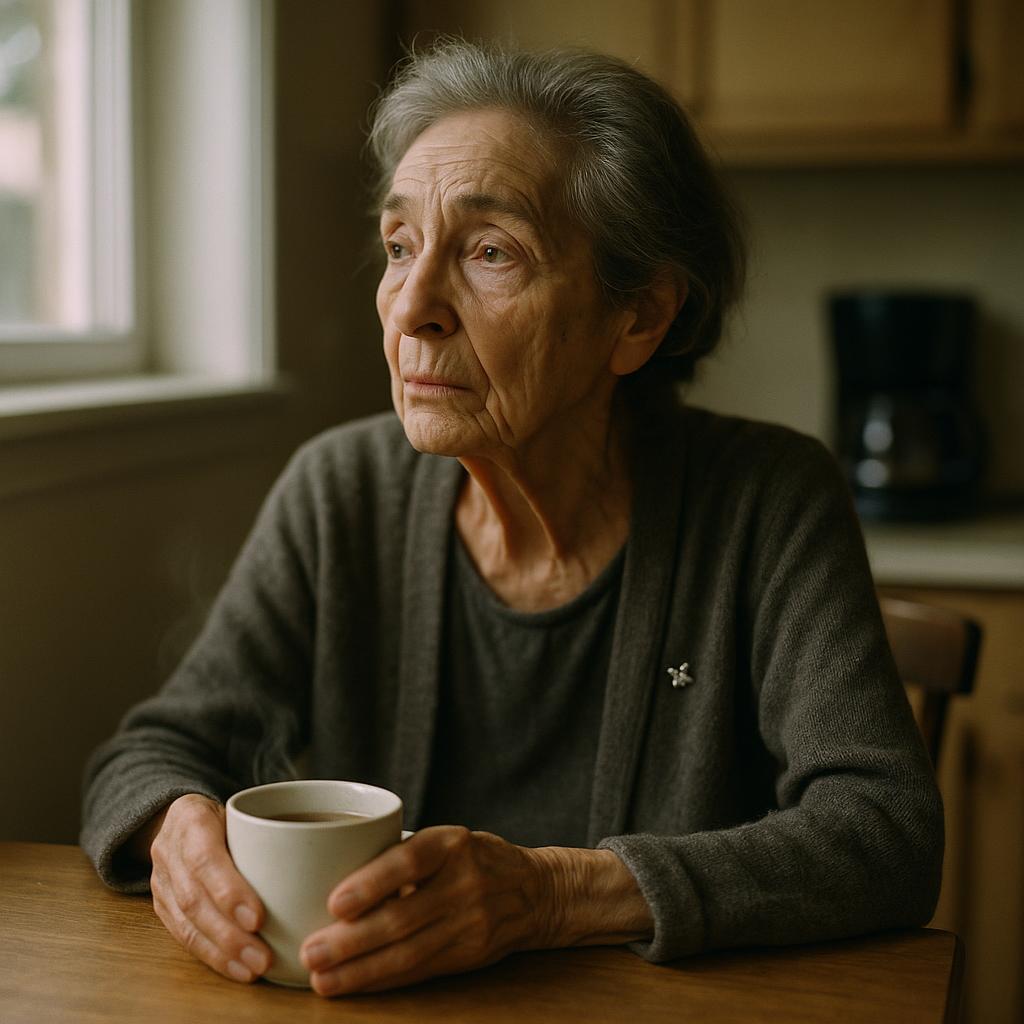 Image by RM AI
Image by RM AI
Carl's Recognition
When Carl arrived, he took one look at the woman and his face fell like a soufflé taken out of the oven too soon. 'Tanya,' he said quietly, pulling me aside while the woman continued to examine my living room with bewildered familiarity. 'That's Mrs. Larkin. She lived here before you bought the place.' My mouth formed a perfect O of realization. 'Her husband Harold died about two years ago,' Carl continued, his voice barely above a whisper. 'Poor thing's been in and out of care homes since then. Some days she's sharp as a tack, other days...' He trailed off, glancing at Mrs. Larkin with unmistakable compassion. It all clicked at once—the lights, the strange feeling, the sense that the house held someone else's memories. She hadn't been an intruder; she'd been trying to come home. The mysterious movements in the kitchen weren't a ghost or a burglar—just a confused elderly woman who couldn't understand why strangers were living in what she still believed was her house. I felt a wave of emotions crash over me: relief that there was no danger, guilt for being afraid, and a profound sadness for this woman who was lost in more ways than one. 'What should we do?' I asked Carl, watching as Mrs. Larkin straightened a picture frame I had hanging slightly crooked—a small, automatic gesture that spoke volumes about how long she must have lived here. Carl sighed and pulled out his phone. 'I have her daughter's number somewhere. But Tanya,' he hesitated, his weathered face troubled, 'you should know that when her family comes to get her, it won't be the happy reunion you might be picturing.'
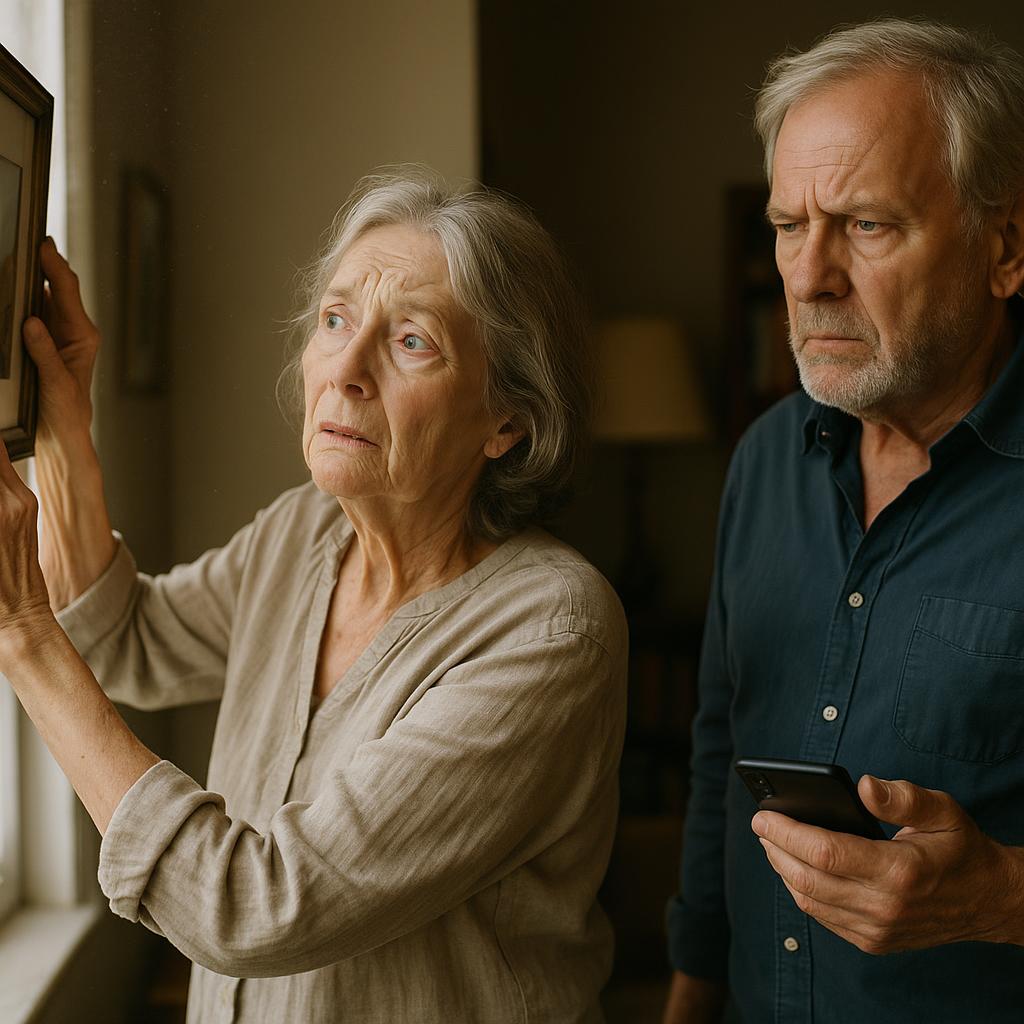 Image by RM AI
Image by RM AI
The Daughter Arrives
We waited in awkward silence for Mrs. Larkin's daughter to arrive. When the doorbell finally rang about forty minutes later, I opened it to find a woman in her fifties wearing yoga pants and a pinched expression that suggested this wasn't her first middle-of-the-night rescue mission. 'Where is she?' she asked without so much as a hello, brushing past me into the living room. When she spotted her mother sitting in George's armchair, her sigh was audible. 'Mom, seriously? Again?' Mrs. Larkin's shoulders hunched forward, making her seem even smaller than she already was. 'I was just looking for Harold,' she whispered. The daughter turned to Carl and me with an expression that was more annoyed than concerned. 'I told the care home to keep better track of her,' she said sharply, fishing car keys from her designer purse. 'She's been wandering more lately. Last week she ended up at the old grocery store where Dad used to shop.' I wanted to say something—about compassion, about how frightening it must be to lose your memories piece by piece—but the look of pure shame on Mrs. Larkin's face stopped me cold. She wouldn't meet anyone's eyes as her daughter helped her up, murmuring, 'Come on, Mom, let's get you back where you belong.' I bit my tongue so hard I tasted blood. As they headed toward the door, Mrs. Larkin paused, her trembling hand reaching out to touch the wallpaper in my hallway. 'I picked this pattern,' she said softly, to no one in particular. 'Harold said it was too expensive, but I told him some things are worth the extra money.' After they left, Carl and I stood in silence, the echo of the closing door hanging between us like an unfinished conversation.
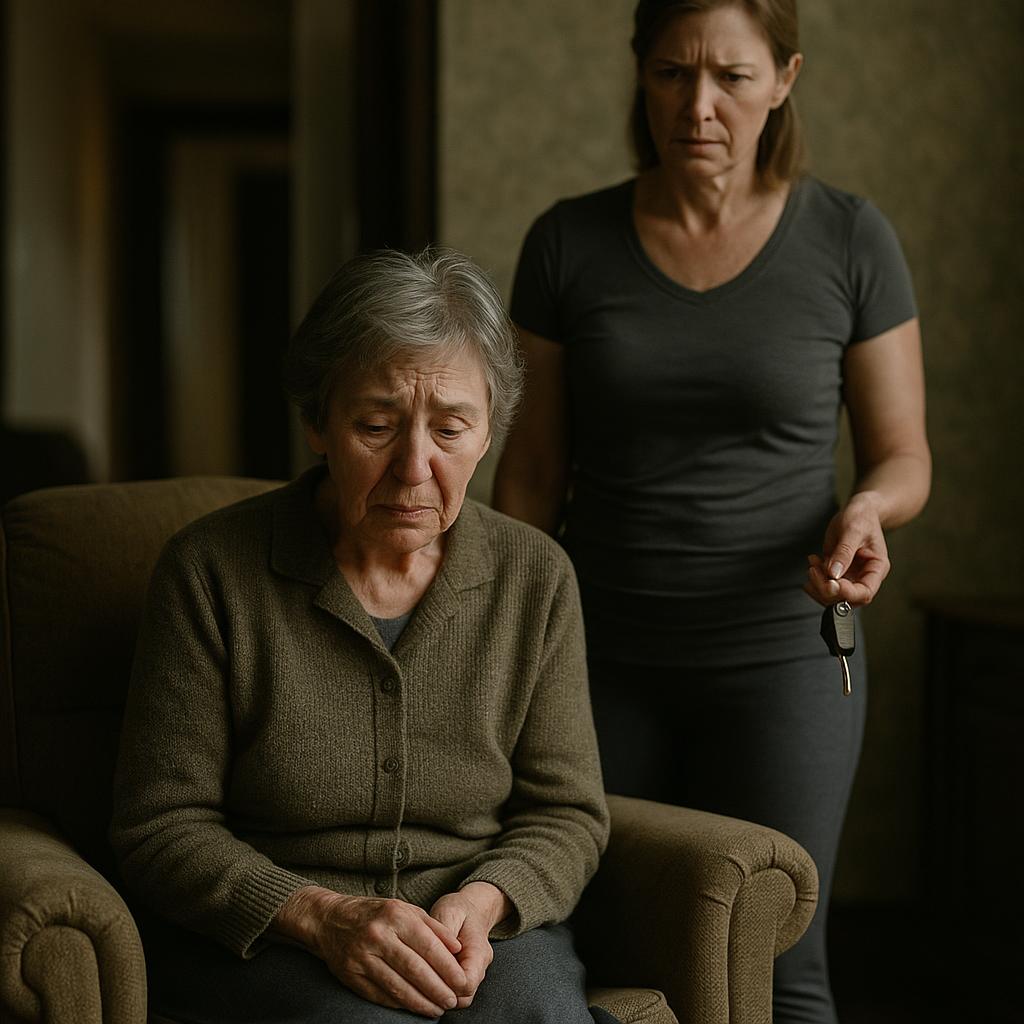 Image by RM AI
Image by RM AI
Sleepless Night
After Mrs. Larkin and her daughter left, I sat at my kitchen table until 3 AM, nursing a cup of tea that had long gone cold. Sleep was impossible. Every time I closed my eyes, I saw her face—that heartbreaking mixture of confusion and longing when she touched the wallpaper she'd chosen decades ago. I couldn't stop thinking about what it must feel like to be her—to lose your husband, then your home, then your memories, piece by painful piece. To be treated like an inconvenience by your own child. To have the landmarks of your life erased one by one until you're wandering in the dark, trying to find your way back to something familiar. It hit too close to home. After all, wasn't I doing the same thing in my own way? Clinging to George's golf club, arranging our photos just so, as if these rituals could somehow keep him with me? The truth was terrifying: someday, I might be Mrs. Larkin. My daughter might speak about me in that same exasperated tone. My memories might become someone else's inconvenience. I got up and walked through each room of the house—my house, her house—touching doorframes and light switches, wondering whose fingers had rested there before mine. By dawn, I'd made a decision. I couldn't just let Mrs. Larkin disappear back into that care home, forgotten by everyone except an annoyed daughter who saw her only as a burden. I didn't know exactly what I could do, but I knew I had to try something. Because in her confused eyes, I'd seen my own future staring back at me.
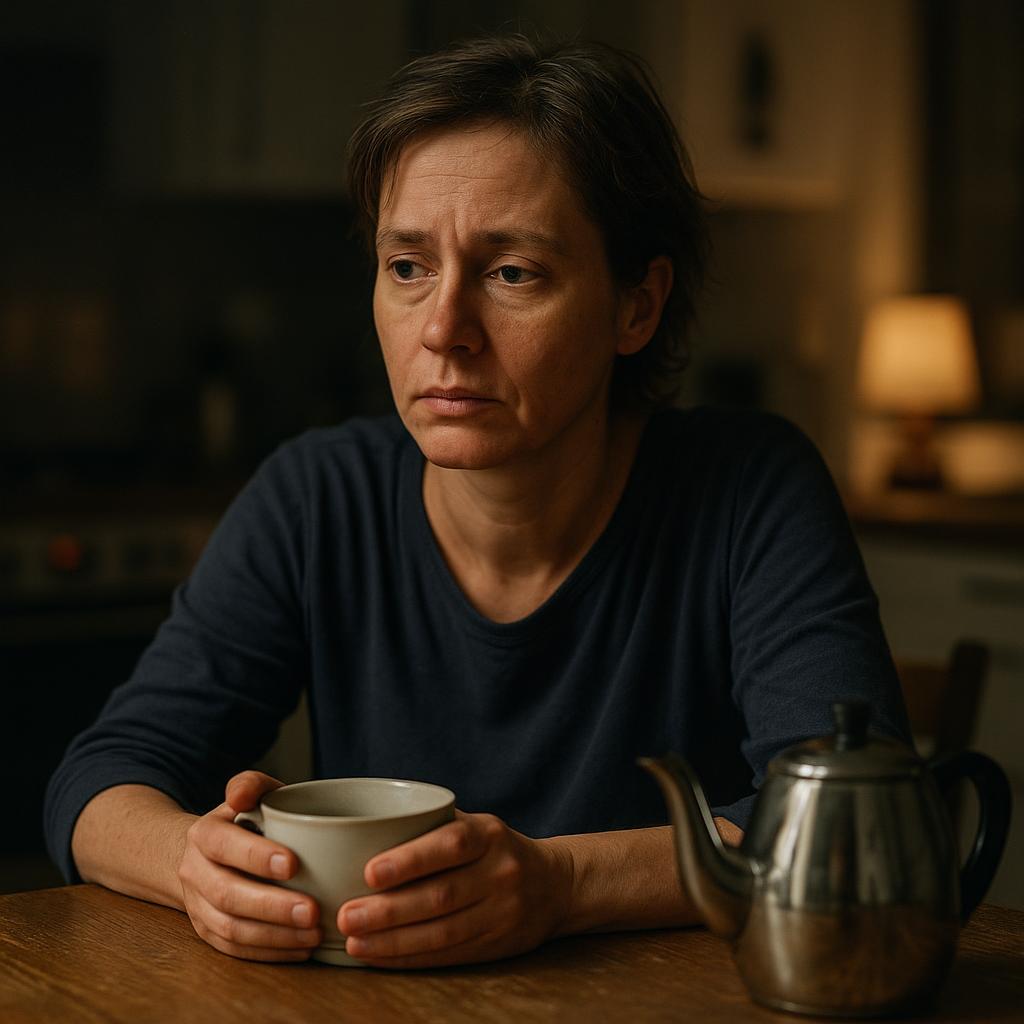 Image by RM AI
Image by RM AI
The Care Home Visit
For a week, I couldn't sleep properly. Every time I closed my eyes, I saw Mrs. Larkin's face—confused, lost, searching for a home that wasn't hers anymore. Or rather, a home that was now mine. The guilt gnawed at me like termites in old wood. I called Carl on Thursday morning. "Do you know which care facility they took her to?" I asked, twisting the phone cord around my finger like I used to do as a teenager. Carl not only knew, but offered to drive me there the next day. Sunshine Haven was neither sunny nor much of a haven—just a beige building with too-bright fluorescent lighting and that unmistakable smell of industrial cleaner trying to mask other, less pleasant odors. The nurse at the front desk eyed us suspiciously until I explained who we were there to see. "Room 217," she said, pointing down a long hallway. "But don't expect much. She has good days and bad days." When we entered her room, Mrs. Larkin was sitting by the window, folding and refolding a tissue. The moment she saw me, her face transformed. "You're the nice lady from my house," she said, her eyes suddenly bright with recognition. "Did Harold find his slippers?" My throat tightened. I glanced at Carl, who gave me a small nod. "Yes," I said, taking her papery hand in mine. "He found them right where you said they'd be." The smile that spread across her face was worth the white lie. For that moment, in her mind, Harold was still alive, still looking for his slippers, and everything was as it should be. What I didn't realize then was that this simple visit would be the beginning of something neither of us expected.
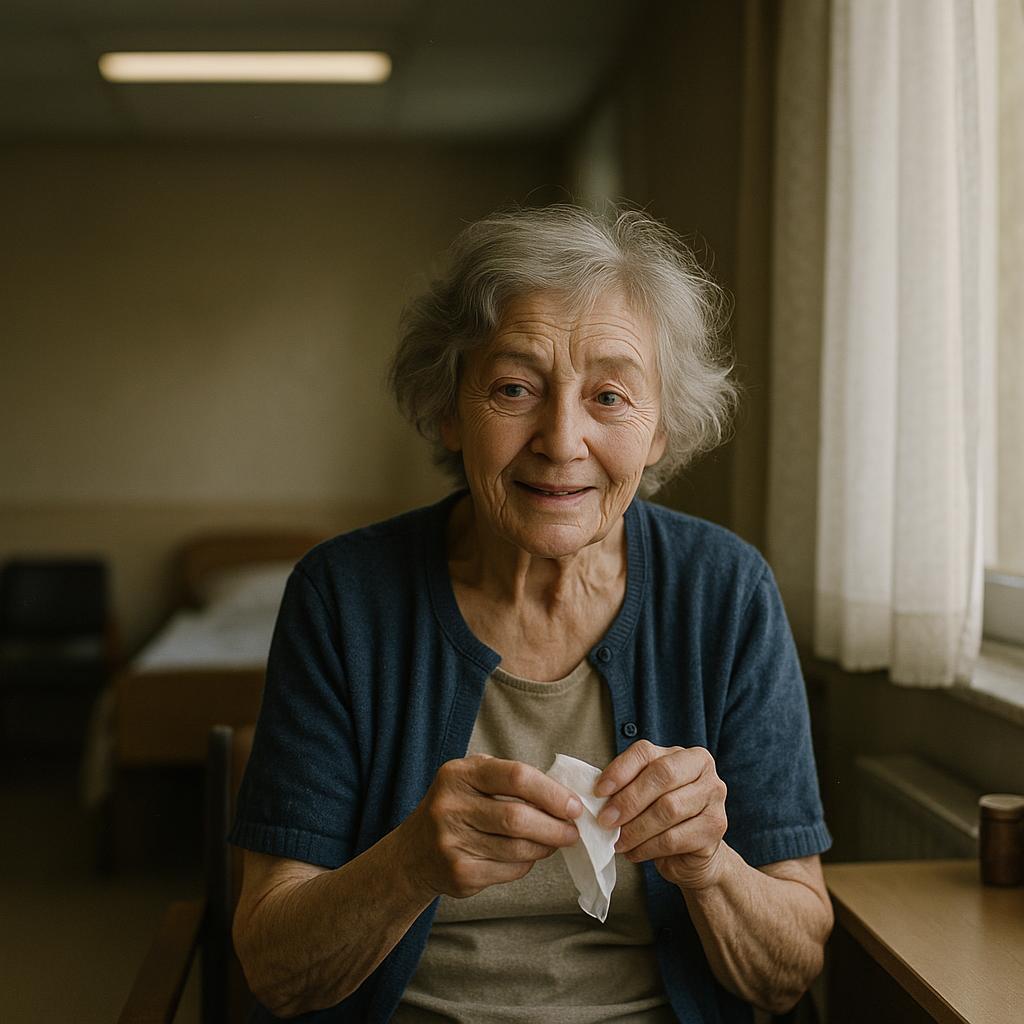 Image by RM AI
Image by RM AI
Cookies and Photos
The next time I visited Mrs. Larkin, I came prepared. I'd baked chocolate chip cookies from scratch—George's favorite recipe—and brought along photos of the tulips I'd planted in the front yard. She was having one of her better days, sitting up in a chair by the window instead of in bed. Her face lit up when she saw the cookies, her thin fingers reaching eagerly for one. "These smell just like my mother used to make," she said, closing her eyes as she took a small bite. I watched as she savored it, wondering when the last time was that someone had brought her homemade treats. Then I showed her the photos of the tulips, bright red and yellow blooms against the fresh mulch. She held each picture close to her face, squinting through thick glasses that magnified her pale blue eyes. "Harold always wanted tulips," she said with such certainty that I didn't have the heart to correct her. Carl had told me her husband had been allergic to most flowers and had actually preferred a neat lawn with no garden at all. But I just nodded and smiled, letting her remember things her way. What harm was there in allowing her this small happiness? Memory is funny that way—sometimes the truth we create is more comforting than the truth that actually happened. As she flipped through the photos again, I noticed something I hadn't seen before: a small smile playing at the corners of her mouth, a glimpse of the woman she must have been before time and confusion took their toll. It made me wonder what other parts of Mrs. Larkin were still in there, waiting for someone to care enough to find them.
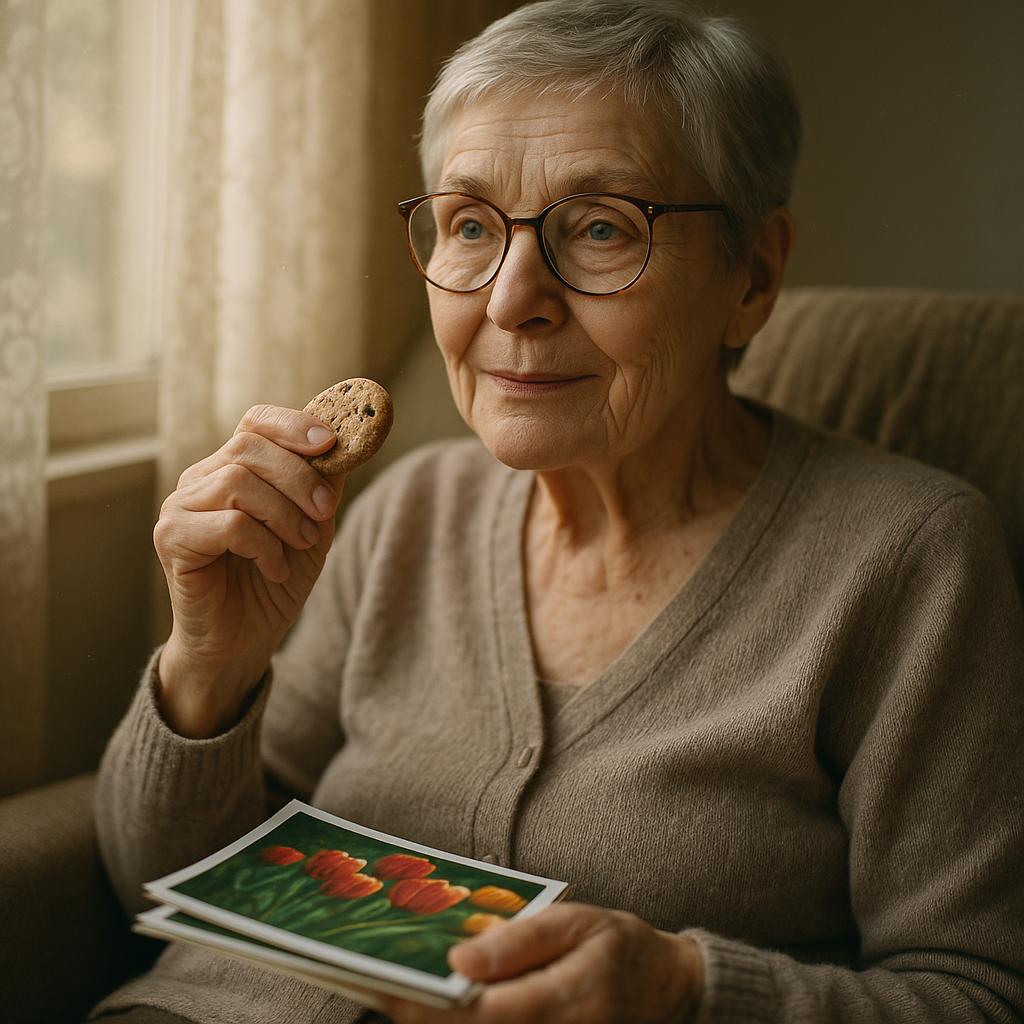 Image by RM AI
Image by RM AI
Friday Visits
From then on, I started visiting Mrs. Larkin every Friday like clockwork. It became my standing appointment—hair salon on Tuesdays, grocery shopping on Wednesdays, Mrs. Larkin on Fridays. Carl joined me sometimes, bringing her homemade lemon squares that made her eyes light up. We'd sit in her small room at Sunshine Haven, listening as she unspooled stories about 'her house'—my house—like yarn from a beloved sweater. Some days her memories were crystal clear: 'Harold built a dollhouse for our daughter one Christmas,' she'd say, describing in perfect detail how he'd stayed up three nights straight, cursing under his breath at the tiny furniture. Other days, her stories wandered like lost travelers—raccoons in chimneys became bears in the basement, or her daughter's wedding somehow happened in the backyard during a blizzard. I never corrected her. What was the point? In her world, these things had happened exactly as she remembered them. I'd nod and ask questions, watching her face animate with joy at having someone who wanted to hear her stories. Sometimes, when she'd drift off mid-sentence, I'd catch Carl looking at me with an expression I couldn't quite read—something between admiration and concern. 'You're good for her,' he told me once as we walked to the parking lot. What he didn't say, but what I knew he was thinking, was that someday I might need someone to be good for me too. What neither of us expected was how Mrs. Larkin's daughter would react when she discovered our Friday ritual.
 Image by RM AI
Image by RM AI
The Abandoned Mother
It was during my third month of visits that I noticed something odd—Mrs. Larkin's daughter hadn't been by in weeks. When I casually mentioned this to one of the nurses, she lowered her voice and said, "She moved to Arizona last month. Didn't even say goodbye to her mother." My heart sank like a stone. How could anyone just abandon their parent like that? Leave them alone in a place where days bleed together and memories slip away like water through cupped hands? I thought about my own daughter, busy with her career and children in Chicago. Would she someday decide I was too much trouble? Too many phone calls? Too many needs? I pushed the thought away and doubled down on my visits, sometimes bringing Carl, sometimes coming alone. I started bringing little things from the house—a photo of the kitchen with morning light streaming in, a cutting from the rosebush that had finally started to thrive. Mrs. Larkin would hold these offerings like precious artifacts, connecting her to a life that was slipping further away each day. "You're a good girl," she told me once, patting my hand with her paper-thin fingers. "Harold would have liked you." I smiled and squeezed her hand, not bothering to correct her. In her world, I was just a kind visitor, not the woman who now slept in the bedroom where she'd once laid her head for decades. What neither of us realized then was how these visits were changing both of us—and how they would eventually lead to a discovery that would shake the foundations of everything I thought I knew about my new home.
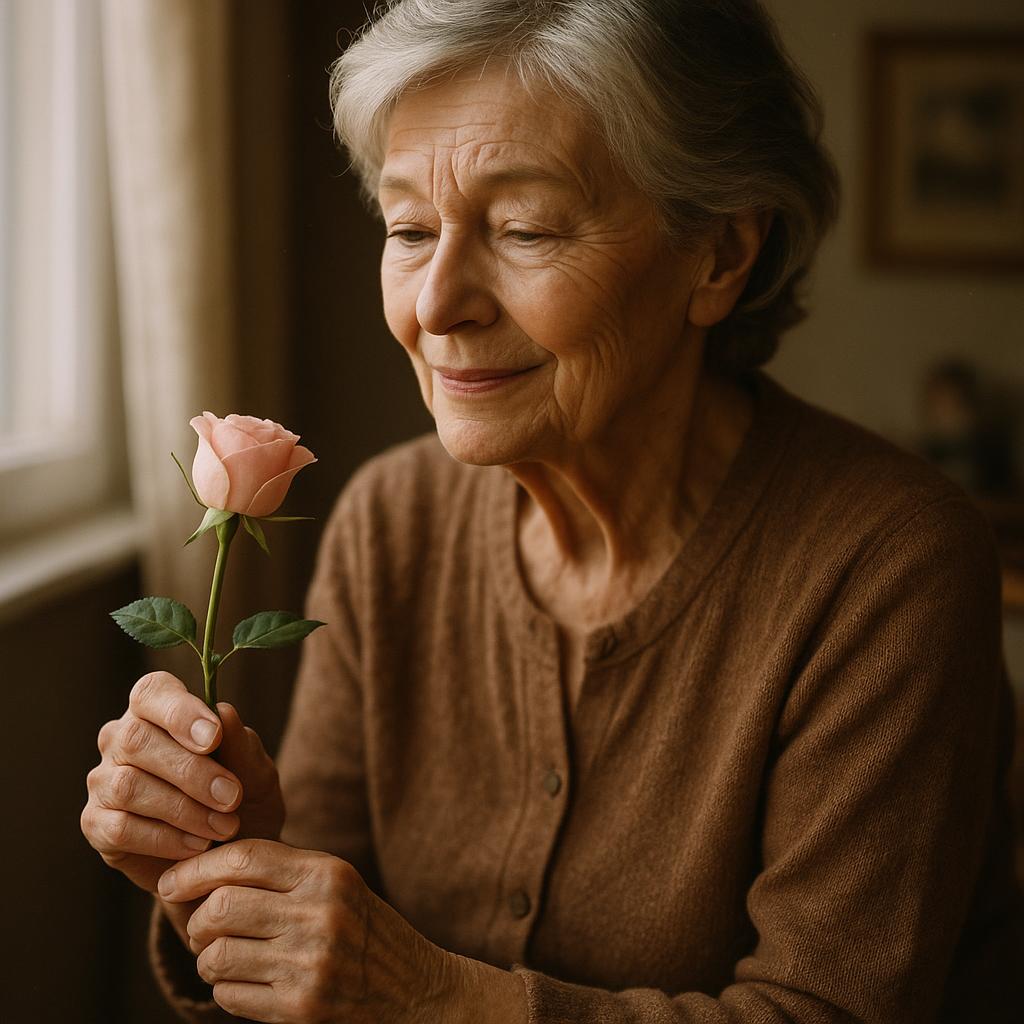 Image by RM AI
Image by RM AI
The Embroidered Towel
One afternoon, while visiting Mrs. Larkin, I noticed a beautiful hand-embroidered kitchen towel folded neatly on her nightstand. Delicate blue flowers danced along its edges, each stitch perfect despite being made by hands that now trembled with age. 'I made that when Harold and I first moved in,' she told me, her eyes clear with memory. 'Took me weeks to get those forget-me-nots right.' When I admired it, the nurse mentioned they were clearing out some of Mrs. Larkin's things to make room for medical equipment. 'Would you like it?' she asked. 'Otherwise, it'll probably get tossed.' The thought of this piece of history—this tangible memory—ending up in the trash made my stomach turn. I brought it home and hung it in my kitchen, right where the morning sun streams through the window. It's funny how such a small thing can change the feeling of a house. That first night after hanging it, I slept through until morning—no creaks waking me, no shadows seeming deeper than they should. Now, whenever that old uneasiness creeps back, I don't reach for George's golf club anymore. I just look at those embroidered forget-me-nots and think of Mrs. Larkin. Maybe that's what the house needed all along—not to forget its past, but to honor it. And maybe that's what I needed too. What I never expected was how that simple towel would lead to a discovery that would change everything I thought I knew about my new home.
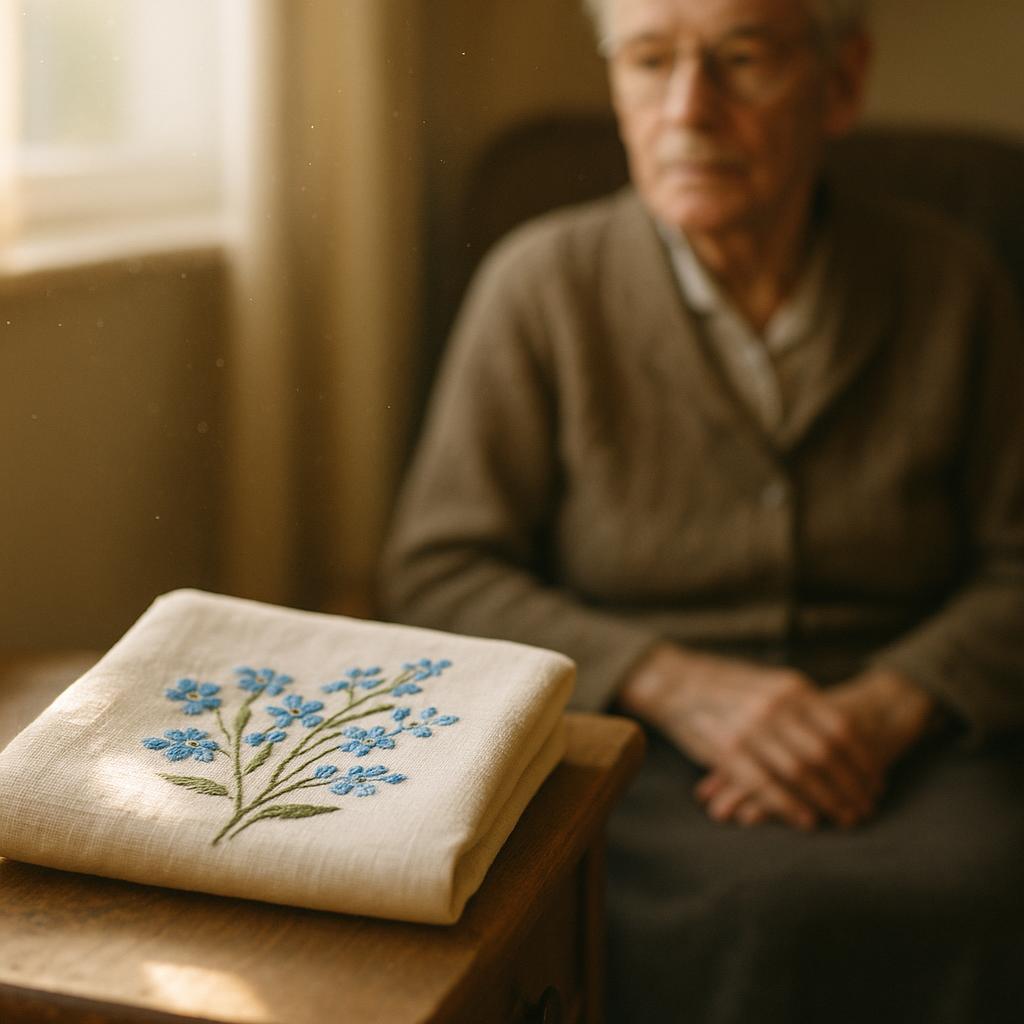 Image by RM AI
Image by RM AI
Memories, Not Ghosts
Six months have passed since that night Mrs. Larkin appeared on my doorstep. I've come to understand something profound about this little house we both call home—just at different points in time. When I dust the mantel or water the plants, I sometimes catch myself wondering if she stood in this exact spot, doing these exact same things. The house isn't haunted in the traditional sense, with rattling chains or ghostly apparitions. It's haunted by memories—her memories—that have seeped into the walls like decades of cigarette smoke. And you know what? I've stopped fighting it. That embroidered towel hanging in my kitchen has become a sort of talisman, reminding me that I'm just one chapter in this home's long story. On my better days, I imagine Mrs. Larkin and Harold sitting at my kitchen table, sharing coffee and the morning paper. On harder days, when I miss George so much my chest physically aches, I find comfort knowing someone else once felt that same love and loss within these walls. Carl says I'm being fanciful, but I've noticed he's gentler when he visits now, removing his shoes at the door and speaking in hushed tones like we're in a library of memories. Maybe that's what we all need as we age—not just to be remembered ourselves, but to be the keepers of others' memories too. What I never expected was how this perspective would prepare me for what I discovered in the attic last week, hidden beneath a loose floorboard.
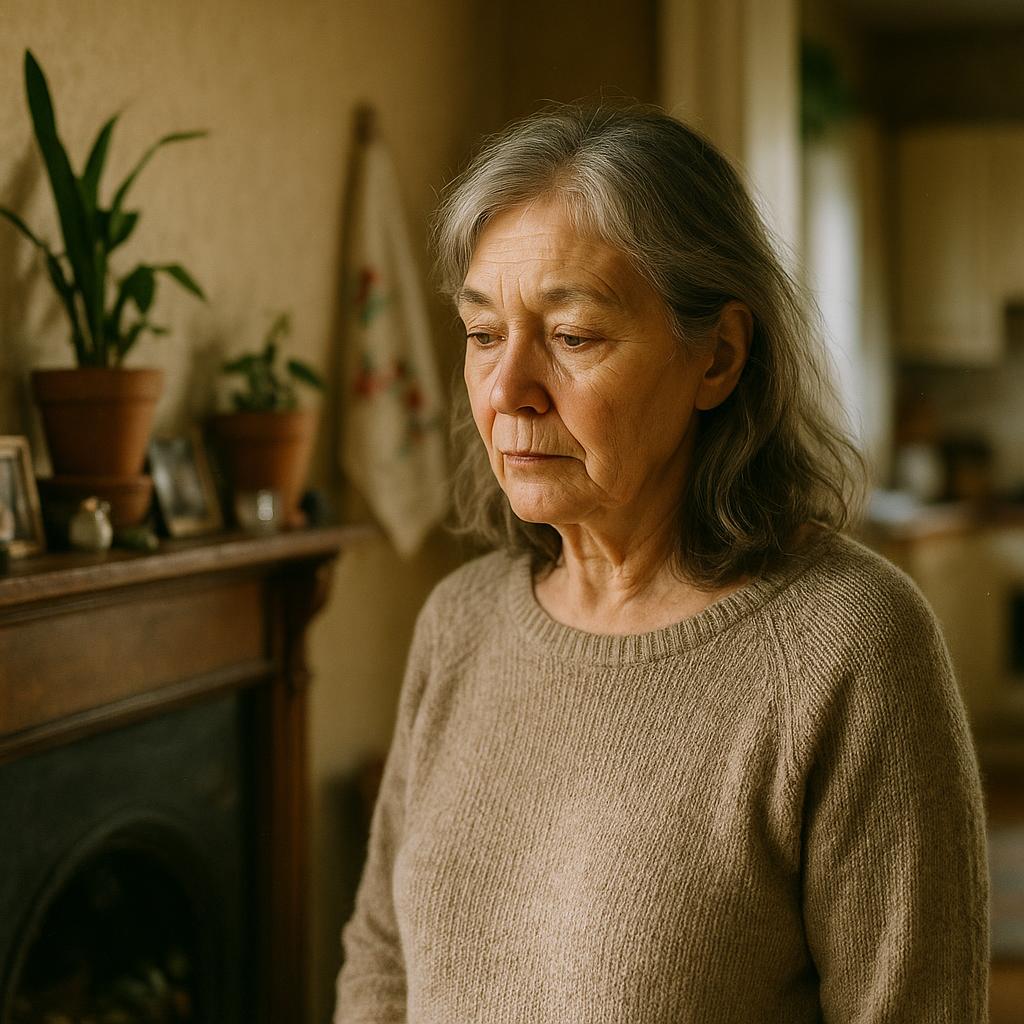 Image by RM AI
Image by RM AI
The Photo Album
During my Friday visit with Mrs. Larkin, she suddenly grabbed my wrist with surprising strength. 'The album,' she said, her eyes clearer than I'd seen in weeks. 'I left it in the attic—blue trunk with brass corners.' I froze. In three months of living there, I'd never even realized the house had an attic. That night, armed with a flashlight and George's old golf club (old habits die hard), I searched every ceiling in the house until I found it—a small pull-down door hidden in the hallway closet ceiling. The ladder creaked ominously as I climbed, dust dancing in the beam of my flashlight. The attic was stifling, filled with cobwebs and that distinct smell of forgotten spaces. I swept my light across the cramped space, heart pounding when it landed on something in the corner—a blue trunk with tarnished brass corners, exactly as she'd described. It was like finding buried treasure, except the map had been stored in the fragile memory of a woman who sometimes couldn't remember what day it was. My hands trembled as I lifted the heavy lid, half-expecting to find nothing but old clothes or Christmas decorations. Instead, there it was—a leather-bound photo album with 'Larkin Family Memories' embossed in faded gold letters. What I saw when I opened that album would forever change how I felt about this house, and about Mrs. Larkin herself.
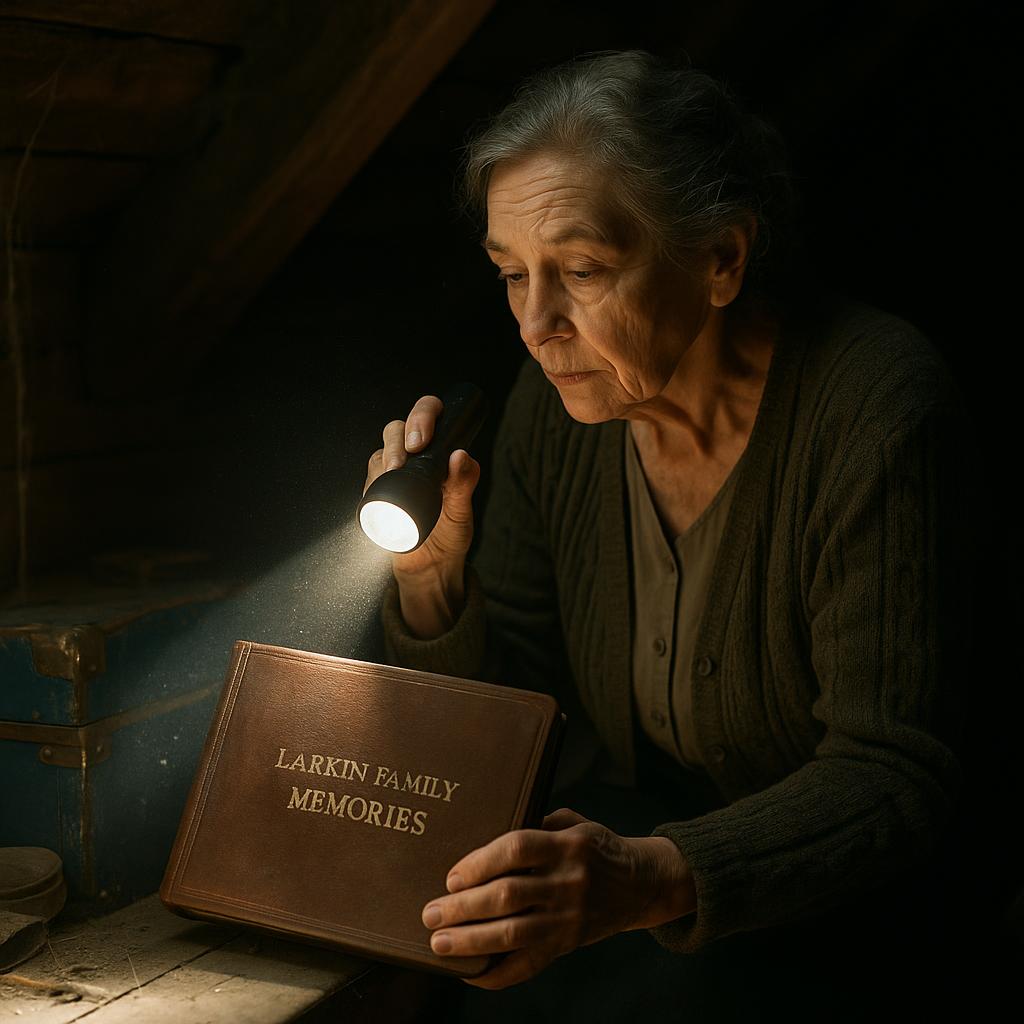 Image by RM AI
Image by RM AI
The Attic
The attic ladder creaked under my weight as I climbed up, armed with nothing but a flashlight and my racing heart. The beam cut through decades of dust dancing in the air, illuminating a space that felt frozen in time. It was smaller than I'd imagined—just a cramped crawlspace with exposed beams and pink insulation spilling out in places. The heat was stifling, pressing down on me like a physical weight. I swept the light across the space, half-expecting to find nothing, when suddenly—there it was. Just as Mrs. Larkin had described, a blue trunk with tarnished brass corners sat nestled between a broken rocking chair and what looked like an ancient sewing machine. My hands trembled as I knelt beside it, the floorboards groaning beneath me. The latch was stiff with age, but it gave way with a satisfying click. I lifted the heavy lid and gasped. Inside wasn't just one photo album, but three—their leather covers cracked but still beautiful. Beneath them lay a stack of letters tied with a faded blue ribbon, the paper yellowed at the edges. I picked up the top album, 'Larkin Family Memories' embossed in gold across the front. As I opened it, something fluttered to the floor—a pressed forget-me-not flower, the same delicate blue as the ones on the kitchen towel downstairs. My throat tightened as I realized I was holding not just photos, but the physical evidence of a life well-lived, memories Mrs. Larkin couldn't bear to leave behind when they took her away. What I found on the first page made me drop the flashlight in shock.
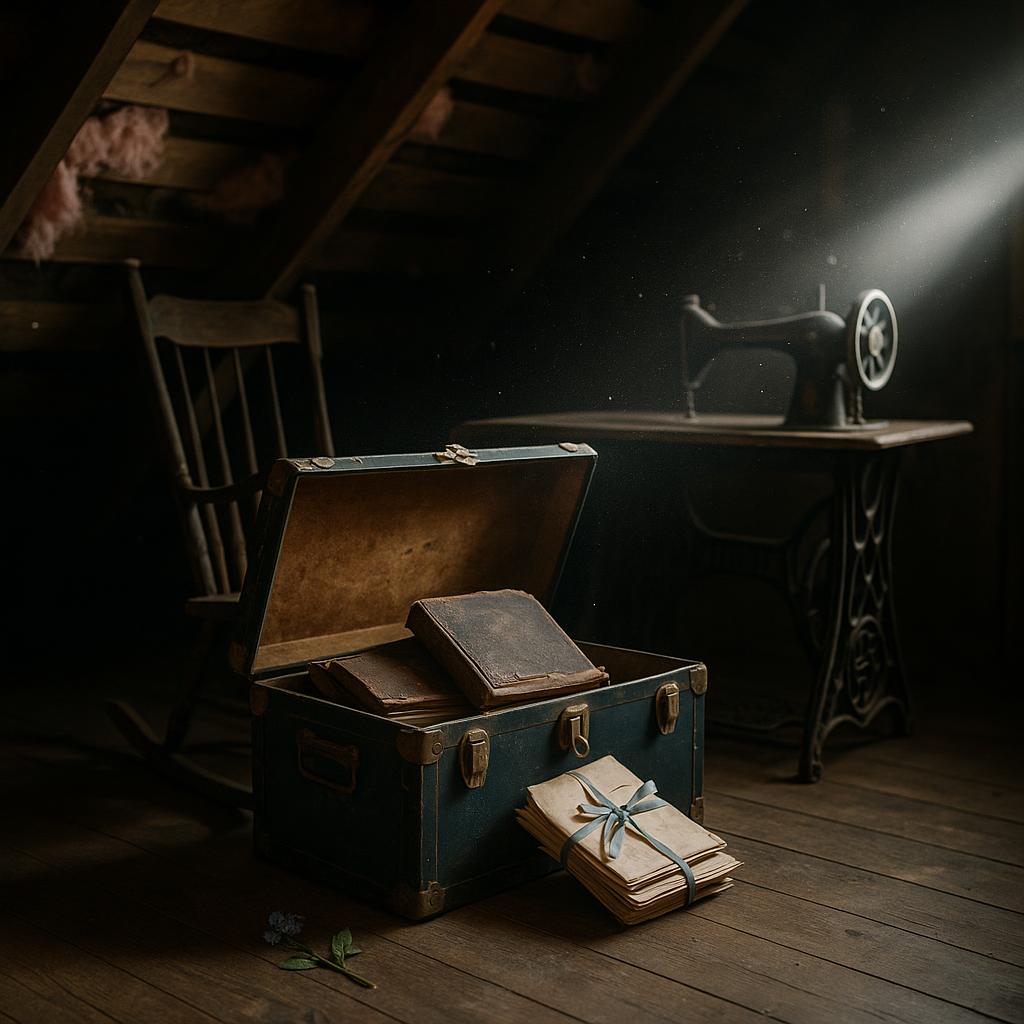 Image by RM AI
Image by RM AI
The Young Larkins
I settled into my favorite armchair, the photo album heavy on my lap. My hands trembled slightly as I opened the cover, feeling like an intruder in someone else's memories. There they were on the very first page—Harold and Edith Larkin on their wedding day in 1962. My breath caught in my throat. The confused, frail woman I visited every Friday was unrecognizable in this photo. Young Edith was stunning with dark, glossy hair and a smile that radiated confidence. Harold stood tall beside her, lean and handsome in his dark suit, looking at her with such naked adoration it made my chest ache. I ran my finger gently over their faces, these strangers who once lived between the same walls that now sheltered me. Page after page revealed their life unfolding—a housewarming party in this very living room, Harold painting the kitchen cabinets, Edith pregnant and glowing in the backyard. I couldn't stop turning the pages, each one pulling me deeper into their story. It felt wrong, like reading someone's diary, yet I couldn't tear myself away. These weren't just old photos of people I didn't know; this was the history of my house, the ghosts whose memories had been keeping me awake at night. What I found when I reached the middle of the album, however, made me gasp out loud and nearly drop my cup of tea.
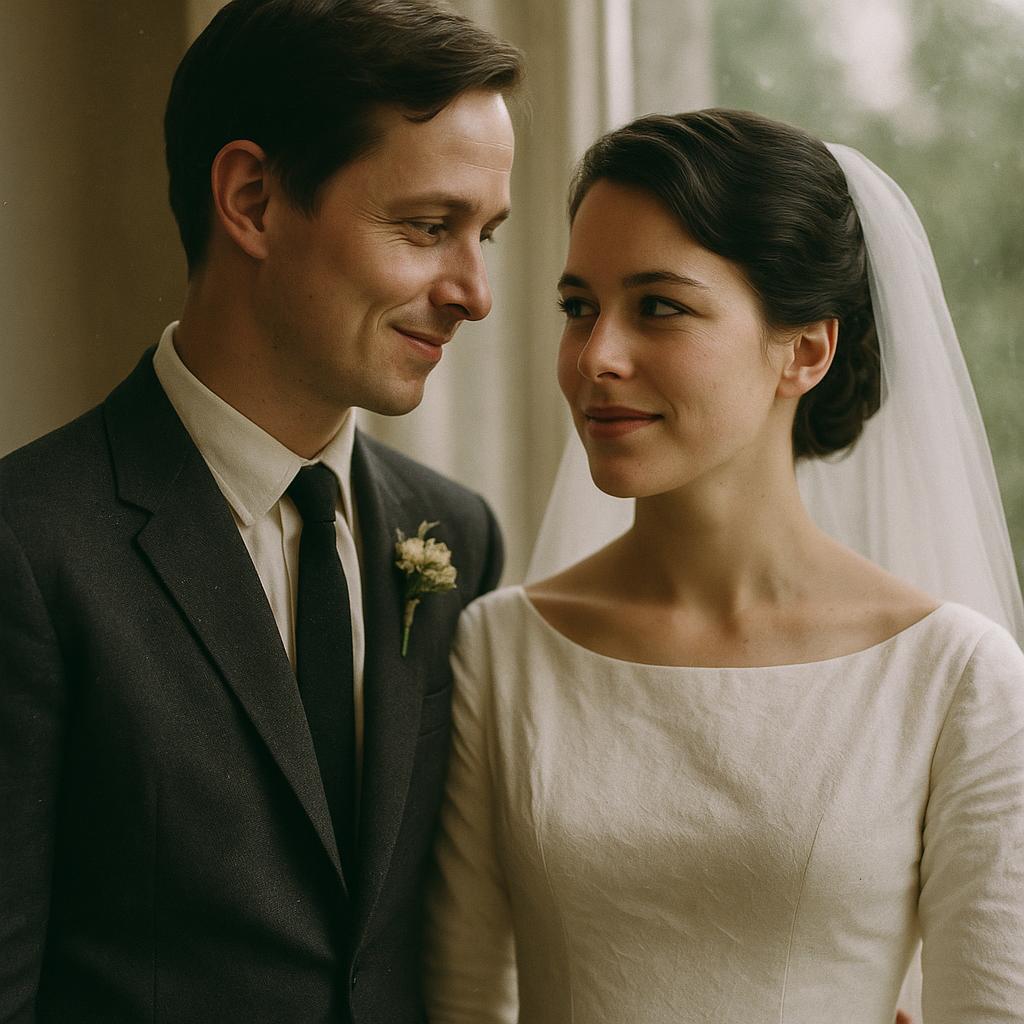 Image by RM AI
Image by RM AI
The House Through Time
I carefully turned the pages of the second album, my heart skipping as I recognized the very house I now called home. There they were—Harold and Edith Larkin moving into this exact house in 1965. The front porch was unmistakable, though the door was painted a cheerful red instead of my sensible beige. The bay window in the living room looked exactly the same, framing a younger Harold as he proudly posed with a houseplant. But the kitchen—oh, the kitchen was so different! Bright yellow cabinets instead of my sterile white ones, with floral curtains that somehow made the small space feel sunny and alive. As I flipped through, I watched their life unfold between these walls. Edith, her belly round with child, standing by the stove. Then the same woman, tired but radiant, holding a tiny bundle wrapped in a blue blanket. A toddler with Harold's eyes and Edith's smile taking wobbly steps across the backyard—the very same patch of earth where I planned to plant tulips come spring. I traced my finger over these moments, these strangers who weren't strangers anymore. They'd laughed and cried and loved in these rooms, just as I had with George, just as I now did alone. It felt like watching a movie filmed on a set I knew intimately, every corner familiar yet transformed by different lives. I was so engrossed that I almost missed the small envelope that slipped from between the pages, yellowed with age and sealed with wax that had long since hardened.
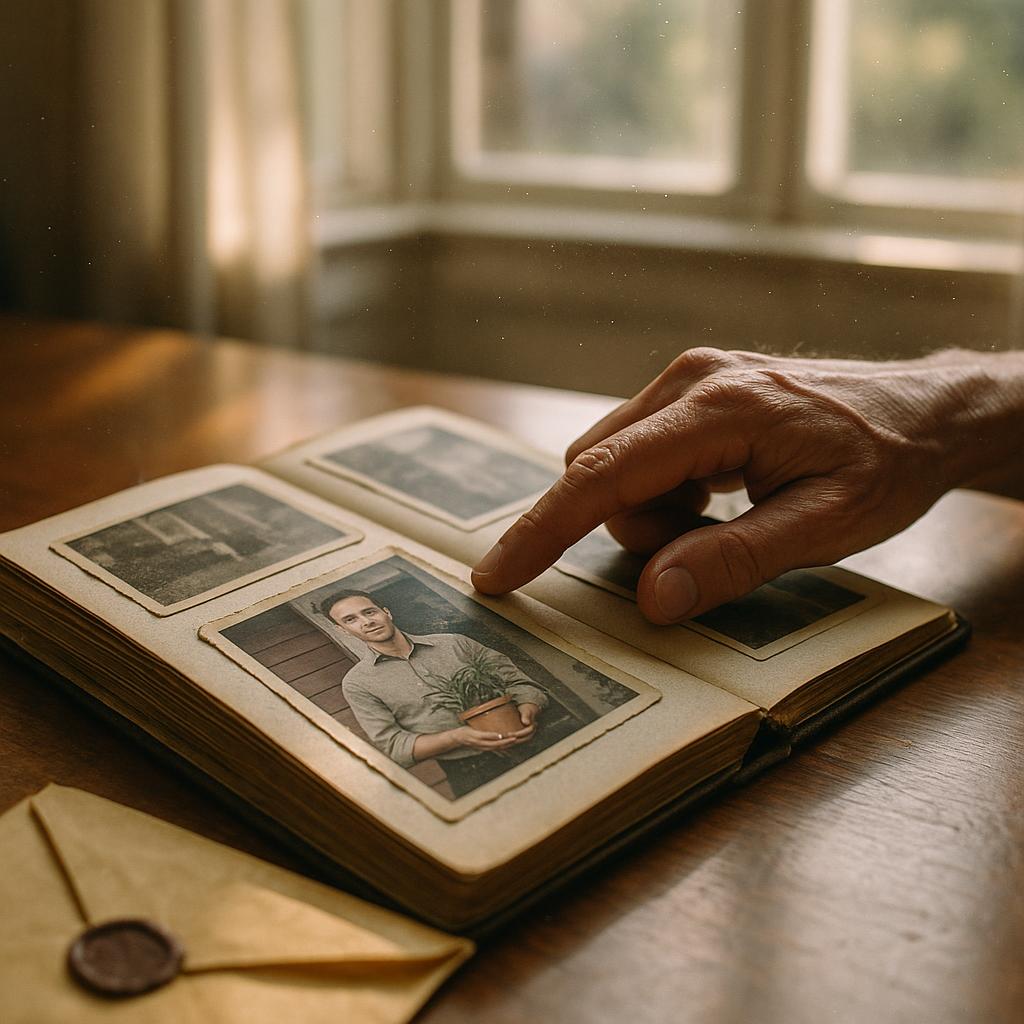 Image by RM AI
Image by RM AI
The Letters
With trembling hands, I untied the faded blue ribbon holding the stack of letters together. The paper felt delicate, like it might crumble under my touch—fragile memories preserved for decades. 'My dearest Edie,' each one began, and just seeing those words written in Harold's steady hand made my throat tighten. I carefully unfolded the first letter, dated June 1967, when Harold worked on an oil rig in the Gulf. 'The nights are endless without you,' he wrote, 'and I count the stars knowing you see the same ones.' Some letters were pages long, filled with dreams and promises. Others were just simple notes left on the kitchen table before he went to work—'Coffee's made. I love you more today than yesterday.' As I read through them, sitting cross-legged on my living room floor surrounded by these paper testimonies of love, I couldn't help but think of George. How he'd leave me silly drawings in my lunch bag even after thirty years of marriage. How he'd whisper 'See you in my dreams' every night before bed. Tears slipped down my cheeks, landing on Harold's words without smudging the ink—as if even my grief knew to respect these precious artifacts. I was so absorbed in their love story that I almost missed the most shocking letter of all, tucked at the very bottom of the stack, dated just two weeks before I bought the house.
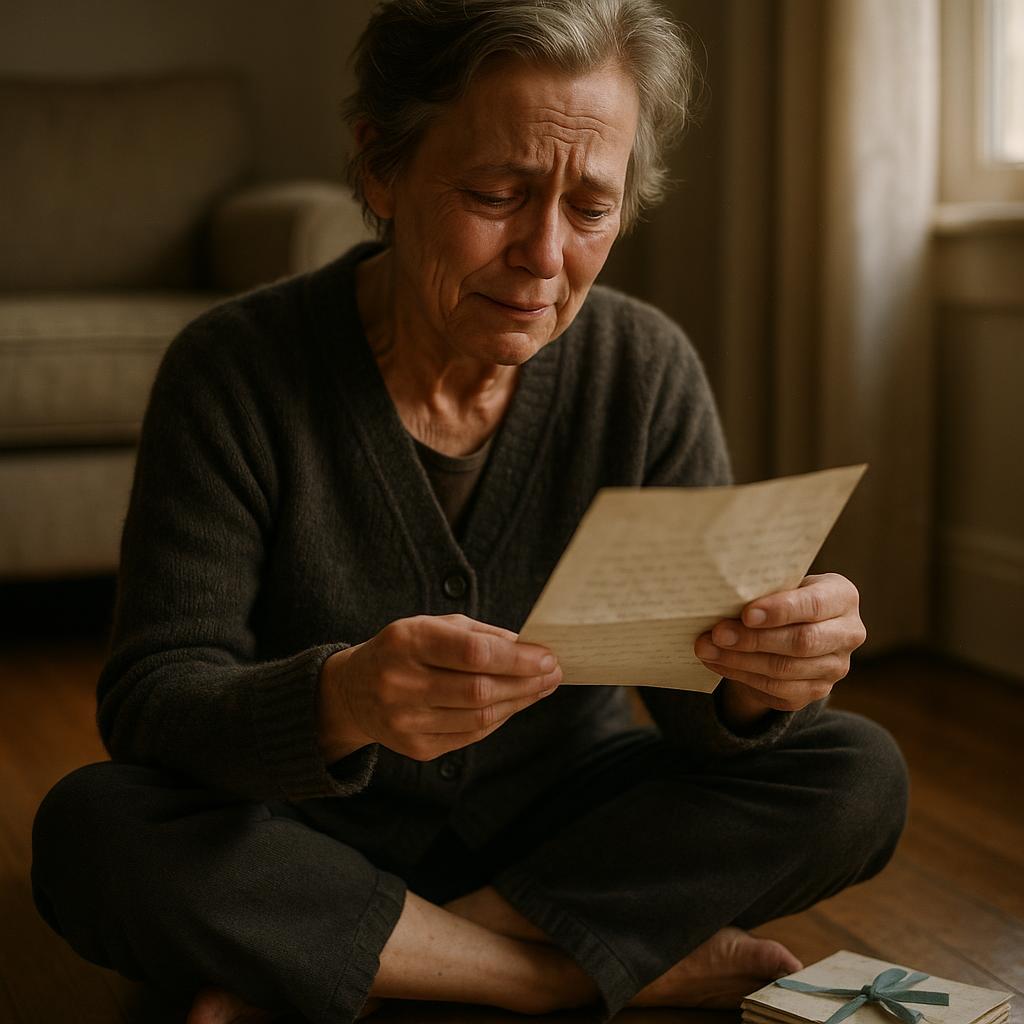 Image by RM AI
Image by RM AI
Returning Treasures
The next morning, I carefully packed the albums and letters into a tote bag, my heart fluttering with anticipation. When I arrived at Sunshine Haven, Mrs. Larkin was sitting by the window, her thin frame silhouetted against the morning light. 'I brought you something,' I said softly, pulling out the blue album first. Her eyes widened, recognition flickering across her face like a light switch being flipped. Her hands—those frail, paper-thin hands—reached out with surprising steadiness. 'My albums,' she whispered, voice cracking with emotion. 'You found them.' As she opened the first page, tears welled in her eyes. 'Harold,' she said, gently touching his face in their wedding photo. For that moment, the confusion that usually clouded her expression completely vanished. She was fully present, fully herself. 'I thought these were gone forever,' she said, looking up at me with such clarity it took my breath away. 'Thank you for bringing my Harold back to me.' We spent hours going through each page, each letter. She remembered details I never would have known—how Harold had sprained his ankle hanging those yellow kitchen curtains, how their daughter had taken her first steps right where my coffee table now stood. The nurses kept peeking in, amazed at her lucidity. One whispered to me, 'We haven't seen her this present in months.' As I was leaving, Mrs. Larkin grabbed my hand. 'There's something else in that trunk,' she said, her eyes suddenly urgent. 'Something you need to find.'
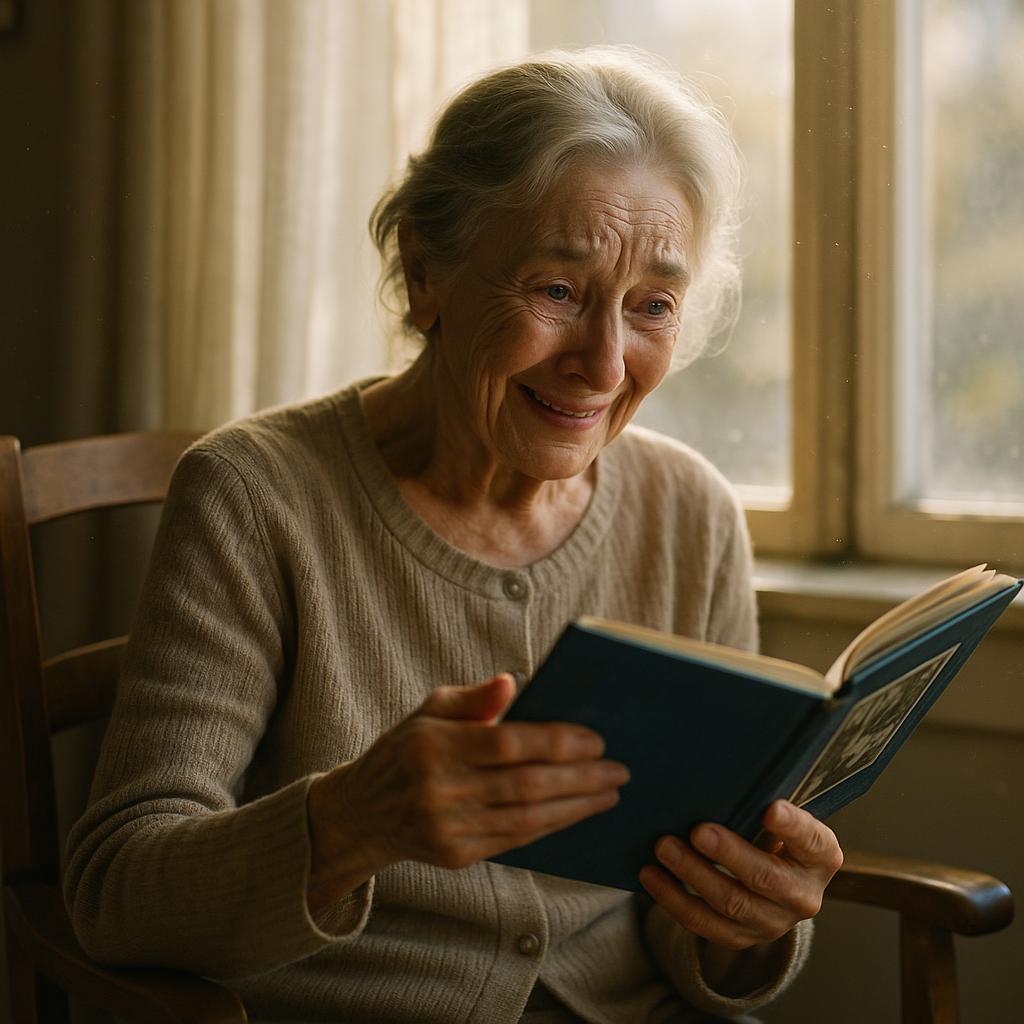 Image by RM AI
Image by RM AI
The Daughter's Call
I was just settling in with a cup of chamomile tea when my phone rang. The caller ID showed a number I didn't recognize, but something told me to answer it anyway. 'Hello?' I said, balancing the phone between my ear and shoulder. 'This is Nancy Larkin,' came a clipped voice. 'My mother's nurse tells me you've been bringing her things from my parents' house.' My stomach tightened. I'd been expecting this call, but not the accusatory tone. 'I found some photo albums in the attic,' I explained, trying to keep my voice even. 'They've really brightened her day.' There was a long pause before Nancy spoke again. 'I don't know why you're getting involved,' she said, her voice tight with something between anger and exhaustion. 'It just confuses her more.' I bit my tongue, swallowing the words that wanted to burst out—about abandonment and responsibility and basic human decency. Instead, I took a deep breath, remembering the dark circles under my own daughter's eyes when she visited with her colicky baby last month. 'I understand it must be difficult,' I said carefully. 'Caring for an aging parent is... complicated.' Another silence stretched between us, this one less hostile. 'You have no idea,' Nancy finally sighed, her voice cracking slightly. 'Fifteen years of watching her forget who I am, bit by bit.' Something in her tone made me wonder if there was more to this story than a daughter simply walking away from her mother—something buried as deeply as those albums had been in my attic.
 Image by RM AI
Image by RM AI
Nancy's Story
I sat in stunned silence as Nancy's voice cracked with emotion on the other end of the line. The bitterness I'd initially heard was dissolving into something raw and painful. 'You don't understand what it's been like,' she continued, her words tumbling out like she'd been holding them back for years. 'Years of her forgetting who I am, accusing me of stealing from her, calling the police because she thinks I'm an intruder.' I closed my eyes, thinking of Mrs. Larkin's gentle smile when I visited, trying to reconcile that with the woman Nancy was describing. 'I had to move her out of that house because she kept leaving the stove on, wandering into the street at night. I couldn't do it anymore.' Her voice broke completely then, and I heard what might have been a stifled sob. I thought about what I might have done in her shoes—the impossible choices, the slow heartbreak of watching someone you love disappear while still physically present. How many sleepless nights had Nancy endured before making that decision? How many times had she been hurt by a mother who no longer recognized her own daughter? I'd been so quick to judge her as the villain in this story, but maybe there were no villains here—just people doing their best with impossible circumstances. What Nancy said next, however, made me question everything I thought I knew about the Larkins and their history in my house.
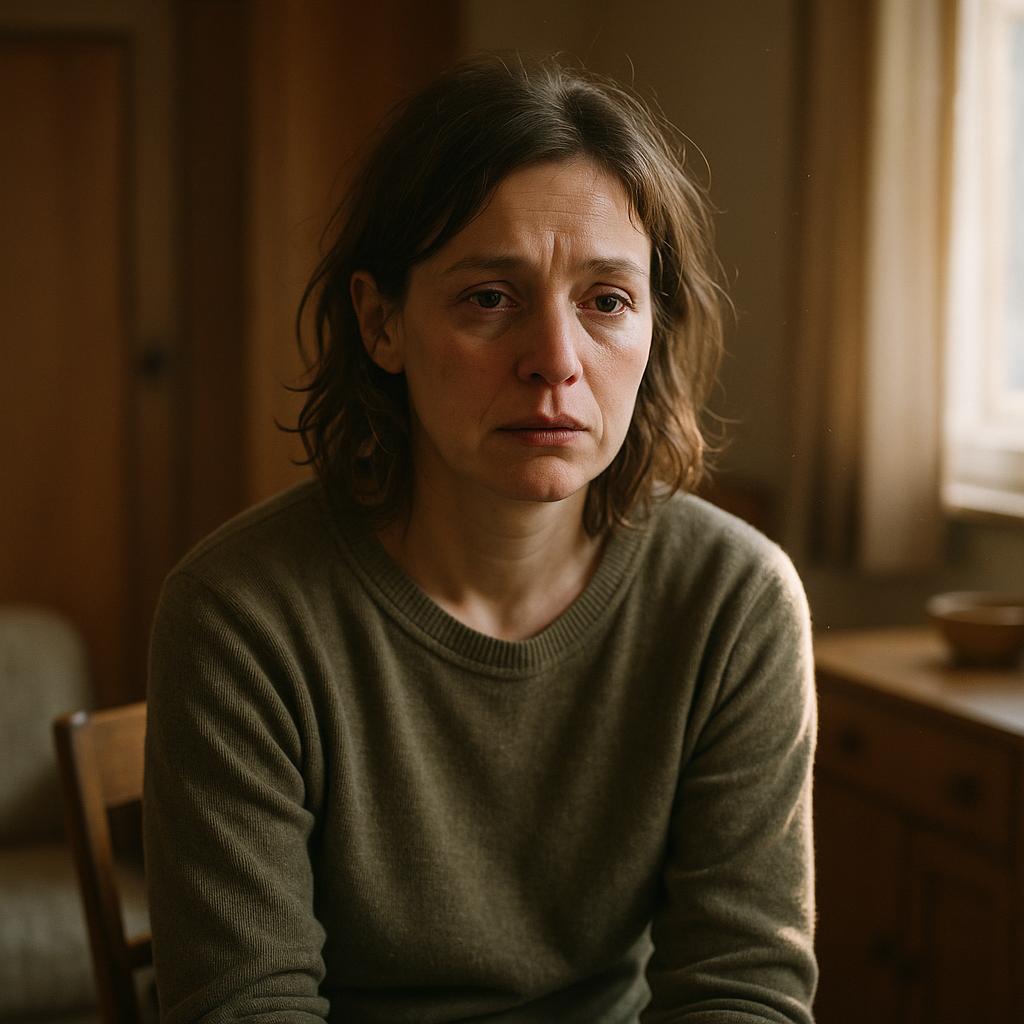 Image by RM AI
Image by RM AI
A Different Perspective
I sat there with the phone pressed to my ear, Nancy's words hanging in the air between us. For the first time, I saw myself in her—the weight of loving someone who's slipping away, piece by piece. I thought about my own daughter, Lisa, and how someday she might face these same impossible choices about me. Would she remember me as I am now, or only as the burden I might become? 'I'm not judging you,' I told Nancy softly. 'I just thought she might like to have her memories back.' The silence that followed felt heavy with years of guilt and grief. I could almost hear her thinking, weighing her words. 'Maybe I could visit next time you go,' Nancy finally said, her voice smaller than before. 'It's been a while.' I felt a flutter of hope in my chest. Maybe this house had been working its strange magic on all of us—not just connecting me to Mrs. Larkin, but reconnecting a daughter to her mother. 'I think that would mean the world to her,' I said, meaning it. As I hung up, I glanced at the embroidered towel hanging in my kitchen, those forget-me-nots catching the evening light. I wondered if Mrs. Larkin would remember her daughter when she saw her—and more importantly, if Nancy was prepared for the possibility that she wouldn't.
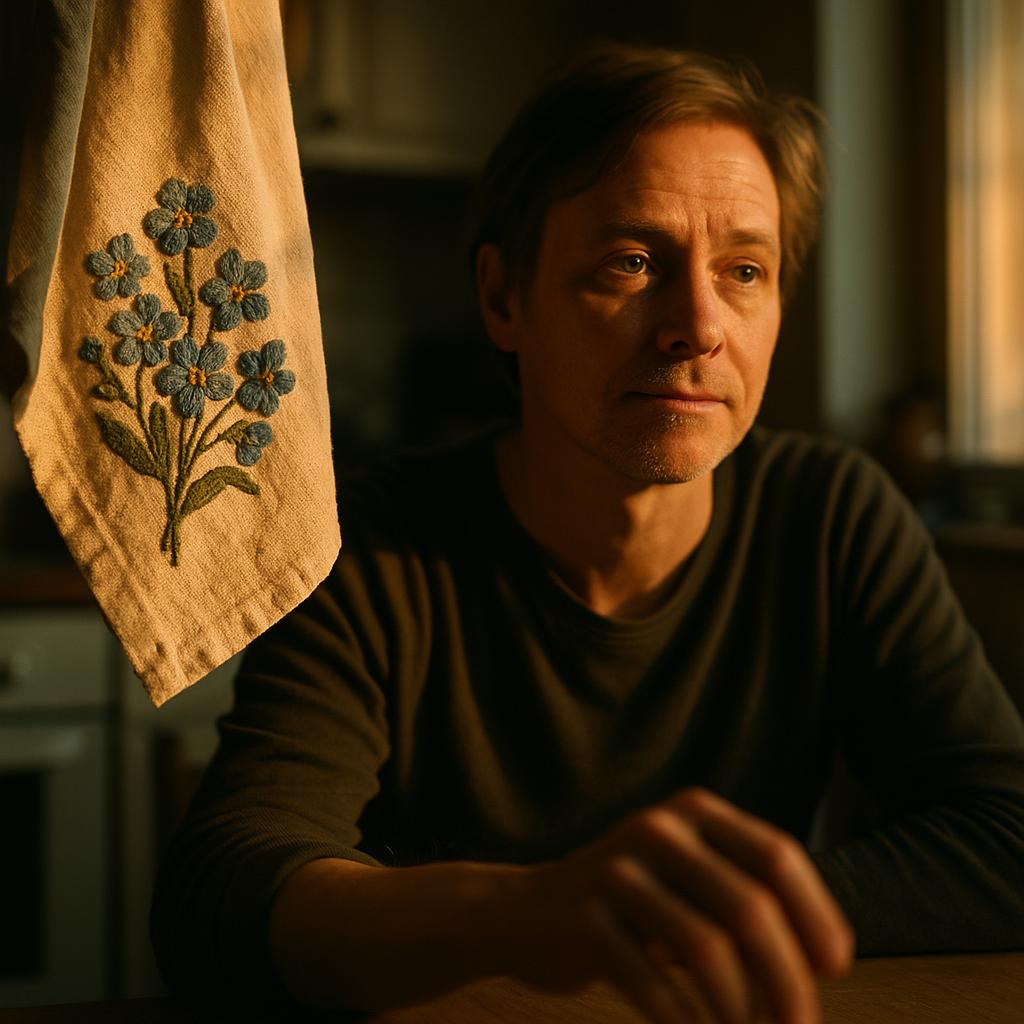 Image by RM AI
Image by RM AI
The Joint Visit
The following Friday arrived with a sky full of cotton-candy clouds and a knot in my stomach the size of Texas. Nancy was already waiting in the lobby when I arrived, looking like she'd aged a decade since our phone call. Her knuckles were white around her purse strap, and she kept checking her watch like she might bolt at any second. "I haven't seen her in eight months," she confessed as we walked down the hallway. "What if she doesn't..." She didn't finish, but she didn't need to. I squeezed her arm gently. Mrs. Larkin was by the window as usual, sunlight catching the silver in her thin hair. When we entered, she looked up with that familiar vacant smile. "Oh, it's the nice lady from my house," she said to me, then turned to Nancy with polite confusion. "And the nurse with the pretty red hair." I watched Nancy's face crumple like someone had punched her in the gut. Still, she sat down, arranging her features into something resembling calm. "Hi, Mom," she said softly. I pulled out the photo albums, opening to the wedding picture. Mrs. Larkin's eyes lit up at the sight of Harold, as they always did. But then something shifted as she turned the page to a photo of a little girl with Nancy's same auburn hair. She looked up at her daughter, then back at the photo. "Nancy?" she whispered, her voice suddenly clear as a bell. "My Nancy?" The moment hung between them like a soap bubble—beautiful, fragile, and impossible to hold onto. What happened next would change everything I thought I knew about memory, forgiveness, and the strange magic of this house that had brought us all together.
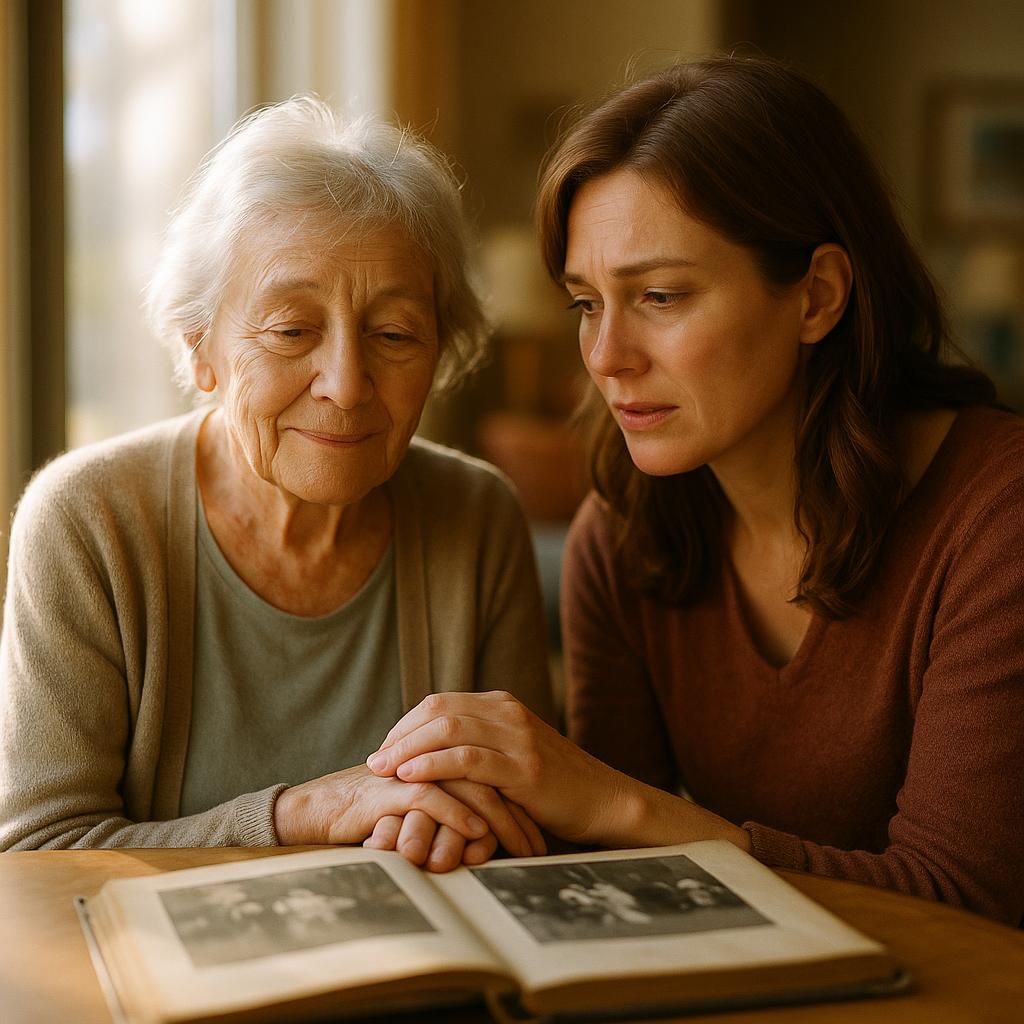 Image by RM AI
Image by RM AI
A Moment of Recognition
I stood in the hallway, my back pressed against the wall, trying to give them privacy while still close enough to hear the soft sobs coming from the room. 'Nancy?' Mrs. Larkin had whispered, her voice suddenly clear as a bell. 'My Nancy?' It was like watching a miracle unfold—this woman who often couldn't remember what she'd had for breakfast suddenly recognizing the daughter she hadn't seen in eight months. Nancy's composure crumbled completely as her mother reached out with trembling fingers to touch her face. I watched as they fell into each other's arms, Nancy pressing her cheek against her mother's silver hair, eyes squeezed shut in what looked like equal parts grief and relief. Tears streamed down both their faces, years of hurt and misunderstanding suspended in this fragile moment of connection. I slipped out then, feeling like an intruder in something sacred. As I walked down the hallway, I couldn't help but think of my own daughter, Lisa, and how easily relationships can fracture under the weight of illness and time. I wondered if the photo albums had somehow bridged a gap that words couldn't—if seeing those memories of her younger self had momentarily cleared the fog in Mrs. Larkin's mind. Whatever magic had happened in that room, I knew it wouldn't last forever. Dementia doesn't offer permanent reprieves. But as I sat in the waiting area, I realized sometimes a moment is enough to heal wounds that have been open for years.
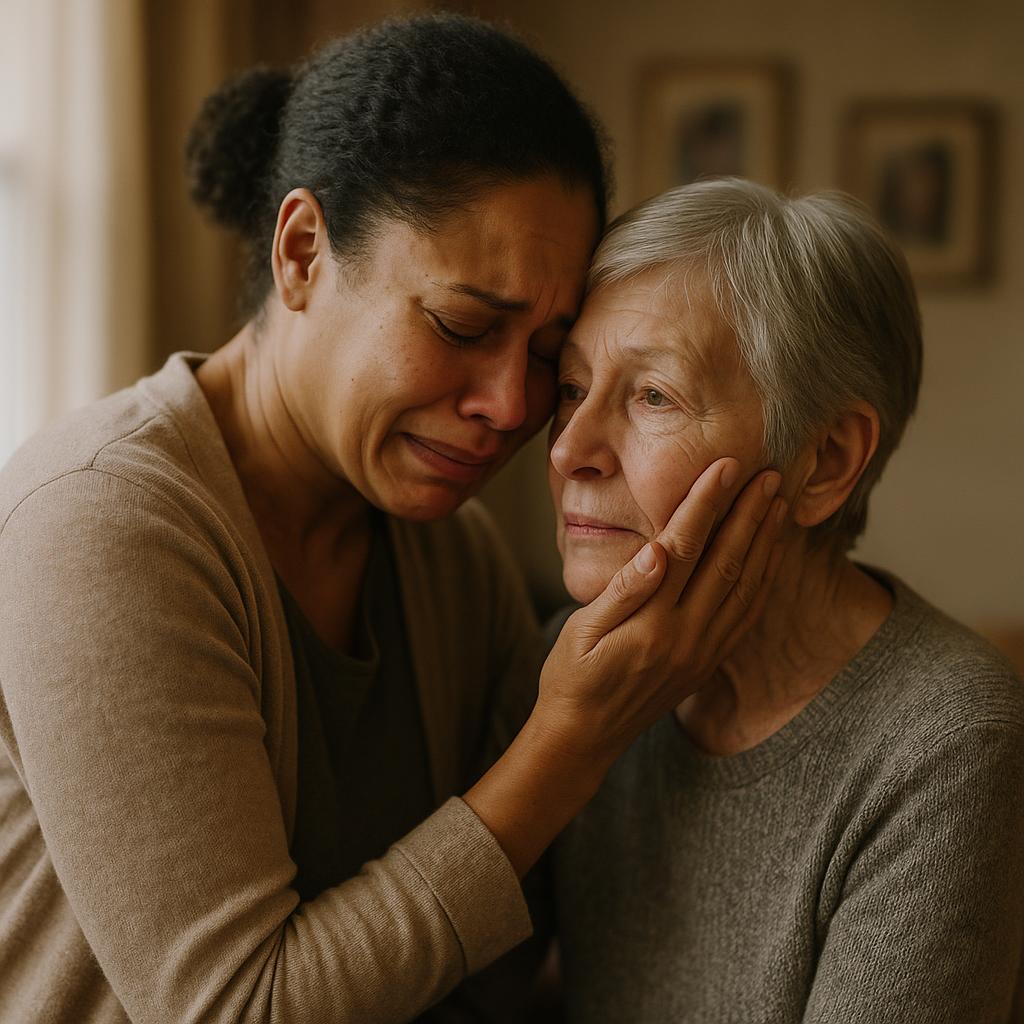 Image by RM AI
Image by RM AI
Coffee with Nancy
After the emotional reunion, Nancy and I found ourselves in the care home's cafeteria, two strangers connected by an elderly woman and a house that held both our stories. Nancy wrapped her hands around her coffee mug like she was trying to absorb its warmth, stirring it endlessly without taking a sip. Her eyes were still red-rimmed from crying. 'Thank you,' she finally said, her voice barely above a whisper. 'I'd forgotten who she used to be.' I nodded, understanding exactly what she meant. It's easy to lose sight of who people were before age and illness transformed them. Nancy's gaze grew distant as she told me about growing up in what was now my house—her mother's spectacular garden that once won neighborhood awards, her father's workshop in the garage where he built her a dollhouse that took him three months to complete. 'Mom used to make these incredible Sunday dinners,' she said, a small smile playing at her lips. 'The whole house would smell like pot roast and apple pie.' Her smile faded. 'It was a good home,' she said, finally taking a sip of her now-lukewarm coffee. 'Until it wasn't.' The way her voice dropped made me set down my own cup, sensing there was a darker chapter to the Larkin family story—one that might explain why those photo albums had been hidden away in my attic for all these years.
 Image by RM AI
Image by RM AI
The Hidden Room
That night, after Nancy left, her words about a 'secret room' kept echoing in my mind. I'd lived in this house for months and never noticed anything unusual in the basement. Around midnight, unable to sleep, I grabbed George's old flashlight and made my way down the creaky stairs. The basement had always given me the creeps—damp, musty, with shadows that seemed to move when you weren't looking directly at them. I ran my hands along the back wall shelves, feeling for anything unusual. Nothing. Just dusty jars of preserves and boxes of Christmas decorations. I was about to give up when my flashlight caught something odd—a slight difference in the paint color behind one section of shelving. Heart pounding, I pulled at the shelf unit. It resisted at first, then swung forward with a groan, revealing a small opening behind it. My breath caught in my throat. Nancy hadn't been exaggerating. There really was a hidden room! I squeezed through the narrow gap, my flashlight beam cutting through decades of undisturbed dust. The space was tiny, maybe six feet square, with a small wooden stool in one corner. But what made my skin prickle wasn't the room itself—it was what covered the walls. Hundreds of photographs, yellowed with age, carefully arranged in a mosaic pattern. And in the center, a single envelope addressed in Harold's familiar handwriting: 'For whoever finds this place—the truth about Edith.'
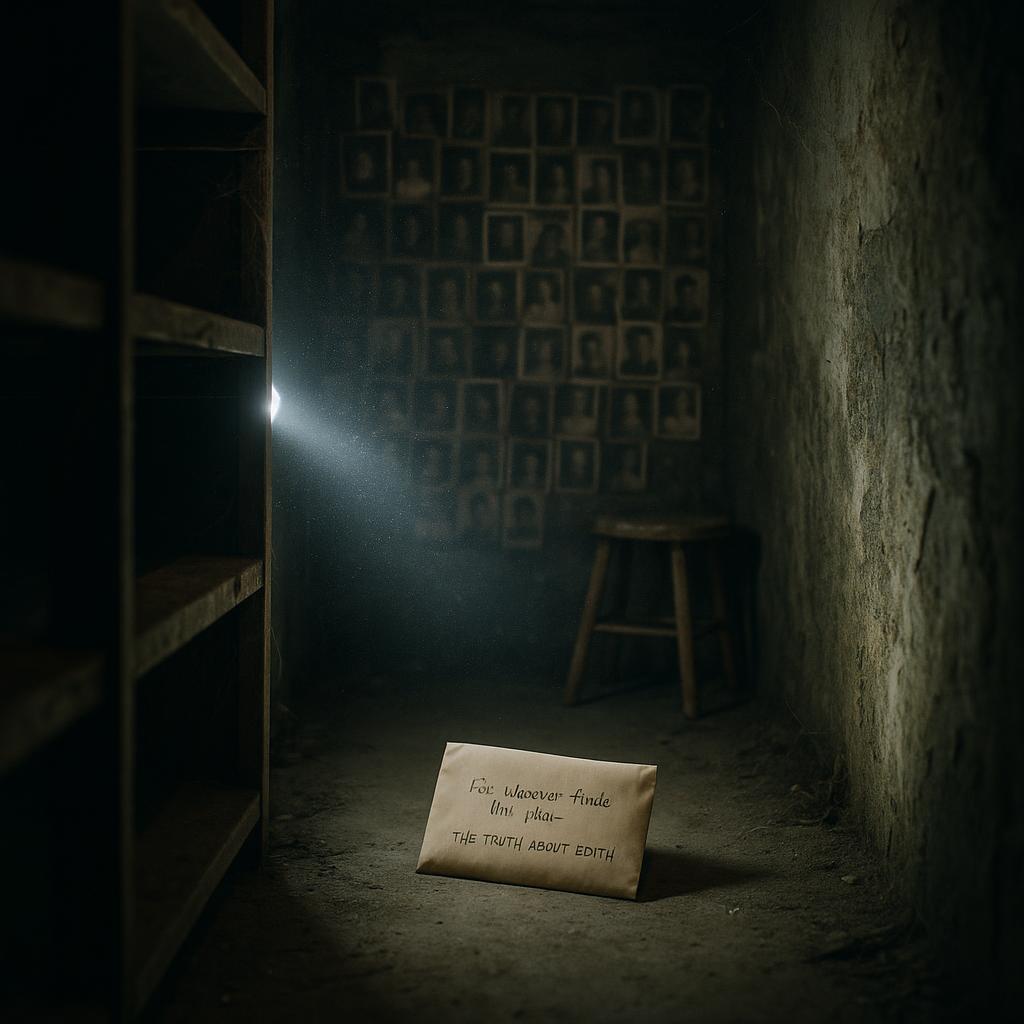 Image by RM AI
Image by RM AI
Harold's Hideaway
With trembling hands, I pushed the flashlight beam deeper into the hidden space. The dust particles danced in the light like tiny stars, making me cough as I squeezed through the narrow opening. It was like stepping into a time capsule—a small room, maybe five feet square, with wood-paneled walls that reminded me of rec rooms from the 1970s. A single light bulb hung from the ceiling on an old cord, and when I tugged the pull-chain, it surprisingly flickered to life, casting a warm yellow glow over Harold's secret hideaway. Most of the space had been cleared out, but in the corner sat a dusty record player, its arm frozen in time. Beside it, a small stack of vinyl albums leaned against the wall—Frank Sinatra, Nat King Cole, and one that made my heart skip: 'Songs for Edie,' handwritten on a plain sleeve. I felt like an archaeologist uncovering a lost civilization, or maybe more accurately, the private sanctuary of a man who needed escape. I ran my finger along the record player's arm, leaving a clean path through years of dust. This wasn't just a storage space—this was where Harold came to be alone with his thoughts and his music, away from... what exactly? The letter in my hand suddenly felt heavier. 'The truth about Edith,' it had said. I glanced back at the doorway, half-expecting to see Mrs. Larkin's confused face peering in, but there was only darkness beyond. Whatever secrets this room held, they had been waiting patiently for decades to be discovered.
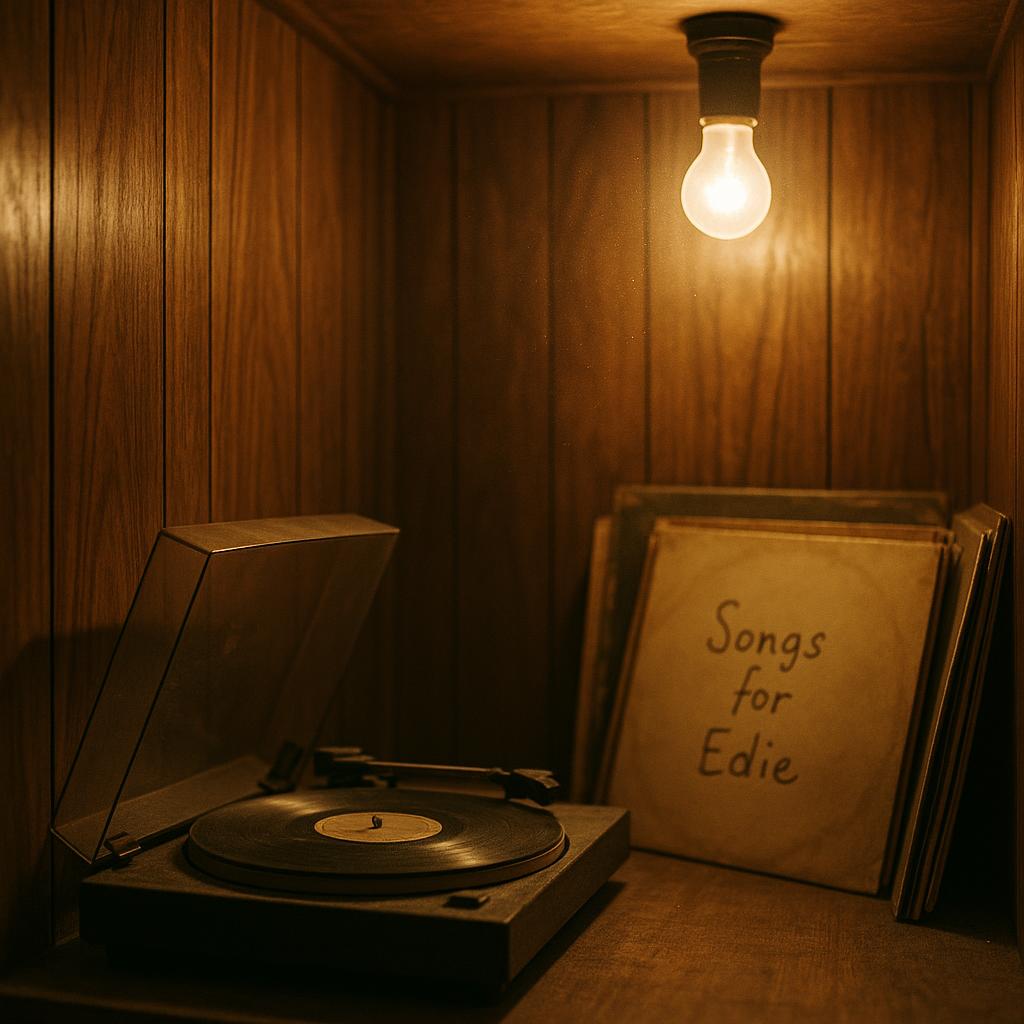 Image by RM AI
Image by RM AI
The Record Player
I carried the record player upstairs with the reverence of someone handling a historical artifact. It was heavier than it looked, solid in a way things aren't made anymore. After setting it on my kitchen counter, I spent nearly an hour cleaning it—gently wiping away decades of dust with a soft cloth, careful not to damage the delicate components. The vinyl albums I'd found were in surprisingly good condition, protected in their sleeves all these years. When I spotted Ella Fitzgerald among them, my heart did a little dance. Just last week, Mrs. Larkin had mentioned how she and Harold would twirl around this very kitchen to Ella's voice after dinner, dishes forgotten in the sink. With slightly trembling hands, I plugged in the player, placed the needle on the record, and held my breath. For a moment, there was just crackling static—then, like a voice from the past, Ella's smooth, honeyed tones filled my kitchen with 'Someone to Watch Over Me.' I closed my eyes, letting the music wash over me. In my mind, I could see them so clearly—Harold in his cardigan, Edith in a floral housedress, swaying together between the refrigerator and stove, lost in their own world. Without thinking, I found myself moving to the music, arms positioned as if holding an invisible partner. For just a moment, I swear I felt George's hand on the small of my back, guiding me through a turn. When I opened my eyes, I was alone—but the kitchen somehow felt fuller than it had since I'd moved in. That's when I noticed something peculiar about the record sleeve—a small tear along the seam, with what looked like the edge of a folded paper peeking out.
 Image by RM AI
Image by RM AI
Dancing with Ghosts
I stood in the middle of my kitchen, eyes closed, swaying to Ella's timeless voice as it filled the room. For a moment, I could almost feel George's hand on the small of my back, his breath warm against my ear as he hummed along. It was the first time since his passing that I could think of our kitchen dances without that crushing weight of grief. Instead, there was just... warmth. Like finding an old love letter you'd forgotten about. As I twirled slowly between the refrigerator and the stove—exactly where Harold and Edith must have danced decades before—I realized something profound: houses don't just hold our things; they hold our moments. Our laughter. Our tears. Our midnight dances. I wondered if someday, years from now, some other widow or widower would move into this house and feel us all—George and me, Harold and Edith—like friendly ghosts lingering in the corners. Would they sense the love that had filled these rooms? Would they hear phantom music late at night and find themselves swaying without knowing why? I opened my eyes, half-expecting to see spectral couples dancing alongside me. The kitchen was empty, of course, but somehow it felt fuller than it had since I'd moved in. That's when I noticed something I hadn't seen before—a small tear in the record sleeve, with what looked like the corner of a yellowed paper peeking out.
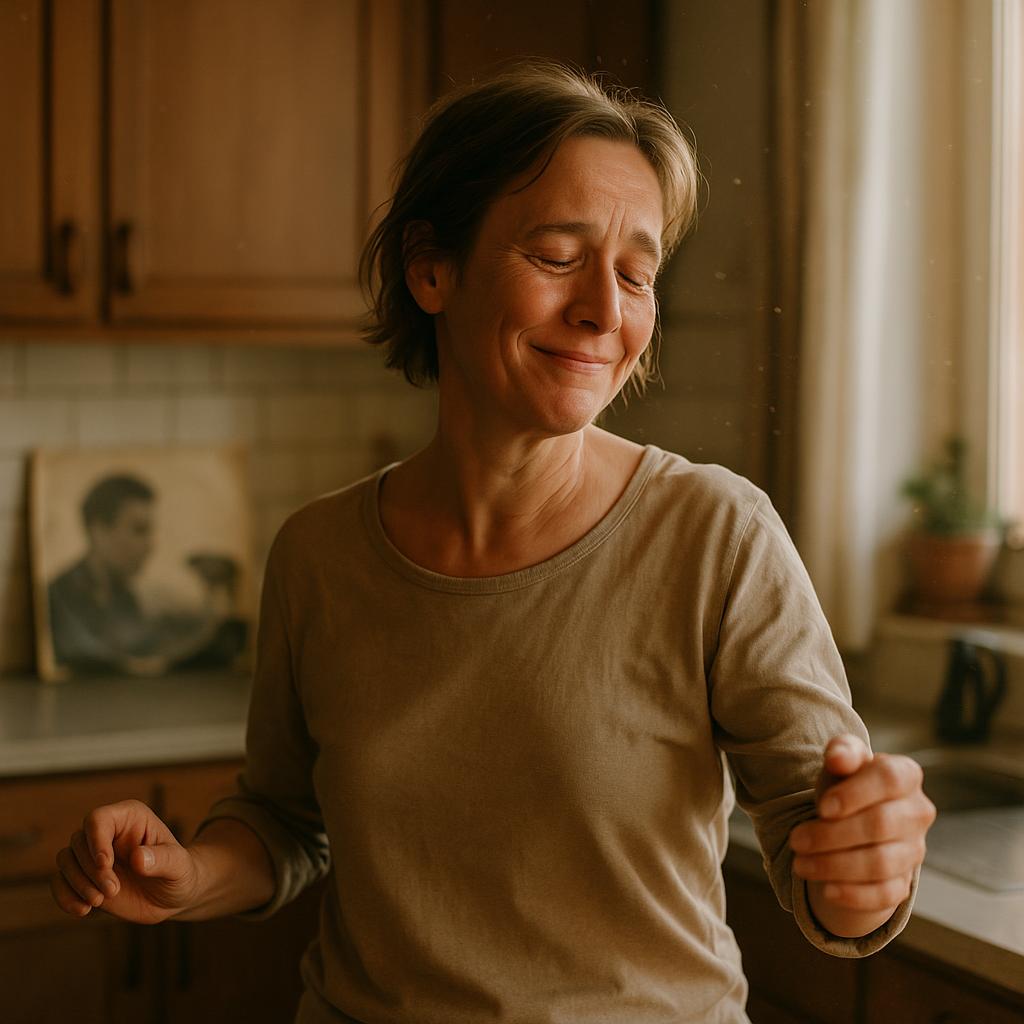 Image by RM AI
Image by RM AI
The Coin Collection
Behind the record player, tucked away like a forgotten memory, I discovered a small wooden box with intricate carvings along its edges. When I opened it, the soft light caught on something metallic—a collection of old coins nestled in faded velvet. Some were tarnished with age, others still gleamed with surprising brilliance. I brought these to Mrs. Larkin on my next visit, along with the records we'd found. Her eyes lit up in a way I hadn't seen before, even during her moment of recognition with Nancy. 'Harold's Mercury dimes,' she whispered, her papery fingers trembling as she ran them over the coins. 'He started collecting when he was just a boy. His father gave him his first one after the war.' Nancy, who was sitting beside her mother, looked genuinely shocked. 'I thought Dad sold those years ago,' she said, leaning forward to examine them. 'He always said they'd put me through college someday.' Mrs. Larkin smiled that mysterious smile of hers—the one that made me wonder how much she truly remembered and how much was lost in the fog of her mind. 'He couldn't bear to part with them,' she said simply. 'Said they reminded him of simpler times.' As Nancy held one up to the light, I noticed something odd etched into the wooden bottom of the box—what looked like a series of numbers and letters that didn't seem random at all.
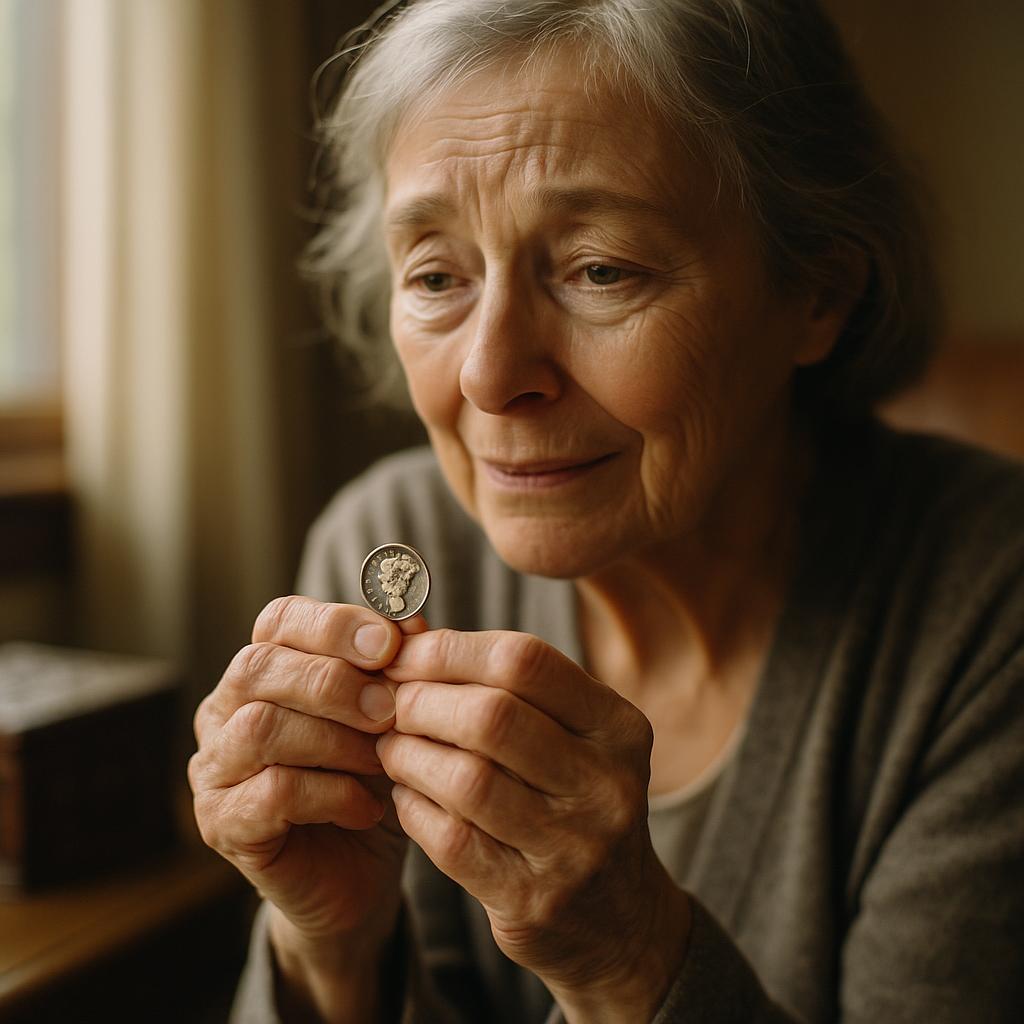 Image by RM AI
Image by RM AI
The Garden Plan
Nancy started visiting her mother more regularly after that emotional reunion, and I was thrilled to see their relationship slowly mending. One Tuesday afternoon, she arrived at my door clutching a stack of worn notebooks. "I found these while cleaning out my garage," she explained, handing them to me. "Mom's gardening journals. I thought maybe you'd like to see what she planted in your yard." That night, I lost myself in Edith Larkin's meticulous world of flowers and seasons. The journals were works of art—hand-drawn maps of flower beds with precise measurements, notes about soil conditions, and little observations about which varieties thrived in which spots. "Tulips struggle by the oak—too much shade," she'd written in neat cursive. "Daffodils along fence line bloom earliest." Suddenly, the seemingly random patches of perennials that had surprised me throughout spring and summer made perfect sense. They weren't random at all—they were Edith's carefully orchestrated symphony of colors and textures, planned years ago by hands that could no longer hold a trowel. The next morning, I stood in my yard with one of her journals, matching her drawings to what remained of her garden. Near the kitchen window, exactly where she'd marked it, I found a struggling rosebush nearly choked by weeds. As I knelt to clear around it, my trowel hit something solid buried in the soil—something that definitely wasn't a rock.
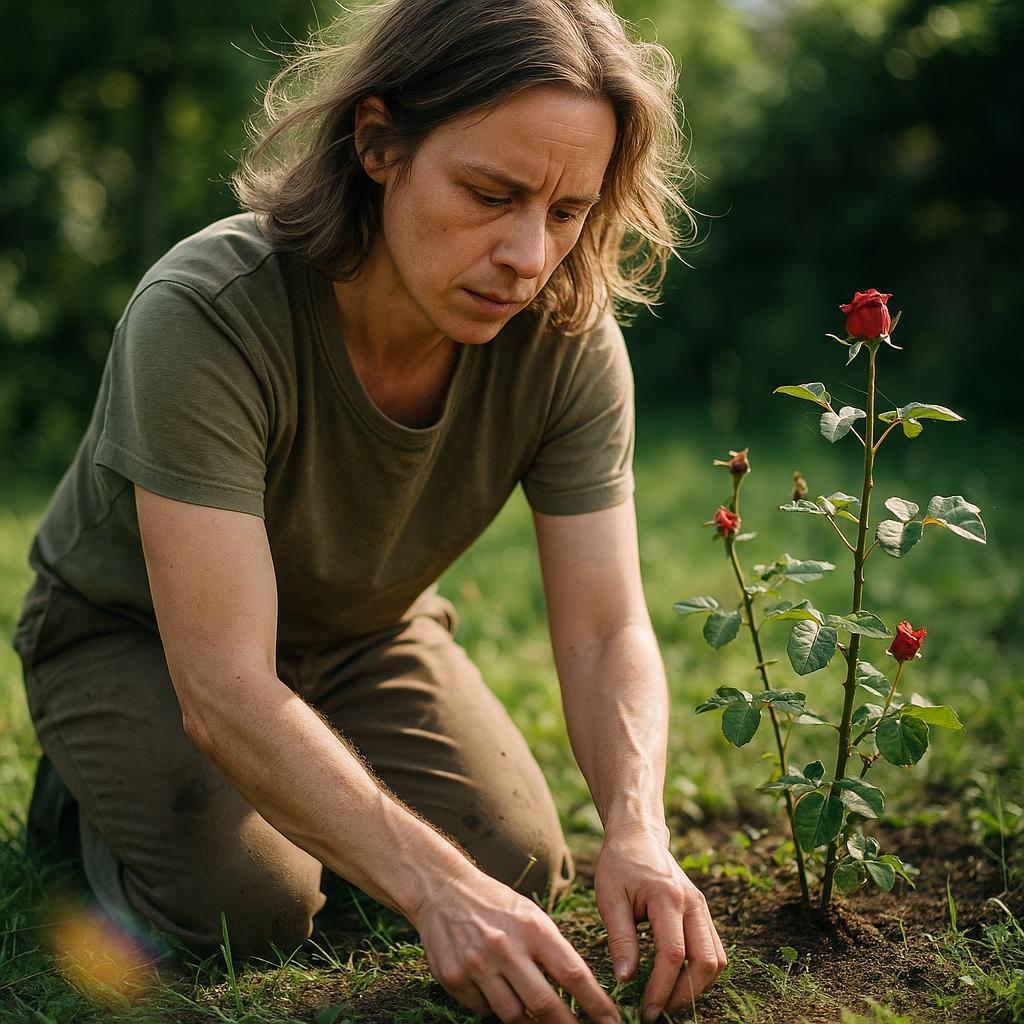 Image by RM AI
Image by RM AI
Spring Planting
When spring finally arrived, I found myself doing something I never thought I would—following Edith's garden journals like they were sacred texts. Me, Tanya, the woman whose houseplants had funeral services rather than birthdays. George would have doubled over laughing. 'Didn't you kill a cactus once?' he would have teased. I smiled at the memory as I knelt in the soft earth, carefully placing tulip bulbs exactly where Edith had marked them in her meticulous diagrams. Carl came over most mornings to help, his weathered hands surprisingly gentle with the delicate seedlings. 'George would be shocked,' he chuckled one afternoon, wiping sweat from his brow. 'Didn't you always say plants died just looking at you?' I laughed, feeling the warm sun on my back. 'People change, Carl. Sometimes it just takes the right motivation.' And my motivation was all around me—in the journals filled with Edith's elegant handwriting, in the mysterious box I'd found buried near the rosebush, in the way Mrs. Larkin's eyes had lit up when I showed her photos of the garden coming back to life. As I pressed the last bulb into the soil, I realized I wasn't just planting flowers—I was continuing a story that had started long before me. I was keeping Edith's memory alive, one bloom at a time. That evening, as I washed the dirt from under my fingernails, I noticed something peculiar about the rosebush I'd uncovered—it wasn't just any rose, but a rare variety that, according to Edith's notes, shouldn't have survived our harsh winters at all.
 Image by RM AI
Image by RM AI
The Garden Party
By mid-May, the garden had transformed into a kaleidoscope of colors that would have made Edith proud. Tulips stood at attention along the walkway, daffodils nodded in the breeze by the fence, and that mysterious rosebush had sprouted buds that promised spectacular blooms. I couldn't keep this resurrection to myself. After weeks of phone calls and paperwork, the care home finally agreed to let Mrs. Larkin visit. Nancy handled most of the arrangements, promising to supervise her mother the entire time. The morning of what I'd started calling 'The Garden Party,' Carl helped me set up a comfortable chair under the shade of the oak tree—positioned perfectly so Mrs. Larkin could see the entire garden panorama. When the care home van pulled up, my heart was doing gymnastics in my chest. Mrs. Larkin emerged slowly, leaning on Nancy's arm, her eyes squinting in the bright sunlight. For a terrifying moment, she looked confused, and I worried she wouldn't recognize anything. Then her gaze fell on the garden, and her entire face transformed. 'My flowers,' she whispered, her voice stronger than I'd heard in months. 'You brought them back.' As we settled her into the chair with a light blanket over her knees, she reached out to touch a nearby tulip with trembling fingers. 'Harold would love this,' she said, and for once, her eyes were completely clear and present. 'He always said gardens were memories you could walk through.' I knelt beside her chair, fighting back tears as she patted my hand. What she said next made the hairs on my arms stand up—something that couldn't possibly be a coincidence.
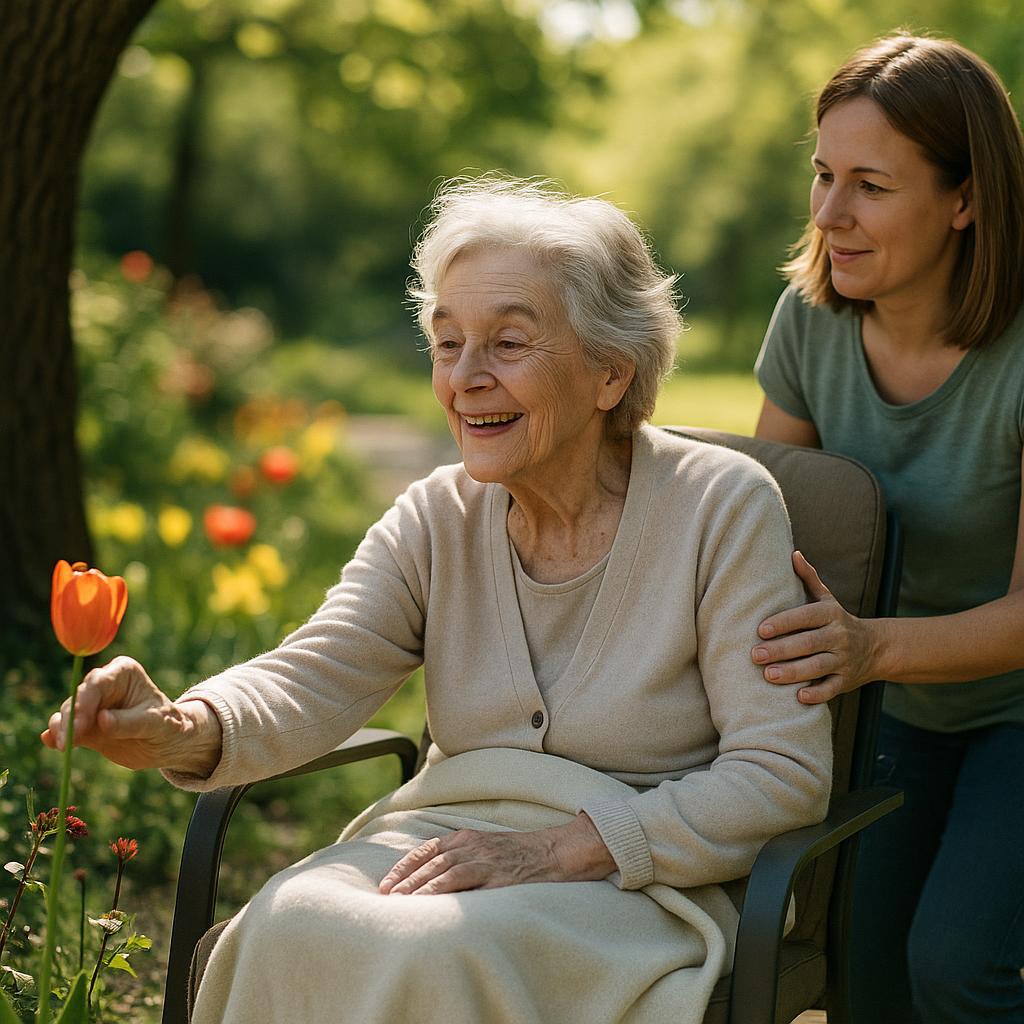 Image by RM AI
Image by RM AI
The Kitchen Dance
After our time in the garden, we moved inside, the afternoon sun casting long shadows through the kitchen windows. 'Let's have some music,' I suggested, pulling out Harold's record collection. When the first notes of Ella Fitzgerald filled the room, something magical happened. Mrs. Larkin, who had needed Nancy's help just to walk from the car, suddenly straightened her back and held out her arms, swaying slightly to the rhythm. The gesture was so unexpected, so full of muscle memory, that we all froze for a moment. Then Carl, bless his heart, stepped forward without hesitation. 'May I have this dance, Edith?' he asked with a formal little bow that made her giggle like a schoolgirl. He took her fragile hands in his weathered ones, and they began to move together, a slow, gentle waltz between my refrigerator and stove. Nancy pressed her hand to her mouth, tears streaming down her face as she watched her mother transform before our eyes. I stood beside her, my own vision blurring. 'Dad and Mom used to dance here every night after dinner,' Nancy whispered. 'I'd forgotten.' For those few precious minutes, dementia loosened its cruel grip. Mrs. Larkin wasn't lost in confusion—she was exactly where she belonged, dancing in her kitchen to Ella's velvet voice. When the song ended, she looked directly at me with startling clarity and said, 'He buried it under the third step, you know. Harold never trusted banks after '29.'
 Image by RM AI
Image by RM AI
The Midnight Visitor Returns
I was just settling into bed, George's old flannel pajamas wrapped around me like a hug, when my phone lit up with that now-familiar ping. Another motion alert. My heart did that little stutter-step it always does when technology catches you off guard at midnight. I tapped the notification, expecting maybe a raccoon or neighborhood cat. Instead, there she was—Mrs. Larkin, standing on my porch in her nightgown and slippers, a cardigan thrown hastily over her shoulders. Somehow, she'd escaped the care home again, drawn back to this house like a moth to flame. This time, though, I didn't reach for George's golf club. I didn't feel that cold fear crawling up my spine. Instead, I felt something like... understanding. I hurried downstairs, flipping on lights as I went, and opened the front door. 'Edith,' I said gently, using her first name. 'Come inside, honey. It's cold out there.' Her eyes, usually clouded with confusion, seemed clearer in the porch light. 'I heard the music,' she said simply. 'Harold and I always dance on Thursdays.' I took her arm and guided her into the warmth of the house, noticing how she instinctively turned toward the kitchen—where she and Harold had danced all those years. As I called Nancy to let her know her mother was safe with me, I watched Mrs. Larkin run her fingers along the countertop, humming softly to herself. What I didn't tell Nancy was what her mother had whispered to me as I helped her into a chair: 'I remember where we hid it now. All of it.'
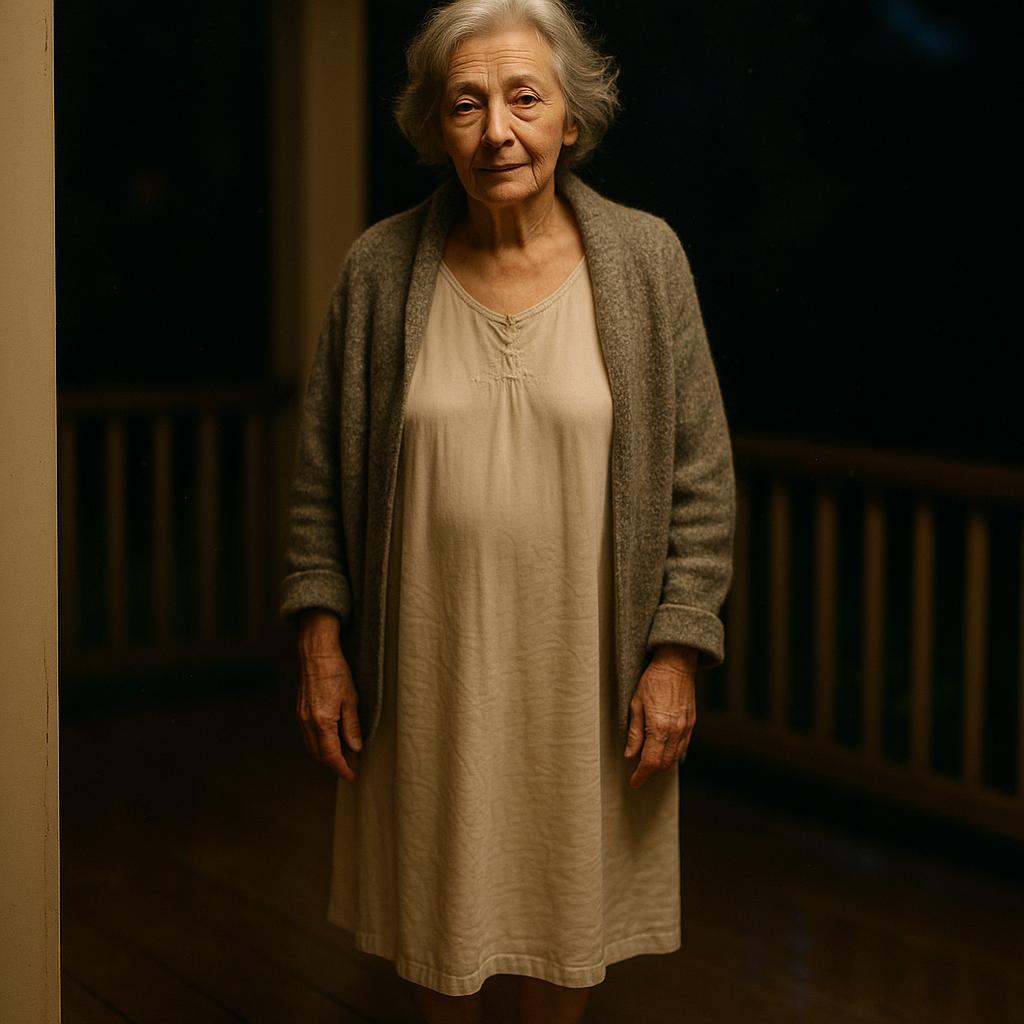 Image by RM AI
Image by RM AI
A Difficult Decision
Nancy burst through my front door, her face a mixture of panic and exhaustion. Her hair was disheveled, and dark circles shadowed her eyes like bruises. 'This is the third time in two weeks, Tanya,' she said, collapsing into a kitchen chair while glancing at her mother, who was now peacefully dozing in my living room armchair. 'The care home called me at 2 AM. They didn't even notice she was gone until the night shift change.' I placed a mug of chamomile tea in front of her, wishing I had something stronger to offer. 'She keeps coming back here,' I said softly. 'It's like this house is calling to her.' Nancy rubbed her temples, tears threatening to spill. 'I can't keep doing this. I have my own family, my job... but that place clearly can't keep her safe.' We sat in silence for a moment, the weight of the situation settling between us like an unwelcome guest. 'What about... what if she stayed here?' I heard myself say, the words surprising me as much as Nancy. Her head snapped up. 'With you? Tanya, you barely know her. And her condition—it's not getting better.' I nodded, understanding the enormity of what I was suggesting. 'I know. But this house remembers her, Nancy. And sometimes, she remembers it too.' As we discussed possibilities—in-home care, splitting responsibilities, the financial implications—I couldn't help but wonder if I was being foolish or following some deeper purpose that had been set in motion the moment I bought this house. What I didn't tell Nancy was that Mrs. Larkin had whispered something to me before falling asleep: 'The third step holds the answer to everything.'
 Image by RM AI
Image by RM AI
An Unexpected Offer
I surprised myself by saying, 'What if she stayed here? Just for a while.' The words hung in the air between us, and I watched Nancy's expression shift from exhaustion to disbelief. 'You can't be serious,' she said, staring at me like I'd suggested we fly to the moon. 'She needs constant supervision, Tanya. She wanders, she forgets to eat...' I nodded, understanding the enormity of what I was proposing. At 64, I'd been looking forward to a quiet life after George, not becoming a caretaker. But something about this felt right. 'I'm here all the time,' I explained, my voice growing more confident. 'Carl's right next door. And this house—' I gestured around us, to the walls that had witnessed decades of Edith's life, '—it's where she feels safe. Maybe that counts for something.' Nancy's eyes filled with tears, whether from gratitude or the overwhelming burden she'd been carrying, I couldn't tell. 'You barely know her,' she whispered. I thought about the garden journals, the record player, the dance in the kitchen. I thought about how this house had brought us together in some cosmic twist of fate. 'Sometimes,' I said softly, 'the people who come into our lives unexpectedly are the ones we need the most.' As Nancy considered my offer, I couldn't help but wonder if I was being guided by George's spirit or simply by my own need to matter to someone again. What I didn't tell Nancy was that I'd already started researching home care options and had even cleared out the second bedroom, as if some part of me had known all along that Edith Larkin was meant to come home.
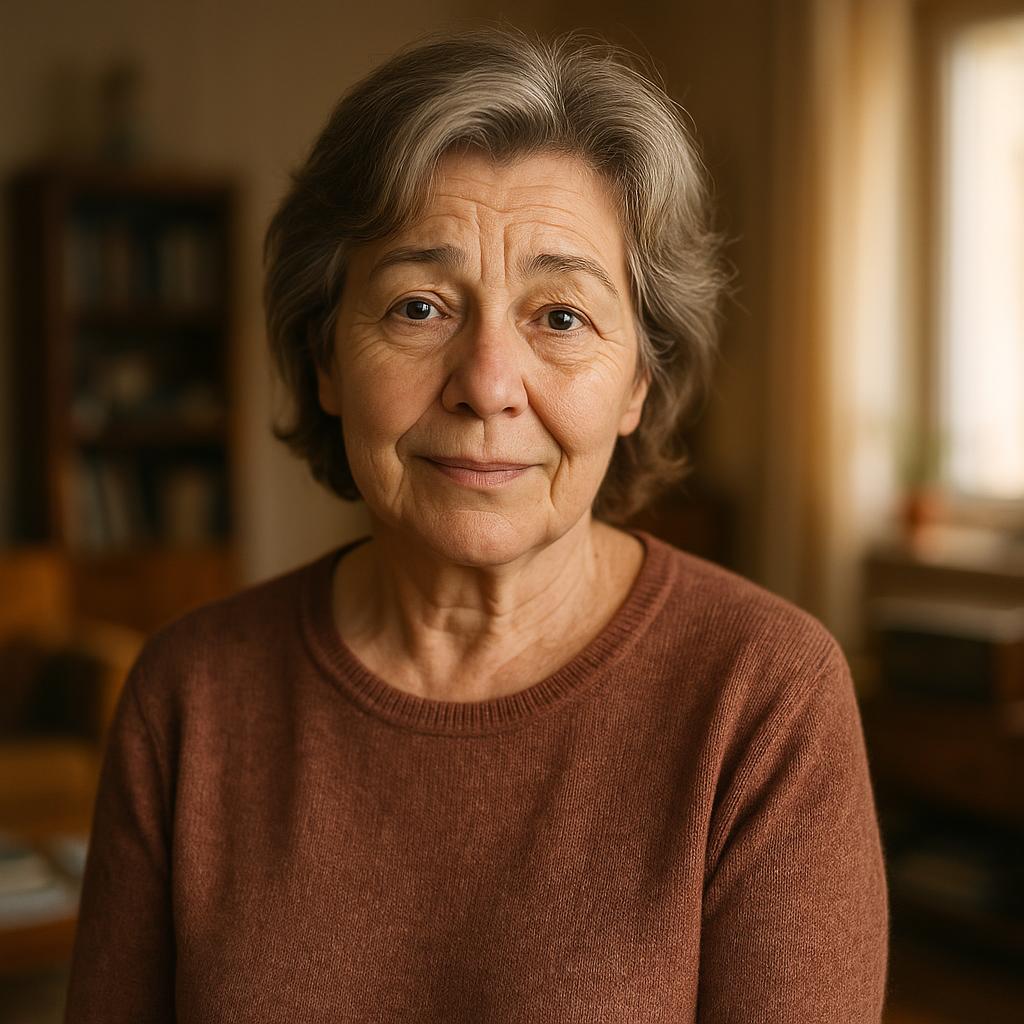 Image by RM AI
Image by RM AI
The Trial Period
We settled on a two-week trial period, which felt both terrifyingly short and impossibly long. Nancy handled the paperwork side of things, arranging for a home health aide named Marjorie to come during weekdays while I'd take the night and weekend shifts. I spent an entire day transforming my craft room—George would've called it my 'abandoned hobby graveyard'—into a proper bedroom for Mrs. Larkin. I hung her family photos on the walls, placed her favorite armchair by the window, and made the bed with her own floral bedspread that Nancy had brought over. 'It smells like home,' Mrs. Larkin whispered when I showed her the room, running her fingers over the familiar quilt. That first night, I barely slept, listening for any sound of confusion or wandering. But when I tiptoed to her door at dawn, I found her still peacefully asleep, her face relaxed in a way I hadn't seen before. She slept through until 8 AM—a minor miracle according to Nancy, who said her mother hadn't had a full night's sleep in months. As I stood watching her breathe steadily, morning light filtering through the curtains, I wondered if the house itself was somehow soothing her troubled mind. Or maybe it was something else entirely—something hidden beneath that mysterious third step she kept mentioning.
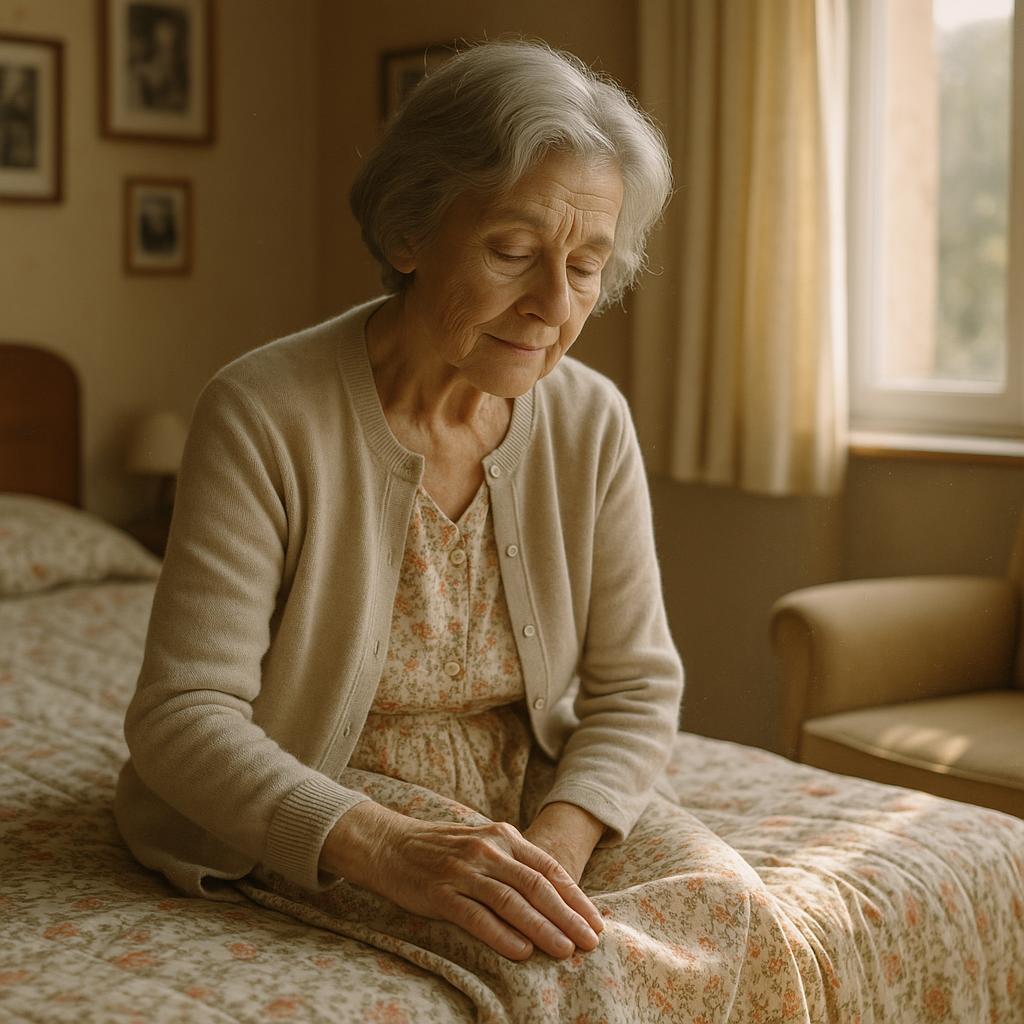 Image by RM AI
Image by RM AI
Learning to Care
I quickly learned that caring for Mrs. Larkin was like riding an emotional rollercoaster without a seatbelt. Some mornings, I'd wake to find her in the kitchen, humming contentedly while attempting to make coffee (though I'd often find the sugar canister filled with salt). Other mornings, she'd look at me with genuine terror, demanding to know who I was and why I was in Harold's house. 'You're not supposed to be here!' she'd cry, clutching her robe around her thin frame. Those moments broke my heart every time. Marjorie, the home health aide, taught me little tricks—keeping a photo album nearby to redirect her attention, playing Ella Fitzgerald when agitation set in, never arguing with her reality. 'You don't win by being right,' Marjorie explained with the wisdom of someone who'd done this many times before. 'You win by keeping her calm.' On good days, Mrs. Larkin was a delight. She'd sit in the garden, pointing out flowers I couldn't name and telling me stories about each one. 'These peonies,' she'd say, her eyes clear and bright, 'Harold planted them the day we found out I was expecting Nancy.' She taught me to make her famous apple cake, though she'd sometimes forget halfway through and I'd have to gently guide her back to the recipe. I started keeping a journal of her lucid moments, writing down every story, every recipe, every bit of garden wisdom—not just for Nancy, but for myself. Because somewhere between the confusion and clarity, between the frustration and the unexpected moments of joy, I realized I was no longer just caring for Mrs. Larkin—I was learning to care about her. And that made all the difference when, one particularly clear afternoon, she took my hand and said, 'I need to show you something important about this house, something only Harold and I knew.'
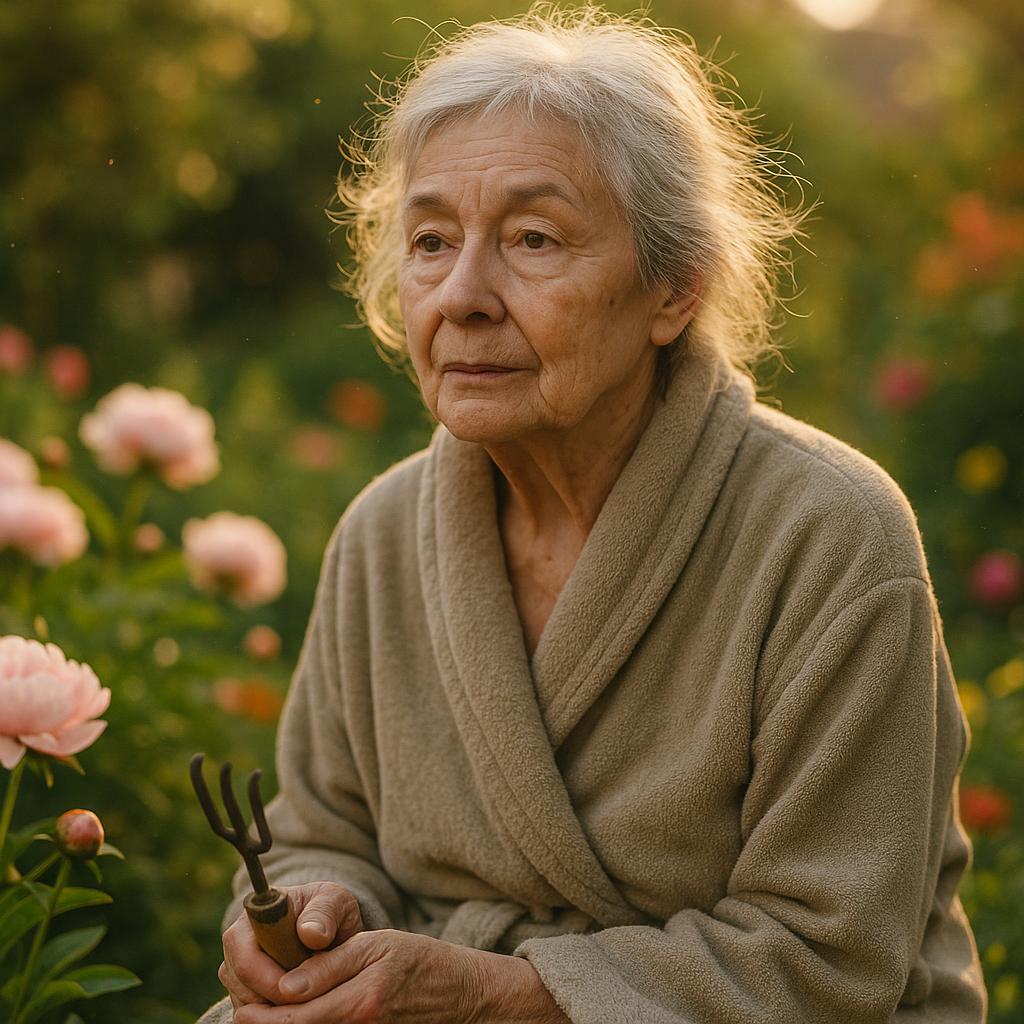 Image by RM AI
Image by RM AI
The Daughter's Visit
My daughter Lisa arrived on a Tuesday afternoon, her face a mixture of concern and confusion as she watched me help Mrs. Larkin water the tulips. I could tell from her tight smile that this wasn't just a casual visit. After dinner, when Edith was settled in front of the TV watching her favorite game show, Lisa cornered me in the kitchen. 'Mom,' she whispered, loading dishes into the dishwasher with more force than necessary, 'what exactly are you doing? Taking in a woman with dementia? This isn't your responsibility.' I sighed, watching the way her forehead creased just like George's used to when he was worried. 'Honey, I know this seems... unconventional.' Lisa snorted. 'That's putting it mildly. What about all those plans you and Dad made? The Alaska cruise? The Grand Canyon?' Her words stung because they were true. George and I had spent decades planning our retirement adventures—all those maps spread across our dining table, brochures dog-eared and highlighted. Dreams now impossible. I glanced through the doorway at Mrs. Larkin, who was clapping delightedly at something on the television, and felt a warmth spread through my chest. 'This is my life now,' I told Lisa, surprised by the certainty in my voice. 'And it's not a bad one.' Lisa studied my face for a long moment, then shook her head. 'I just don't want you getting hurt when...' She didn't finish the sentence, but we both knew what she meant: when Edith eventually forgot me too. What I couldn't explain to my practical, sensible daughter was how finding that mysterious message under the third step had changed everything.
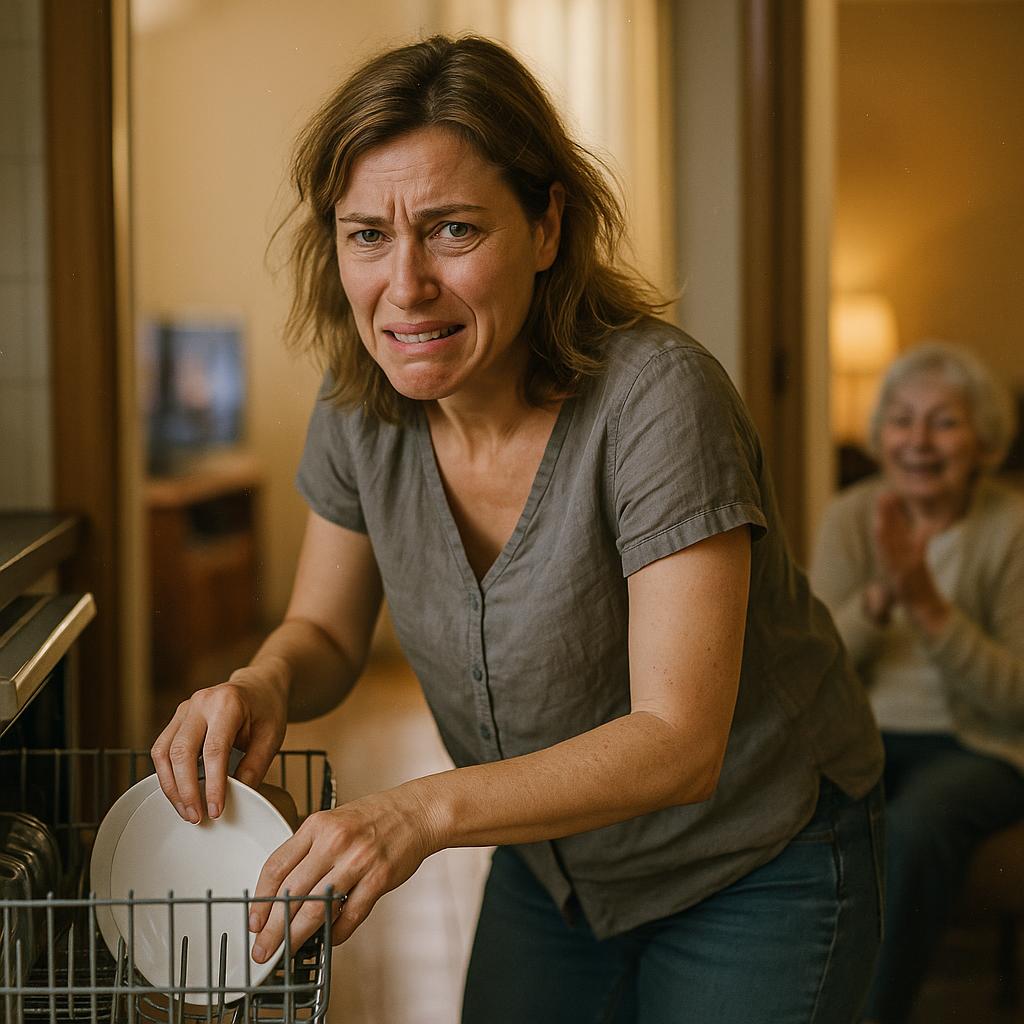 Image by RM AI
Image by RM AI
The Birthday Party
I never imagined I'd be hosting a birthday party at sixty-four, especially not for someone who once tried to break into my house. Yet there we were, celebrating Mrs. Larkin's 79th in the garden she'd created decades before. Nancy had outdone herself with decorations—stringing fairy lights through the oak tree and placing photos of Edith throughout the years on every table. Carl arrived early, proudly carrying his famous lemon cake with '79 Years Young' written in wobbly blue frosting. 'Harold always said my handwriting looked like a drunk spider,' he joked, making Edith laugh that musical laugh I'd grown to cherish. What touched me most was seeing the nurses from the care home arrive with handmade cards. 'We miss her,' one confided, watching Mrs. Larkin hold court from her garden chair. 'But she belongs here.' Throughout the afternoon, Edith drifted in and out of clarity—sometimes calling her great-grandchildren by her children's names, sometimes perfectly present as they played tag across the lawn. 'My babies played right there,' she whispered to me, squeezing my hand. 'Right where those little ones are now.' When it came time for cake, Nancy's youngest grandson helped Edith blow out the candles. 'Make a wish, Great-Grandma!' he shouted. She closed her eyes, her face serene in the golden afternoon light. Later, as guests began to leave, she motioned me closer. 'I wished for you to find what's under the third step,' she said with surprising clarity. 'It's time you knew.'
 Image by RM AI
Image by RM AI
The Fall
I woke to a sound that will haunt me forever—a sickening thud followed by a weak cry. My heart knew before my mind did as I scrambled out of bed and rushed to the hallway bathroom. There was Mrs. Larkin, crumpled on the tile floor like a discarded tissue, her nightgown twisted around her frail legs. 'I didn't want to bother you,' she whispered, her face contorted with pain. I called 911 with shaking hands, then Carl, who arrived before the ambulance in his pajamas and old firefighter jacket. The paramedics were kind but clinical, their practiced movements making me feel helplessly amateur. At the hospital, the fluorescent lights seemed to age Mrs. Larkin another decade as the doctor delivered his verdict: severe bruising, no breaks, but a clear sign. 'She needs more professional care than a home setting can provide,' he said gently, as if softening a blow we all saw coming. Nancy and I sat side by side in those uncomfortable waiting room chairs, both staring at the coffee machine across the room without actually seeing it. 'We tried,' she finally said, her hand finding mine. 'We really did.' I nodded, unable to speak past the lump in my throat. What hurt most wasn't just that our arrangement was ending—it was knowing that Mrs. Larkin would likely never return to the house that remembered her, never show me what was hidden beneath that third step she'd mentioned so many times.
 Image by RM AI
Image by RM AI
The New Arrangement
After the fall, I knew we needed a better solution than my amateur caregiving. Nancy and I found Willow Creek, a smaller memory care facility just ten minutes from my house. It cost more than the previous place—a LOT more—but we agreed to split the expenses. 'Mom would want us to use some of Dad's savings for this,' Nancy said as we signed the paperwork. Mrs. Larkin's room was bright and airy with windows overlooking a courtyard garden. I helped her arrange her few belongings—the wedding photo, Harold's records, her embroidered pillows. 'It's not home,' she whispered that first day, clutching my hand. 'But it's nice.' I visited every other day without fail, bringing fresh cuttings from her garden and playing Harold's records on a portable player I'd bought. The staff quickly learned her routines—how she liked her tea with honey but never sugar, how Ella Fitzgerald calmed her during sundowning episodes. On good days, we'd sit in the courtyard, and I'd tell her about Carl's latest home improvement project or how her rosebush was thriving. On bad days, when she called me by her sister's name or didn't recognize me at all, I'd simply hold her hand and listen to her stories about Harold, even when I'd heard them a dozen times before. What kept me coming back wasn't obligation—it was knowing that somewhere in her clouded mind, the mystery of the third step remained. And sometimes, in her clearest moments, she'd lean close and whisper, 'We need to go home soon. There's something I must show you before it's too late.'
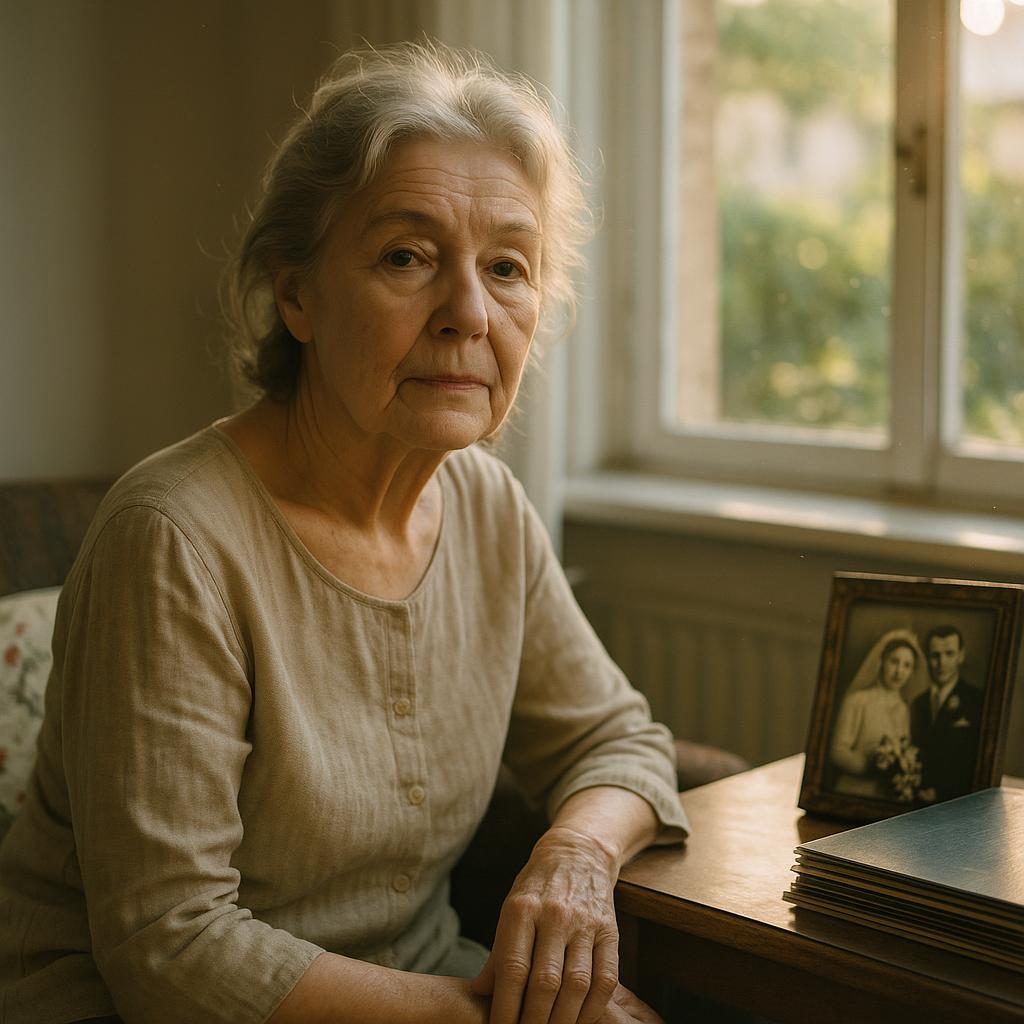 Image by RM AI
Image by RM AI
The Memory Box
I spent an entire Saturday creating a memory box for Mrs. Larkin's room at Willow Creek. It wasn't just a box—it was her life, carefully curated and preserved. I lined a vintage hatbox with Harold's old handkerchief, then filled it with treasures: their wedding photo where she looked like a 1950s movie star, pressed flowers from the rosebush he'd planted for their 25th anniversary, and a small glass vial of soil from 'her' garden. 'The earth remembers,' she'd once told me during a lucid moment. 'Even when we forget.' Nancy contributed too—adding her children's crayon drawings and a tiny recorder with her grandkids singing 'You Are My Sunshine,' Mrs. Larkin's favorite lullaby. The nurses said it was perfect for her confused days, when the past seemed to slip through her fingers like water. 'Physical objects anchor them,' the head nurse explained. 'When words fail, touch remains.' On my next visit, I found Mrs. Larkin sitting with the box open on her lap, running her fingers over Harold's letters, her eyes clear and bright. 'I remember everything today,' she whispered, clutching my hand. 'And I need to tell you something important—about what Harold and I hid under that third step all those years ago.'
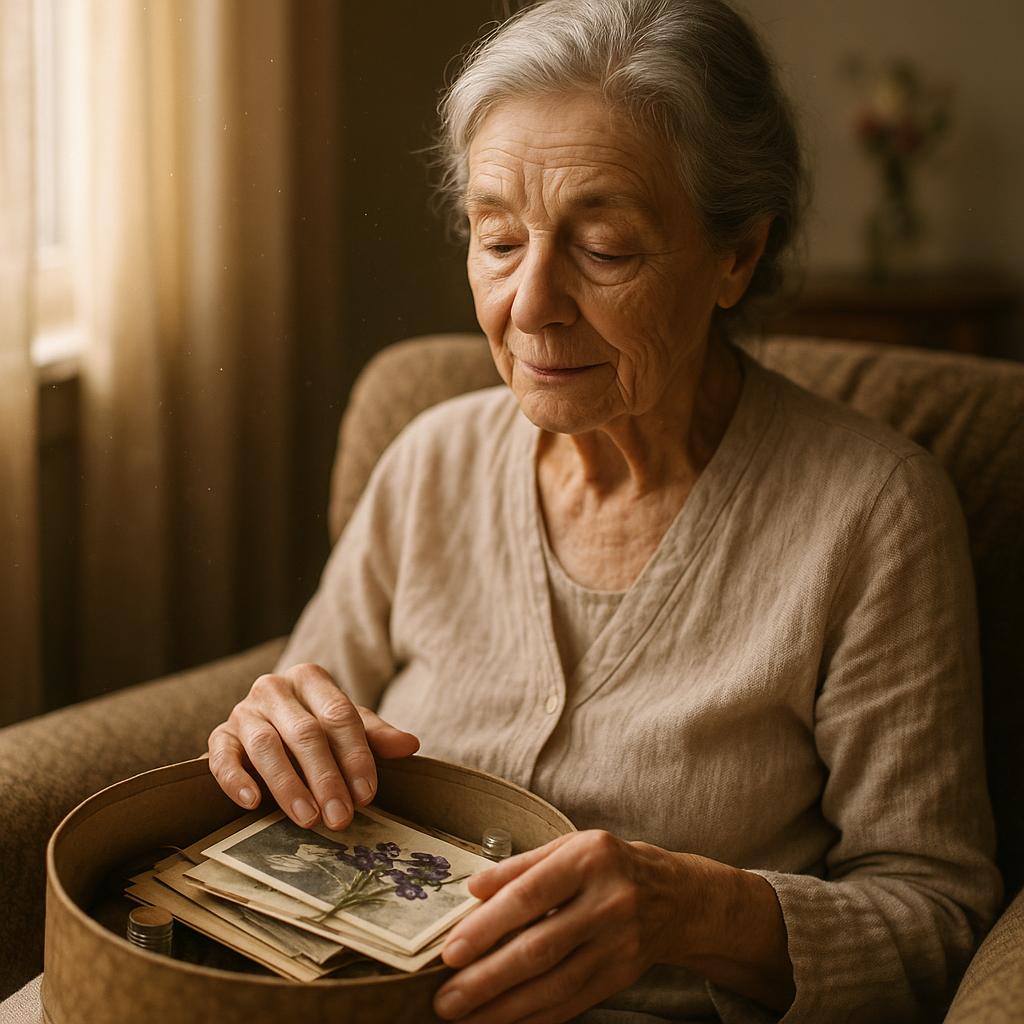 Image by RM AI
Image by RM AI
The Last Visit
Winter arrived with a vengeance that year, bringing with it the kind of bone-deep cold that seems to seep through walls. Mrs. Larkin's health declined just as rapidly as the temperature dropped. The nurses at Willow Creek called me one snowy afternoon, their voices gentle but urgent. 'She's been asking for you, Tanya.' I drove carefully through the slush, my windshield wipers fighting a losing battle against the heavy flakes. When I arrived, I found her sleeping, her chest rising and falling in shallow breaths, her skin nearly as white as the sheets. I sat beside her bed and took her hand—so thin now I could see every blue vein, like rivers on a delicate map. 'The tulips are going to be beautiful this spring,' I told her, rubbing her cold fingers between mine. 'I planted them just where you said, along the front path.' Her eyes fluttered open, recognition flickering like a candle flame in a draft. 'Harold loved tulips,' she whispered, her voice barely audible. 'Red ones. He said they had courage.' She squeezed my hand with surprising strength. 'Thank you for taking care of our house.' The way she said 'our house'—not 'my house'—made my throat tighten. I nodded, unable to speak. She drifted back to sleep, but just before her eyes closed completely, she murmured something that made my heart stop: 'The key to the box is taped under the third step. You'll need it soon.'
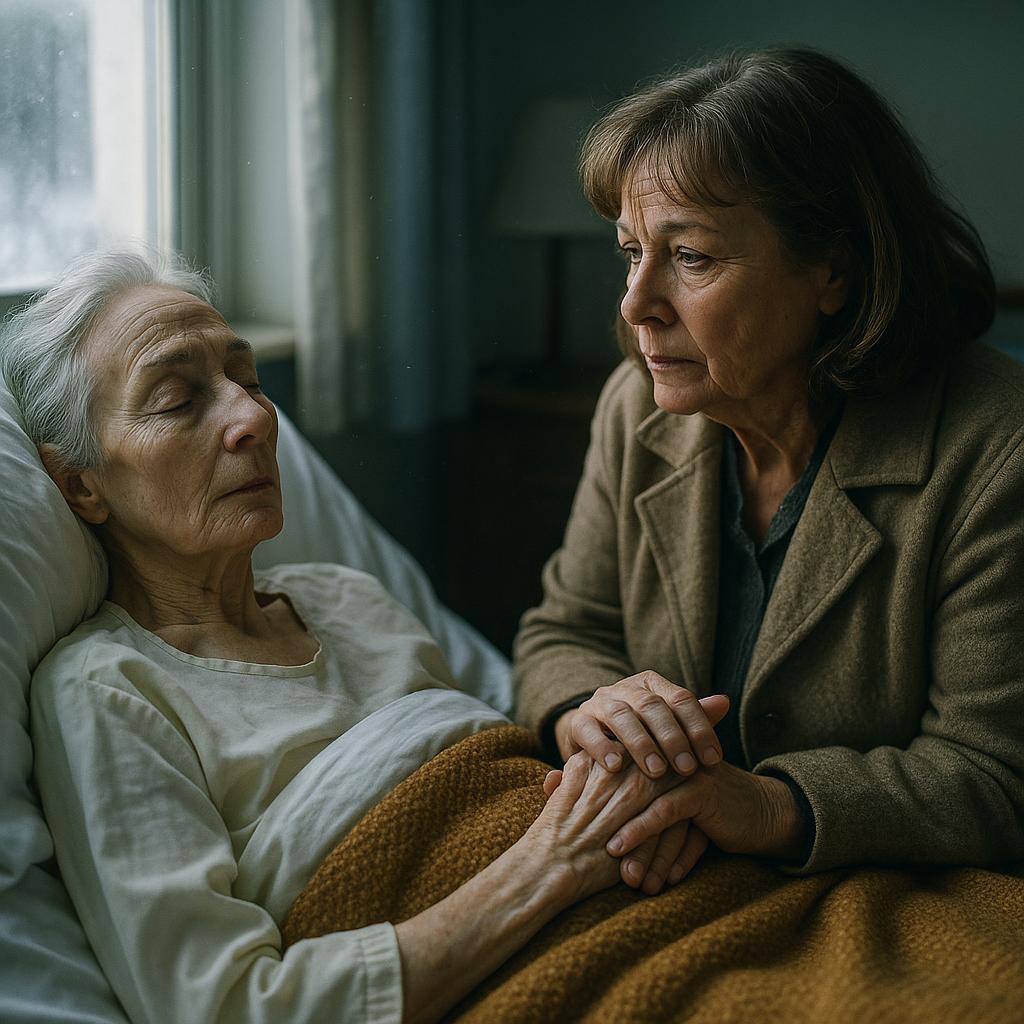 Image by RM AI
Image by RM AI
Saying Goodbye
Nancy called me at 5:17 AM. I remember checking the time, my heart already knowing why someone would call at such an hour. 'She's gone, Tanya,' Nancy whispered, her voice breaking. 'Mom passed peacefully in her sleep.' I sat on the edge of my bed, clutching the phone, watching the snow fall silently outside my window. It felt fitting somehow—this gentle blanket of white covering everything, making the world quiet and new. 'She's with Dad now,' Nancy added, and I could hear the bittersweet comfort in those words. I made tea I couldn't drink and watched the sunrise paint the snow-covered garden in shades of pink and gold. Mrs. Larkin—Edith—would have loved it. I thought about how the red tulips would push through the thawing ground in a few months, standing tall and brave just as Harold had described them. They would bloom whether she was here to see them or not. That afternoon, I sat alone in my kitchen, surrounded by the walls that had once been hers, and realized something profound: Edith Larkin had never really left this house. Even when her body had to go, her spirit had remained, guiding me here, bringing us together for reasons I was only beginning to understand. As I ran my fingers along the edge of the table, I remembered her final words about the key under the third step. Whatever was hidden there had been important enough for her to mention it repeatedly, even as her memories faded. Tomorrow, I decided, I would finally discover what secret this house had been keeping all these years.
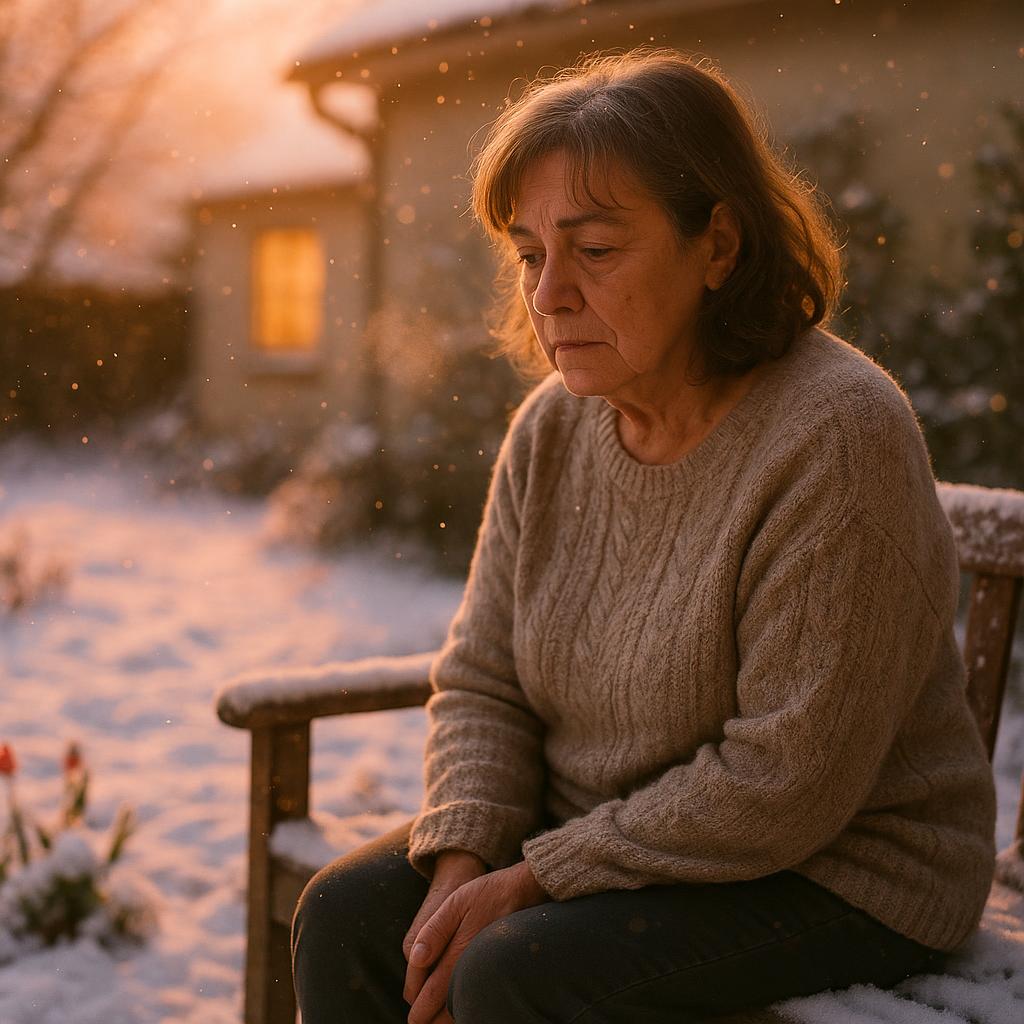 Image by RM AI
Image by RM AI
The Memorial
The memorial service for Edith was held at a small chapel near Willow Creek. Sunlight streamed through stained glass windows, casting colorful patterns across the modest gathering of family, caregivers, and me—the stranger who'd somehow become family. When Nancy asked me to speak, I nearly declined. What right did I have to eulogize someone I'd known for such a short time? But standing there, looking at the photo of Edith in her garden during happier days, the words came naturally. 'Edith Larkin never really left her home,' I said, my voice steadier than I expected. 'And in a way, she helped me make it mine.' I told them about our garden sessions, how she'd taught me the names of flowers I'd never noticed before. About the record player that still sat in my living room, playing Harold's jazz collection on Sunday mornings. About the embroidered towel—faded but beautiful—that hung in my kitchen, catching the morning light just so. 'Some people leave footprints,' I said, 'but Edith left fingerprints—on her garden, on her home, and on my heart.' Afterward, Nancy hugged me tightly, tears streaming down her face. 'You gave her back her dignity,' she whispered against my shoulder. 'Mom would have loved you.' As we parted, she pressed something into my palm—a small, tarnished key. 'I think this belongs to you now,' she said. 'Whatever's under that third step, Mom wanted you to find it.'
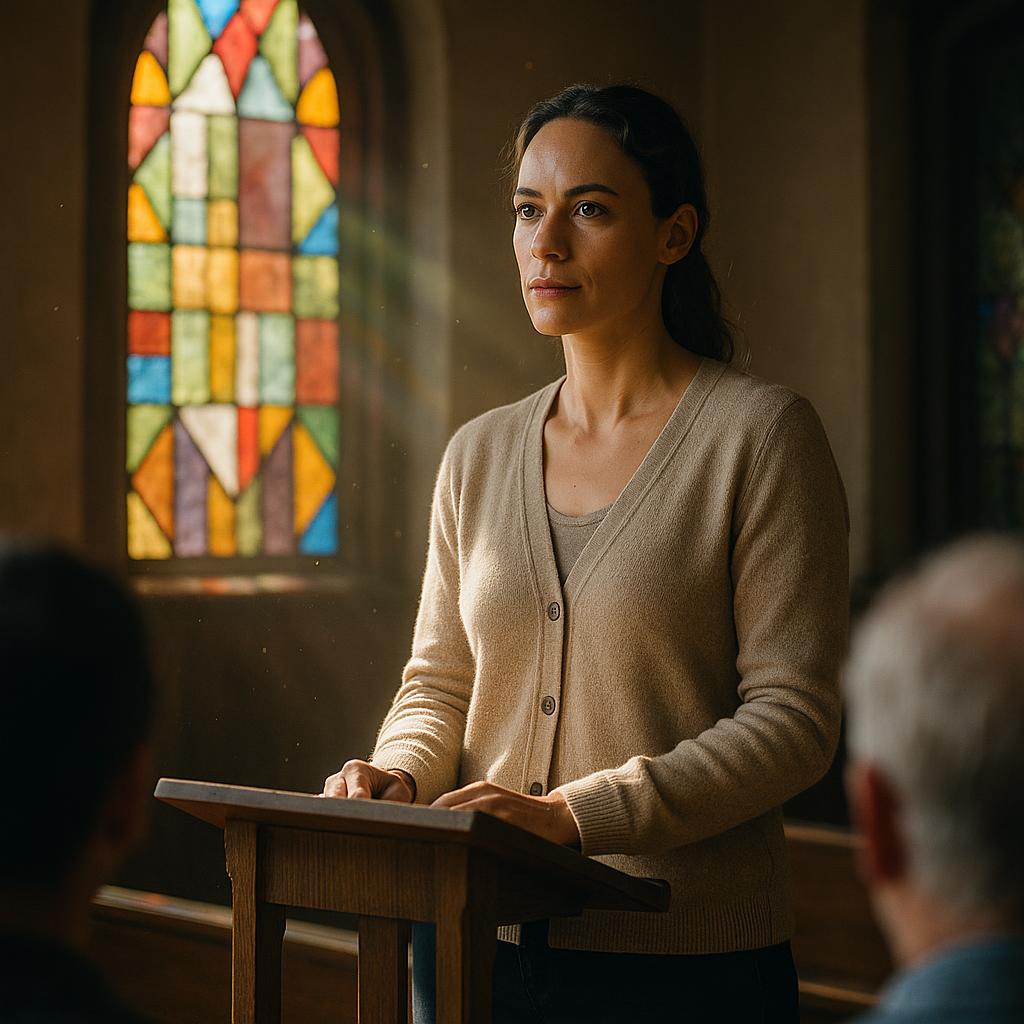 Image by RM AI
Image by RM AI
Spring Tulips
When April finally arrived, I watched with a mixture of joy and melancholy as the tulips pushed through the soil—just as Edith had promised they would. Red ones lined the walkway ("for courage," I'd whisper to myself), while clusters of yellow and purple circled the old oak tree where we'd celebrated her 79th birthday. I'd sit on the porch with my morning coffee, watching them sway in the spring breeze, feeling Edith's presence in every bloom. One particularly sunny Saturday, Nancy brought her children and grandchildren to see what they called "Grandma's flowers." Her youngest grandson, barely five, ran excitedly between the rows, careful not to step on any blooms. "Grandma's watching from heaven," he announced with the certainty only children possess. We all nodded, unable to argue with such perfect truth. Nancy and I gathered a bouquet to place on Edith's grave—the brightest red ones, of course. As we arranged them in a mason jar at the cemetery, Nancy squeezed my hand. "Mom would have loved this," she said softly. "You keeping her garden alive." Walking back into the house that evening, I no longer felt that strange unease that had greeted me when I first moved in. The house wasn't haunted—it was blessed by the overlapping lives it had sheltered. And as I stood in the hallway, the key to whatever lay beneath the third step heavy in my pocket, I finally felt ready to discover what Edith had been trying to tell me all along.
 Image by RM AI
Image by RM AI
The Letter
A week after the tulips bloomed in all their vibrant glory, Nancy stopped by with a small cream-colored envelope in her hand. Her eyes were red-rimmed but calm. 'We were going through Mom's things at Willow Creek,' she explained, perching on the edge of my sofa. 'The nurses had kept a box of her personal items.' She handed me the envelope with my name written across it in shaky, uncertain letters. 'It's addressed to you, Tanya.' My heart did a little flip as I carefully opened it, trying not to tear the delicate paper. Inside was a single page, the handwriting wobbly but determined: 'Dear Tanya, Thank you for finding Harold's records and bringing music back to our house. When I'm gone, please dance in the kitchen for both of us. With gratitude, Edith.' I pressed the letter to my chest, unable to speak. That night, after Nancy left, I pulled out Harold's old Ella Fitzgerald record—the one Edith said they'd danced to on their 40th anniversary. As 'Cheek to Cheek' filled the kitchen, I closed my eyes and began to sway, tears streaming freely down my face. I imagined Edith and Harold in this very spot, younger and full of life, holding each other close. 'I'm dancing for you both,' I whispered to the empty room that somehow didn't feel empty at all. As the song ended, I noticed something peculiar—the third step on the staircase seemed to be catching the moonlight in an unusual way, almost as if it were trying to tell me something.
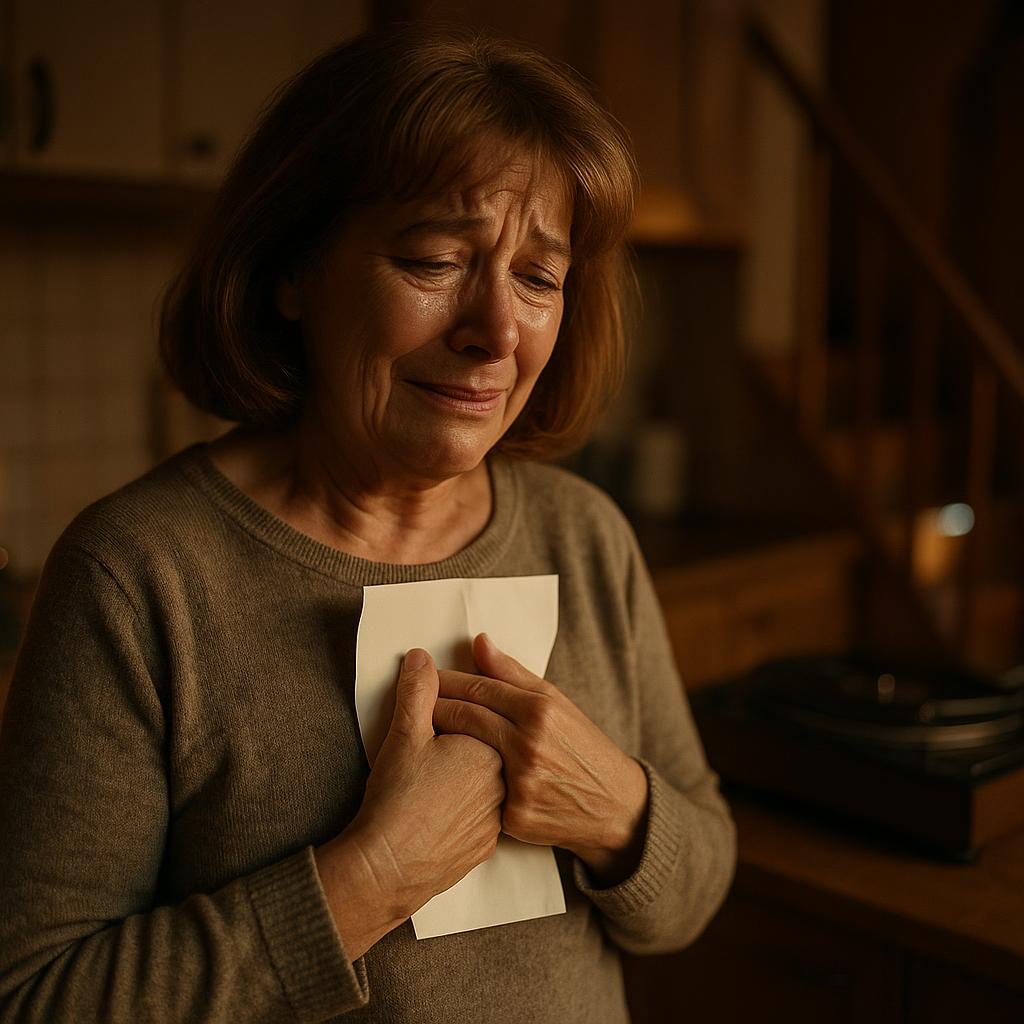 Image by RM AI
Image by RM AI
The House of Memories
A year has passed since I first walked through this door, keys in hand, heart heavy with George's absence. It's funny how a house becomes a home—not just through the furniture you place or the pictures you hang, but through the stories that seep into its walls. This place is undeniably mine now. My coffee mug has found its perfect spot on the kitchen counter. My reading chair sits angled just right to catch the afternoon sun. But it's also still Edith and Harold's in the most beautiful way. Their memories haven't faded; they've simply made room for mine, like old friends scooting over on a bench. Some nights, when the wind whistles through that one stubborn crack in the living room window, I swear I can hear Edith humming along to Harold's jazz records. The third step—the one that revealed their precious time capsule—still creaks in a way that makes me smile rather than startle. I no longer sleep with George's golf club beside the bed. Instead, I've hung one of Edith's embroidered pieces where I can see it first thing each morning. Carl still comes by for coffee every Tuesday, and we often reminisce about both our spouses and the Larkins, weaving four lives together in this space that has sheltered us all. Sometimes, when my grandkids visit, they ask if the house is haunted. 'Not haunted,' I tell them, 'just well-loved.' And isn't that what we all hope for in the end? Not to be forgotten, but to be remembered in the spaces we once called home. Last night, as I was drifting off to sleep, I could have sworn I heard Edith whisper, 'There's one more secret this house is keeping, Tanya. You just haven't found it yet.'
 Image by RM AI
Image by RM AI
KEEP ON READING
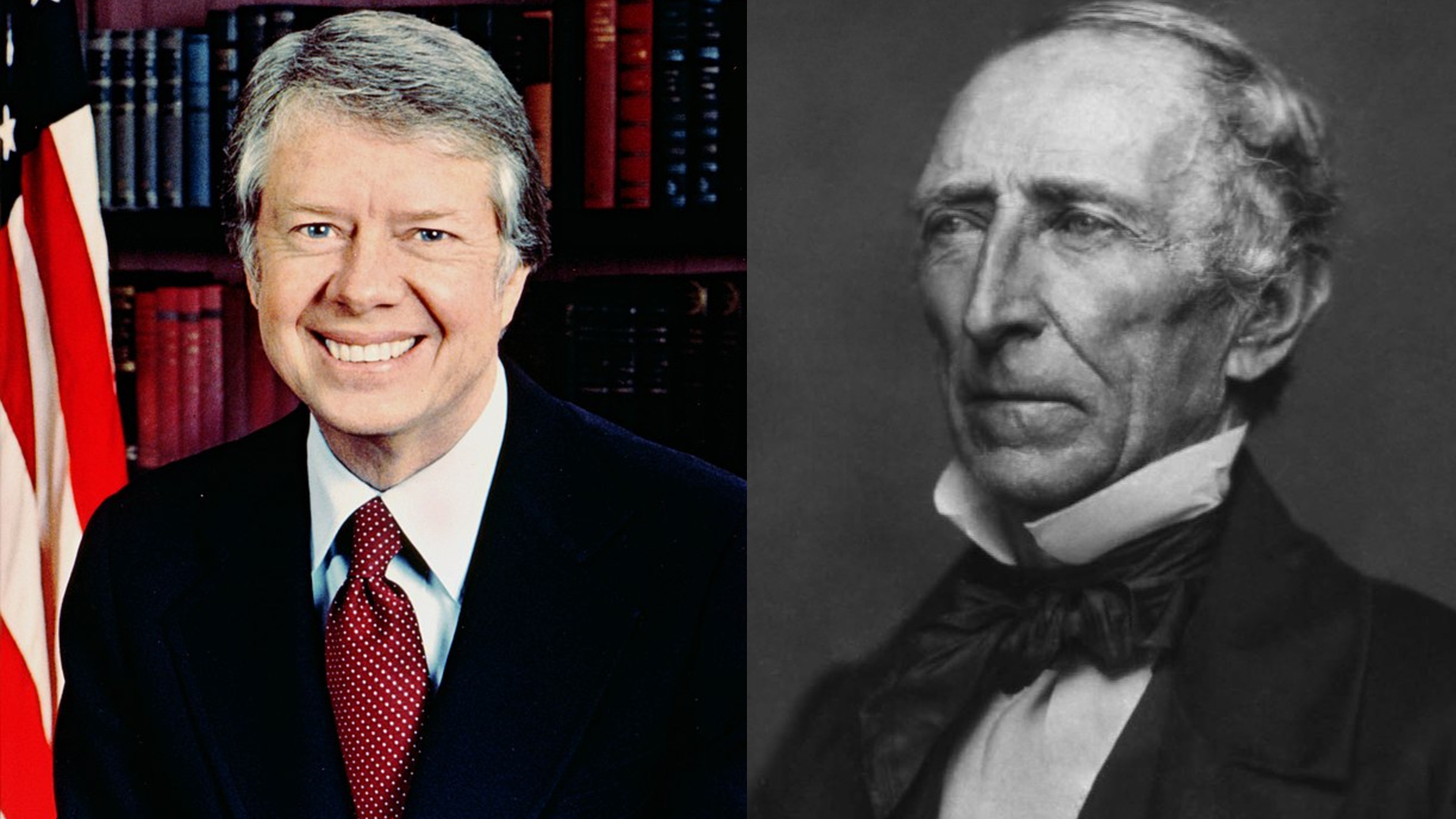
1 Weird Fact About Every President
Washington, Lincoln, FDR. Most people know something about the lives…
By Robbie Woods Dec 3, 2024
10 Actors Who Perfectly Played a Historical Figure & 10…
Which Performance is Your Favorite?. Playing the role of a…
By Rob Shapiro Sep 15, 2025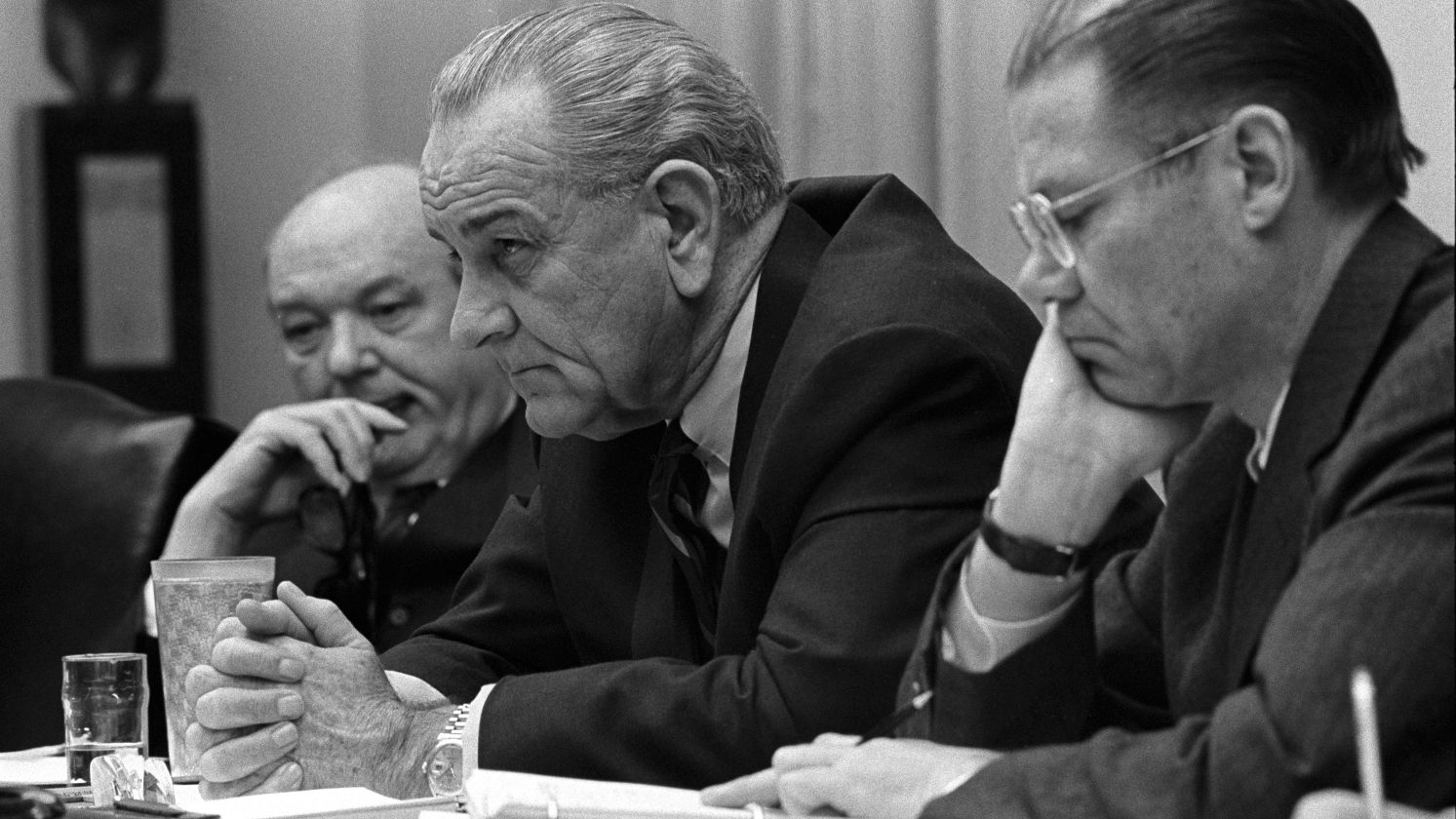
10 Actors Who Weren't Up To Playing A U.S. President…
Who Wouldn't Vote Woody Harrelson for President?. Actors who sign…
By Rob Shapiro Oct 22, 2025
10 Amazing Popes & 10 Who Weren't So Great
An Odd Cast of Characters Throughout History. From popes who…
By Henry Judd Apr 29, 2025
10 Ancient Civilizations You Don’t Want to Be Trapped In…
Grab Your Time Machine. Trying to pick out an ancient…
By Farva Ivkovic Feb 21, 2025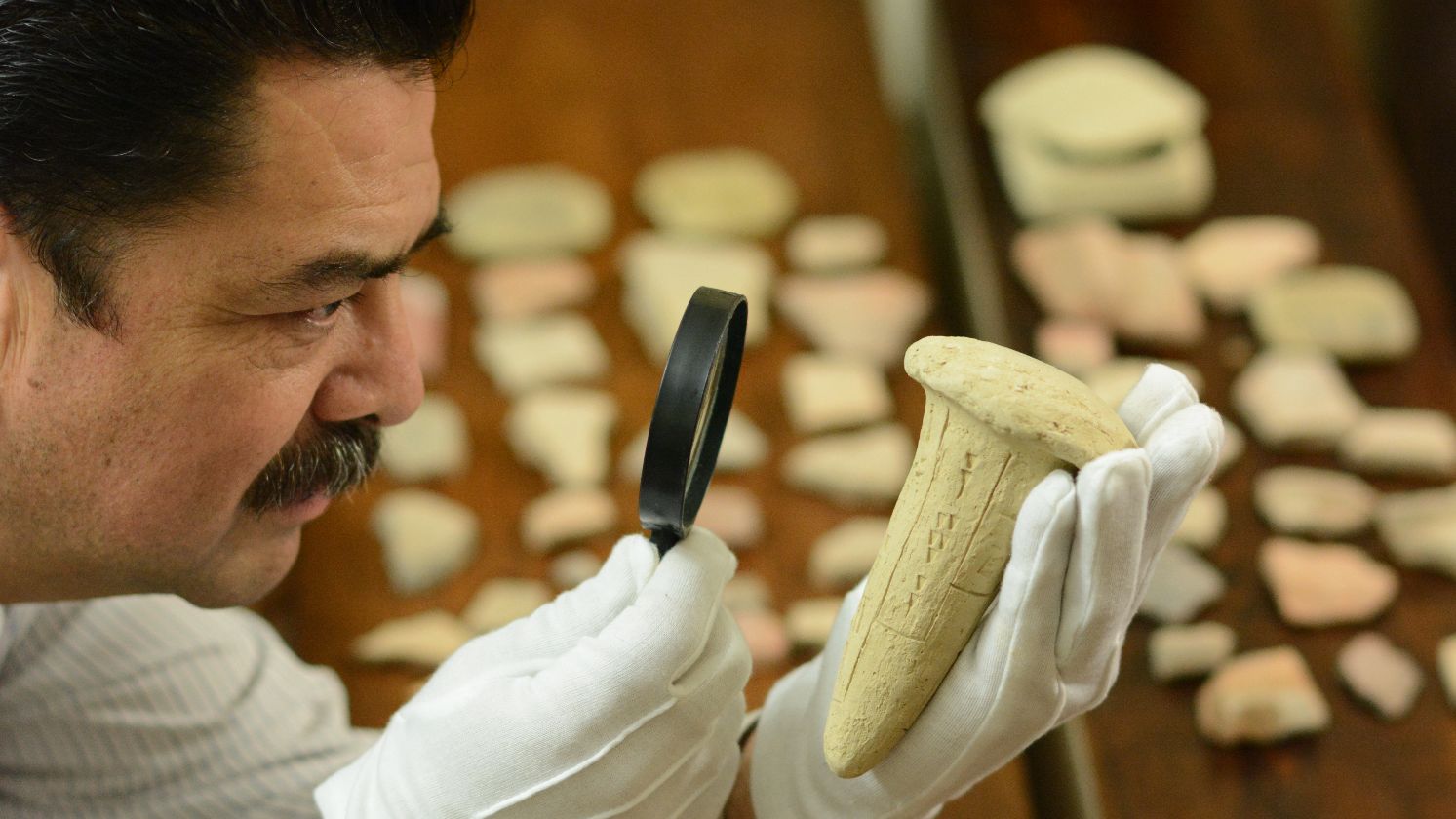
10 Ancient Lost Cities Yet To Be Found & 10…
Will You Find The Next Lost City?. Based on our…
By Breanna Schnurr Aug 27, 2025
